You are using an outdated browser. Please upgrade your browser or activate Google Chrome Frame to improve your experience.

108 French Travel Phrases for a Smooth Trip to France
Having essential French travel phrases on hand can totally transform your trip.
If you meet people, get lost or just need to ask a local some questions , these expressions and sayings will help you out in most tourist scenarios and make your time in France truly memorable!
In this post, I’ll introduce you to 108 basic French phrases for travelers, as well as tips and cultural context so they’re easier to memorize ahead of time.
Oui ! Non ! Common French Words and Phrases
Basic french phrases to introduce yourself, questions you’ll ask while traveling in france, french for travelers to get around town, what was that clarifying french phrases, basic french phrases for shopping, phrases for dining out in french, going hard(ish) in the club, how to prepare for traveling to france, and one more thing....
Download: This blog post is available as a convenient and portable PDF that you can take anywhere. Click here to get a copy. (Download)

Let’s start with the absolute basics.
Bonjour (Hello) Add a monsieur (sir) or madame (ma’am) to be polite.
Salut ! (Hi/Hey!) This is a more casual version of “hello.” You’ll hear the young folks throwing this one around.
Au revoir (Goodbye)
À plus / À plus tard ! (See you/See you later!)
À la prochaine ! (See you next time!)
Bisous / Bises ! (Kisses!) This is a casual way to say goodbye.
Bonsoir (Good evening)
Bonne journée ! ([Have a] good day!)
Bonne soirée ! ([Have a] good evening!)
Vous me manquez déjà ! (I miss you already!)
Pardon (Excuse me)
Merci (Thank you)
S’il vous plaît (Please)
Excusez-moi monsieur / madame (Excuse me sir/ma’am)
Parlez-vous anglais ? (Do you speak English?)
Comment dit-on … en français ? (How do you say … in French?)

These phrases will help you out when meeting locals and trying to make French-speaking friends.
Je m’appelle… (My name is…)
Moi, c’est… (Me, I’m…) This is a more casual way of introducing yourself.
Comment vous appelez-vous ? (What is your name?)
Tu t’appelles comment ? (What’s your name?) Use this one for when you want to keep things casual, with the tu form .
Comment allez-vous ? (How are you?)
Ça va ? En forme ? (How are you? You good?)
Nous sommes arrivés / arrivées… (We arrived…) Use this phrase to let someone know when you got into town.
Nous restons… (We’re staying…) Use this phrase to explain to your new friends where you’re staying, as well as how long you’re staying.
Je vous présente… (lit. “I present you…”) This is another way of saying “This is [my]…” when you want to introduce two people to each other.
Enchanté/Enchantée. (Pleased to meet you.)
Je suis ravi / ravie de faire votre connaissance. (I am glad/delighted to meet you.) You’ll raise some impressed eyebrows if you bust out this fancy French “nice to meet ya.”
Je parle un peu français. (I speak a little French.)
If you’re learning French, chances are you’ll want to practice your language skills when you go out there. However, it can be intimidating approaching a native—letting them know that you’re not fluent will really put your mind to rest!
Saying je parle un peu français will enable you to continue practicing your speaking skills, while at the same time alleviating any pressure you might feel to talk fluently . Use this phrase when you’re first starting a conversation, or want to continue talking to someone in French.
J’apprends le français depuis… (I’ve been learning French for…)
People are sure to notice your French accent and they’ll probably want to know how long you’ve been learning the language of love.
Je suis là pour les vacances / le travail. (I’m here for vacation/work.)
After you’ve made your initial introductions, it’s likely that a person with whom you’re speaking will ask about the time you’re spending in France. While many people travel to the country for vacation, this isn’t always the case, so informing the other person of your reasons for traveling can help fuel the conversation you have.
It’s likely that the other person will want to expand on the topic, so having a few words ready about your future itinerary or your job wouldn’t go amiss.
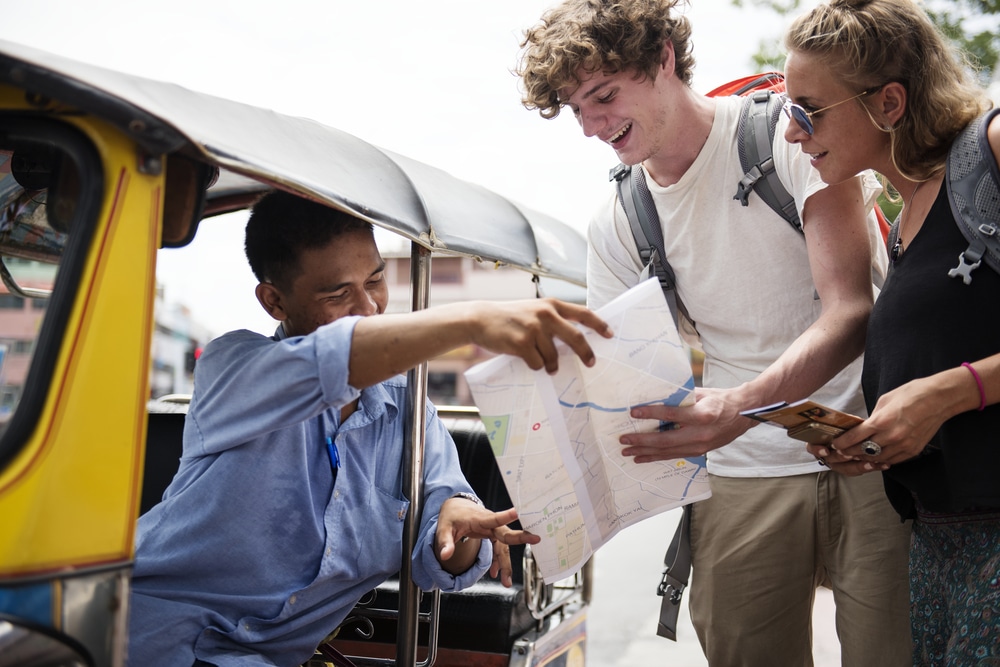
Où est… ? (Where is…?)
This is a phrase that you’ll need to use a lot in France, and it pays to memorize the names of a few places so you can get by if you’re stuck.
Here are some French phrases for travelers to build off of “où est.”
Où est…
l’hôtel ? (the hotel?)
la banque ? (the bank?)
l’aéroport ? (the airport?)
le guichet ? (the ticket window?)
la plage ? (the beach?)
Quel temps va-t-il faire aujourd’hui ? (What will the weather be like today?)
Don’t forget that much of the time, the weather in France is described using the verb faire .
Learning some French vocabulary for weather is a great idea before you venture out—being able to understand what sun and rain are in French will help you to listen out for all the right words.
Il fait beau aujourd’hui (It’s beautiful weather today)
Il pleut (It’s raining)
Il fait chaud (It’s hot)
Il fait froid (It’s cold)
Il fait soleil / Il y a du soleil (It’s sunny)
Il fait venteux / Il y a du vent (It’s windy)
Est-ce que vous pourriez prendre ma photo, s’il vous plaît ? (Could you take my photo, please?)
Everyone loves a souvenir, and it’s likely that you’ll take your camera along with you to capture precious memories. In touristy zones, natives are used to being asked to take photos, but if you’re going to do it, it’s especially nice to be able to inquire in French.
If there are a group of you, replace ma photo (my photo) with notre photo (our photo). And to be polite, start your request with excusez-moi monsieur/madame .
Addressing someone by the equivalent of “sir” or “madam” in French is generally expected, so if in doubt, err on the side of being over-polite—the person taking your photo is much more likely to accept your request!
Pouvez-vous m’appeler un taxi, s’il vous plaît ? (Can you call me a taxi, please ?)
Getting home in France when public transport has stopped running can be a real worry, and unless you’re right next to a taxi stand, it can be very difficult to find a cab. If you’re at a venue late, ask this question to one of the staff.
Staff are likely to have all the information about local transport and taxis and normally will be able to supply you with one in no time at all! As usual, address the person in the most polite way you can and thank them for their help.
Learning about other forms of transport will also help you to no end, especially when you’re searching for a way to get home.
Le bus (The bus)
Le train (The train)
Le bateau (The boat)
Le car (The coach)
La voiture (The car)
Pouvez-vous m’aider ? (Can you help me?)
In the unlikely scenario that you get into trouble when in France, it’s really important to have armed yourself with the right words to get out of a bind. Even just knowing this phrase is incredibly handy.
Of course, just because you need help doesn’t mean you’re in trouble—you might just need directions . The above phrase can be used in those scenarios, too, and is a great way to identify people who are able to speak French and who know their way around town.
Où est l’ambassade américaine ? (Where is the American Embassy?)
Again, travel French isn’t just about getting around, eating well and having fun. There are also French phrases to know in case of emergency.
If you run into trouble in France, one good address to have on hand is that of the American embassy . A stolen U.S. passport or ID card can be replaced at the embassy, and you might need their help if there is ever a political problem in France and you need to exit the country quickly.
That’s a rarity to be sure, but it’s better to be prepared while traveling!
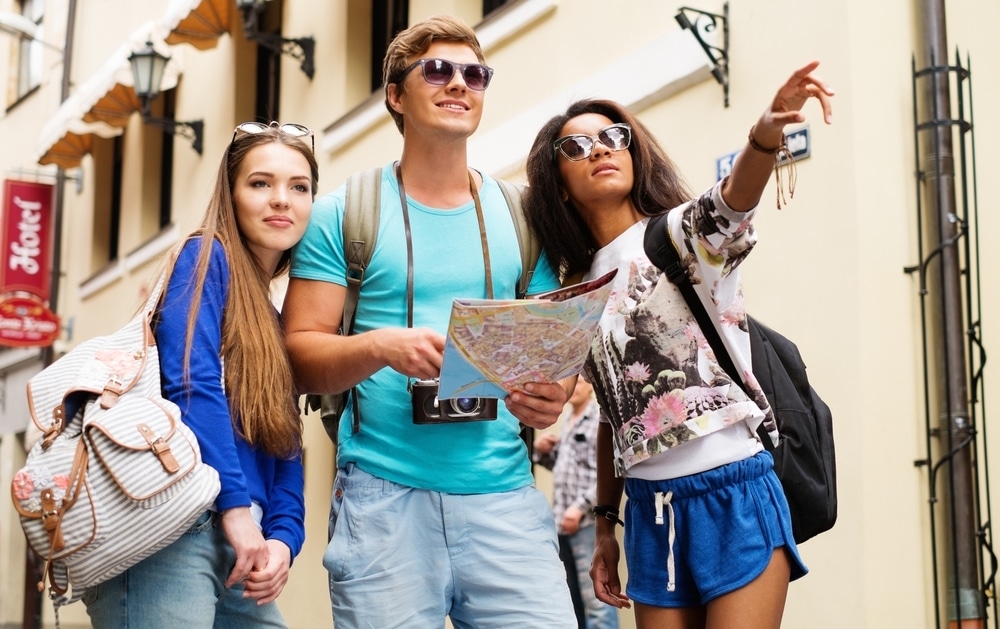
You’ll likely benefit from some further directional guidance while traveling around France. These phrases will come in handy.
Où est le métro ? (Where is the metro?)
Où sont les taxis ? (Where are the taxis?)
Où est la sortie ? (Where is the exit?)
C’est près d’ici ? (Is it close by?)
C’est loin ? (Is it far?)
Est-ce que ce bus passe par… (Does this bus pass by…)
Emmenez-moi à cette adresse, s’il vous plaît. (Take me to this address, please.)
Use this polite phrase with your taxi driver before you hand over that crumpled sticky note with François’ address on it.
Je vous dois combien ? (How much do I owe you?)
After your chauffeur de taxi (taxi driver) has so graciously driven you to François’ place, you’ll have to pay up.
Puis-je avoir un plan de la ville, s’il vous plaît ? (Can I have a map of the city, please?)
Use this phrase when you roll up to the office de tourisme (tourist office). You can also ask for a public transit map specifically:
Puis-je avoir un plan du métro, s’il vous plaît ? (Can I have a metro map, please?)
Je cherche… (I am looking for…)
Je cherche is another handy French travel phrase, especially if you’re traveling for the first time in a French city.
Unlike in English, where we say “I am looking for …” the French don’t use a preposition (“for”) after the verb, and simply follow this phrase with what they’re searching for.
Je cherche…
le bus (the bus)
un taxi (a taxi)
les toilettes (the toilets)
l’hôpital (the hospital)
Je ne comprends pas. (I don’t understand.)
A necessity if you’re trying to make conversation with a native, je ne comprends pas will serve you well if you ever get stuck.
Often, French people are so pleased to find a foreigner who’s able to speak their language that they’ll get a little carried away and enthusiastically try to start a complex conversation. While situations like these are incredible if you’re a learner, they can also be very intimidating.
Don’t worry if you don’t understand. Simply excuse yourself, say that you don’t understand and if you would like to continue the conversation, try the following French phrase:
Pouvez-vous répéter, s’il vous plaît ? (Could you repeat that, please?)
Parlez plus lentement, s’il vous plaît. (Speak a little slower, please.)
For French learners, the coveted native speed of speaking can seem unattainable, and while you can learn to understand it over time, it does take a little adjusting to. If you’re speaking to a local and would like them to speak a little more slowly, it’s better to just ask them, rather than suffering in silence.
Saying parlez plus lentement, s’il vous plaît will let your speaking partner realize they might be going a little too fast for you, but that you would still like to continue.
If you’d like them to go back over something they’ve been talking about, you can again ask them to repeat themselves to have them re-cover a topic that might have gone over your head.
Don’t worry about seeming rude—French people are often willing to help learners with their language skills, and will likely have no problem adjusting their speed.

If you’re traveling in France, you’ll probably be doing some shopping while you’re there!
Je suis à la recherche d’un… (I’m looking for a…) A great line for engaging the chipper shop girl, practicing your French and finding gifts for the folks back home.
Non, je regarde pour l’instant. (No, I’m [just] looking for the moment.)
C’est pour… (It’s for…)
Combien ça coûte ? (How much does this cost?)
Puis-je commander cela sur l’Internet ? (Can I order this on the internet?)
Je voudrais payer en liquide / espèces. (I would like to pay in cash.)
Est-ce que vous acceptez les cartes étrangères ? (Do you accept foreign cards?)
Be aware that paying for items when abroad may not work the same way as at home.
If you’re in a smaller town in France especially, it’s always worth checking with hotels or shop owners if they accept foreign modes of transaction. Asking est-ce que vous acceptez les cartes étrangères ? will ensure that you don’t find yourself in any sticky payment situations down the line.
If you’re from North America, asking acceptez-vous les cartes sans puce ? (do you accept non-chip cards?) might be more to the point. Many North American cards don’t have chip-and-pin security, and some stores in France don’t have magnetic strip readers.
Generally, most tourist destinations will be equipped to deal with foreign credit cards, but if you’re ever not sure, it always pays to double check!
À quelle heure est-ce que cela ferme ? (What time does it close?)
Across France, especially in the summer months, it’s worth checking out closing times. To ask when a shop or attraction is closing, use this question.
On the other hand, to inquire when a place will be opening, ask à quelle heure est-ce que cela ouvre ? (what time does it open?). Both of these phrases are really essential when traveling, so make sure you learn them ahead of time!
And remember, French time works a little differently and is often given on a 24-hour cycle, so if someone responds with dix-sept heures (literally, “17 hours”), they mean 5 p.m.
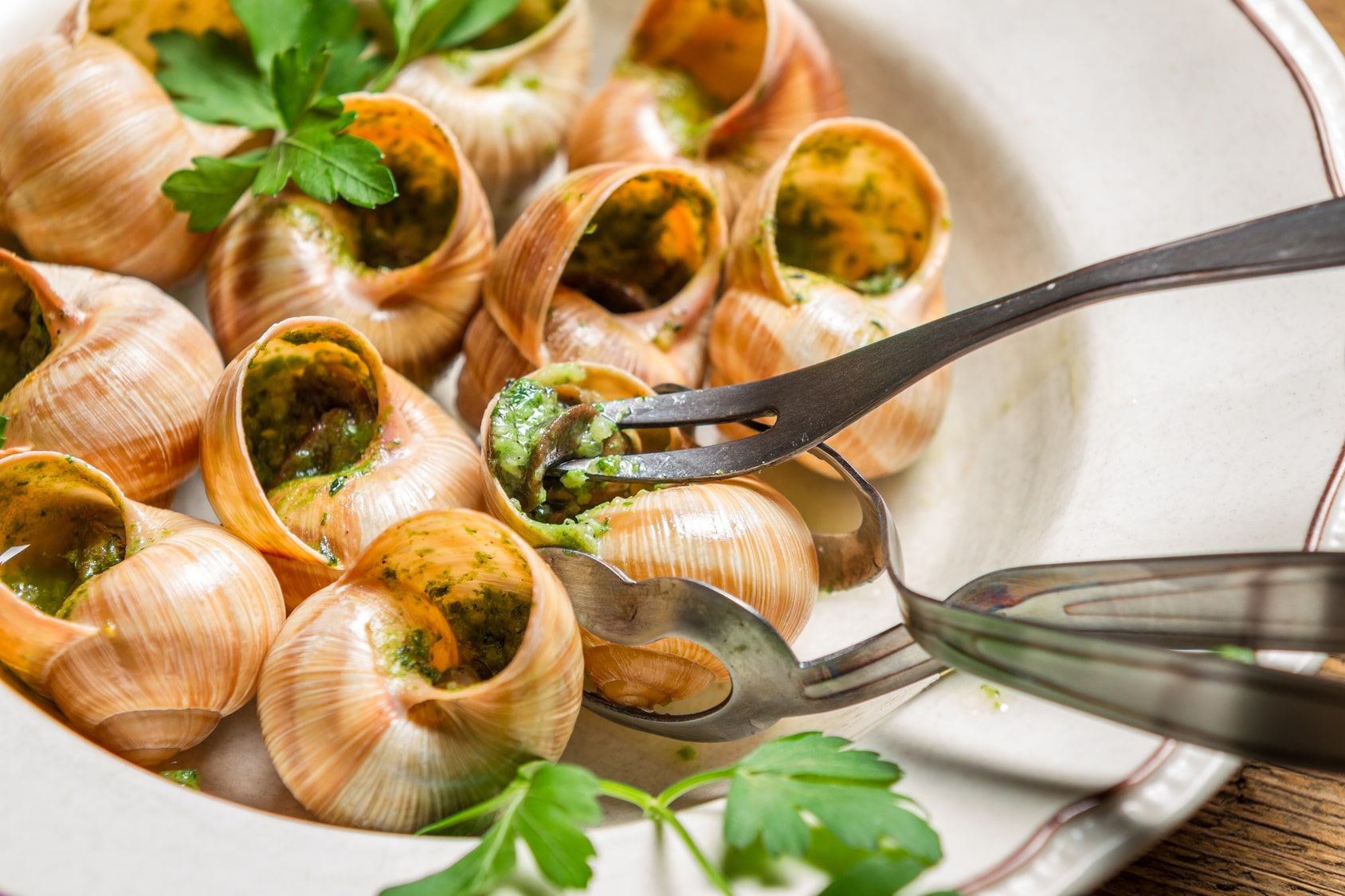
French cuisine is famous around the world, so what better place to try it than in its country of origin? These French phrases will help you make the most of dining in France.
Une table pour 4, s’il vous plaît. (A table for 4, please.
Le menu, s’il vous plaît. (The menu, please.)
La carte des vins, s’il vous plaît. (The wine menu, please.)
Est-ce que le service est compris ? (Is the tip included?)
C’est trop bon ! (This is so good!)
J’ai bien mangé. (I ate well/I’m full.)
Je suis répu / repue. (I’m satisfied/I’m full.) This one will really impress people. This is some real français soutenu (formal French) , and you’ll rarely hear a young French person say this.
On prend l’apéro ensemble ? (Let’s have an apéritif together?)
An apéritif is a beverage one drinks before eating—typically something alcoholic like whiskey, vodka or pastis , for example.
Je voudrais… (I would like…)
Je voudrais is likely to be a phrase that you’ll need to use very frequently—when ordering food , attending new places or just trying to buy something in a shop.
While most phrasebooks will contain the names of most foods and items that you would need to order, it’s worth remembering a few so that you don’t get stuck in a sticky situation! Here are a few you may want to commit to memory.
Je voudrais…
un café (a coffee)
une bière (a beer)
une baguette (a baguette)
de l’eau (some water)
l’addition (the bill)
À votre santé ! (To your health!)
Say this right before you clink glasses with your new French pals. Be sure to make eye contact while doing so .
You can also just say santé ! (health!). À la vôtre ! (to yours!) is also a good option when you’re with more than one person or having a tête-à-tête (one-on-one discussion) with a distinguished gentleperson.
À la tienne ! (to yours!) works for casual one-on-one scenarios. Tchin tchin ! (clink clink!) has the benefit of being pretty cute and onomatopoeic.
You’re sure to exude a certain je ne sais quoi (“I don’t know what”) as well as an ease with pronouns .

You’ve done the museums, the galleries, the restaurants, the cafés… time to party!
Ça te dit d’aller boire un verre ce soir ? (Want to go get a drink tonight?)
J’ai envie de faire la fête ! (I want to party!)
On s’installe là-bas ? (Let’s sit over there?)
Je voudrais une pinte de blonde / un verre de vin. (I would like a pint of light ale/glass of wine.)
On va prendre la bouteille. (We’ll take the bottle.)
On prend des shooters ! (We’re taking shots!)
Est-ce qu’il y a un after ? (Is there an after party?)
Je suis crevé / crevée, j’y vais. (I’m spent, I’m leaving.)
Rentrez-bien ! (Get home safely!) A good phrase to keep in your pocket when you’re leaving your party animal friends in the club.
Je me suis vraiment bien amusé / amusée. (I really enjoyed myself.) Did your new French pals take you on an exhilarating tour of the coins et recoins (nooks and crannies) of a charming neighborhood? Then let them know that you had fun!
Find a French phrasebook for travelers

Before you travel, you’re going to want to arm yourself with a few essentials, and at the top of your list should be a really great French phrasebook . Although I’ve just given you lots of helpful, common French travel phrases, it’s always good to be ready for any eventuality, and a phrasebook will act as a great backup.
One great phrasebooks for French learners are the “Collins French Phrasebook,” which contains a French dictionary for your convenience.

For more options, you’ll want to explore Lonely Planet to see what’s available. There are French phrasebooks for every corner of the French-speaking world, and some have additional features like accompanying audio files, travel guides or apps.
Research local customs
Wherever you go in France, you’ll find a whole host of things that make the area unique. Whether it’s local French cooking , events or linguistic differences, it pays to research the place you’re going and, if necessary, learn a few basic French phrases relating to whatever may be going on around you.

In Paris, for example, some museums and galleries are free to all on the first Sunday of the month—a deal worth taking full advantage of! If you want to check out the region to which you’re traveling, France.fr is a great place to do so.
And of course, your French phrasebooks or regional travel guides can offer you insight into customs, culture, etiquette and holidays.
Make a list of activities
Just getting to France may seem like a dream come true, but unless you have some idea of how you want to spend your time, it can pass you by in a haze.
Before you leave for your trip, try making a list of things you’d like to do. This way, you can adjust the phrases you learn accordingly and be ready to ask about certain exhibitions in the area or how to find a place to eat that serves a certain local dish you’d like to try.
Spontaneity is wonderful, but a little planning doesn’t hurt, either!
Use an immersion program
You can get used to hearing the French language before you leave your house with immersion programs. Using an immersion program at home is a good way to get used to the sounds and natural speed of the language. It’s also a way to hear turns of phrases , filler words and slang —basically, parts of the language that are rarely taught in textbooks. Learn these, and your French will sound much more natural.
Learn polite French terms of address
The French take manners very seriously, and if you’re meeting someone for the first time, or talking to a stranger, it’s important that you address them in the right way.
If you’re trying to attract the attention of someone who might be able to help you, say either “hello sir/madam” or “excuse me sir/madam” in French, as given above. Similarly, when you enter a shop, it’s always nice to greet the shopkeeper by saying hello or good morning, also as you learned above.

You can get a head start on polite conversation for practical, everyday matters with ed2go’s Beginning Conversational French course. This is a short online course that prepares you for communication in places like restaurants, hotels and other typical scenarios you may encounter on your travels.
There are also different terms of address in French, and depending on how well you know someone, you’ll have to address them in a certain way. For people you know, you can say tu (you) when talking to them. This can also be used for children and animals.
For strangers, figures of authority or your elders, you must use vous (you). This is a much more polite term of address, and expected when you haven’t gotten to know someone well yet.
If you’re struggling to know which one to use, always veer on the side of caution and use vous. The other person will tell you if they want you to say tu to them instead!
FluentU takes authentic videos—like music videos, movie trailers, news and inspiring talks—and turns them into personalized language learning lessons.
You can try FluentU for free for 2 weeks. Check out the website or download the iOS app or Android app.
P.S. Click here to take advantage of our current sale! (Expires at the end of this month.)

Try FluentU for FREE!
Traveling to France is a thrilling and eye-opening experience.
In order to get the most out of the trip, it’s a great idea for tourists and travelers to learn some basic French phrases and words ahead of time.
These French travel phrases will have your back throughout your trip!
FluentU has a wide variety of great content, like interviews, documentary excerpts and web series, as you can see here:

FluentU brings native French videos with reach. With interactive captions, you can tap on any word to see an image, definition and useful examples.

For example, if you tap on the word "crois," you'll see this:

Practice and reinforce all the vocabulary you've learned in a given video with learn mode. Swipe left or right to see more examples for the word you’re learning, and play the mini-games found in our dynamic flashcards, like "fill in the blank."

All throughout, FluentU tracks the vocabulary that you’re learning and uses this information to give you a totally personalized experience. It gives you extra practice with difficult words—and reminds you when it’s time to review what you’ve learned.
Start using the FluentU website on your computer or tablet or, better yet, download the FluentU app from the iTunes or Google Play store. Click here to take advantage of our current sale! (Expires at the end of this month.)
Enter your e-mail address to get your free PDF!
We hate SPAM and promise to keep your email address safe

Survival French: 120 Must-know Phrases for visitors to France
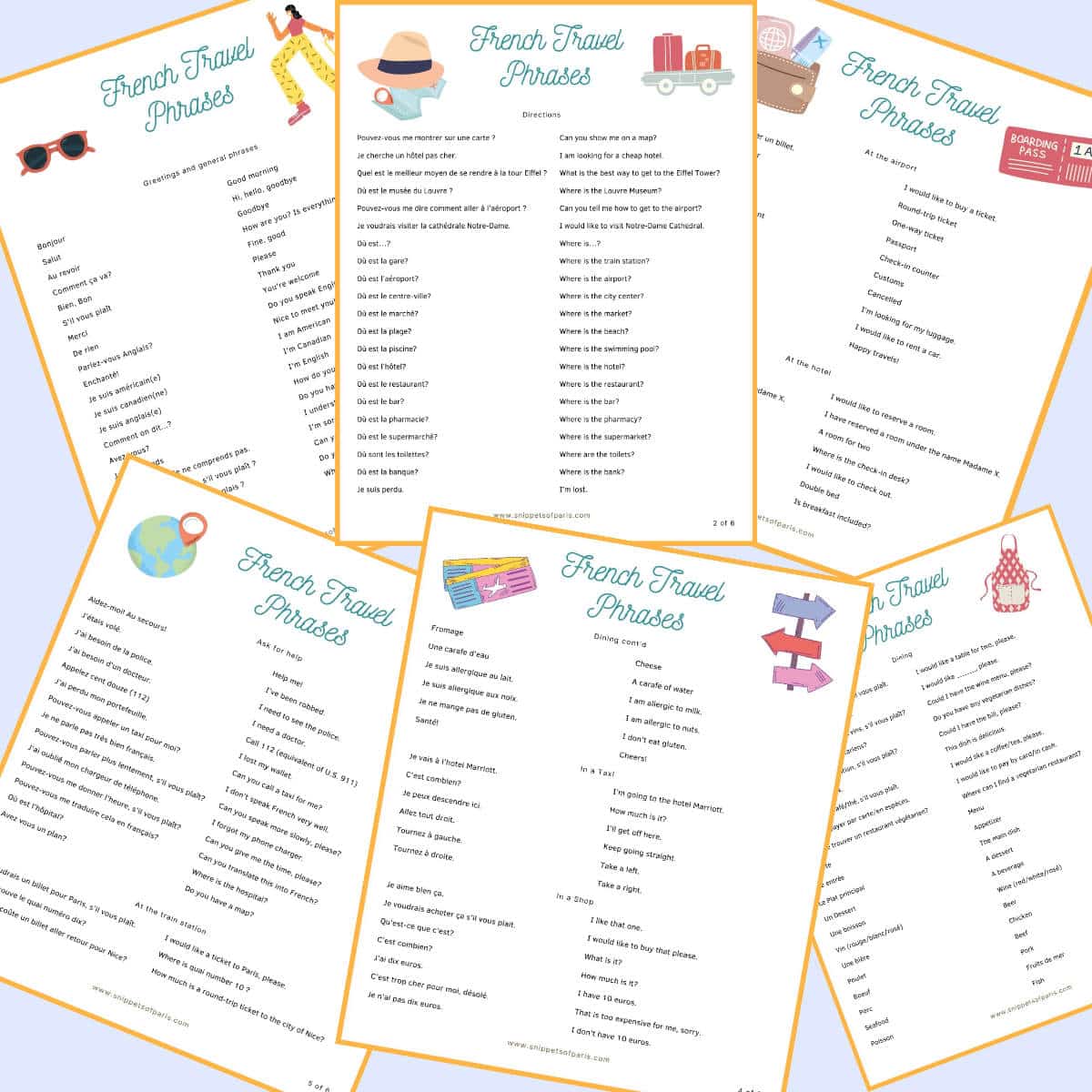
- Post category: French Language / Travel to France
- Post author: Nassie Angadi
If you are planning a trip in France, you may want to learn a few french travel phrases to make the most of your visit. Travel can be stressful, so there’s no better way to calm your nerves than by understanding the local language .
The French are notoriously shy about speaking English, so a few phrases in French is bound to put everyone at ease. In this article, I will cover some useful phrases in various instances, from asking directions, ordering at a restaurant, going somewhere in a taxi, etc.
So, without further ado, let’s take a look at the top useful French travel phrases for your big trip to France. Allons-y!
Greetings and general phrases
There is quite a lot of different French greetings but the most basic is the Bonjour . If there is only one word to remember on your trip, this is the one.

Asking for help
You can find more information on calling emergency numbers in France here.
At the airport
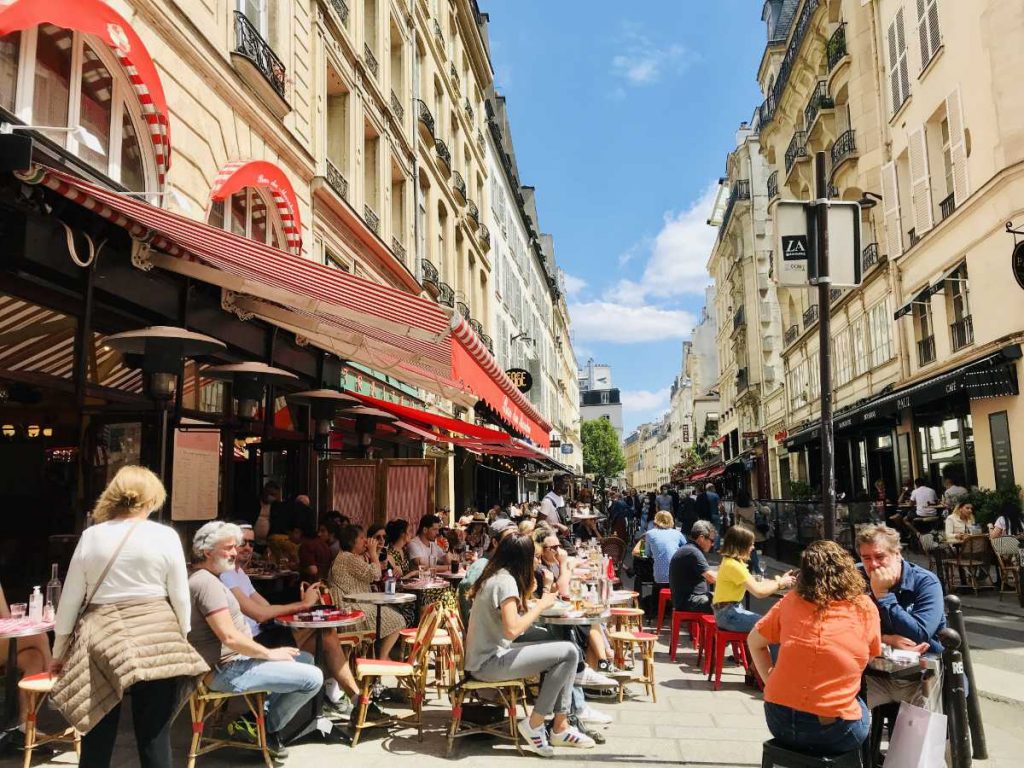
Food, restaurants and dining out
You can find more French food culinary terms here and top foods to eat in France here.
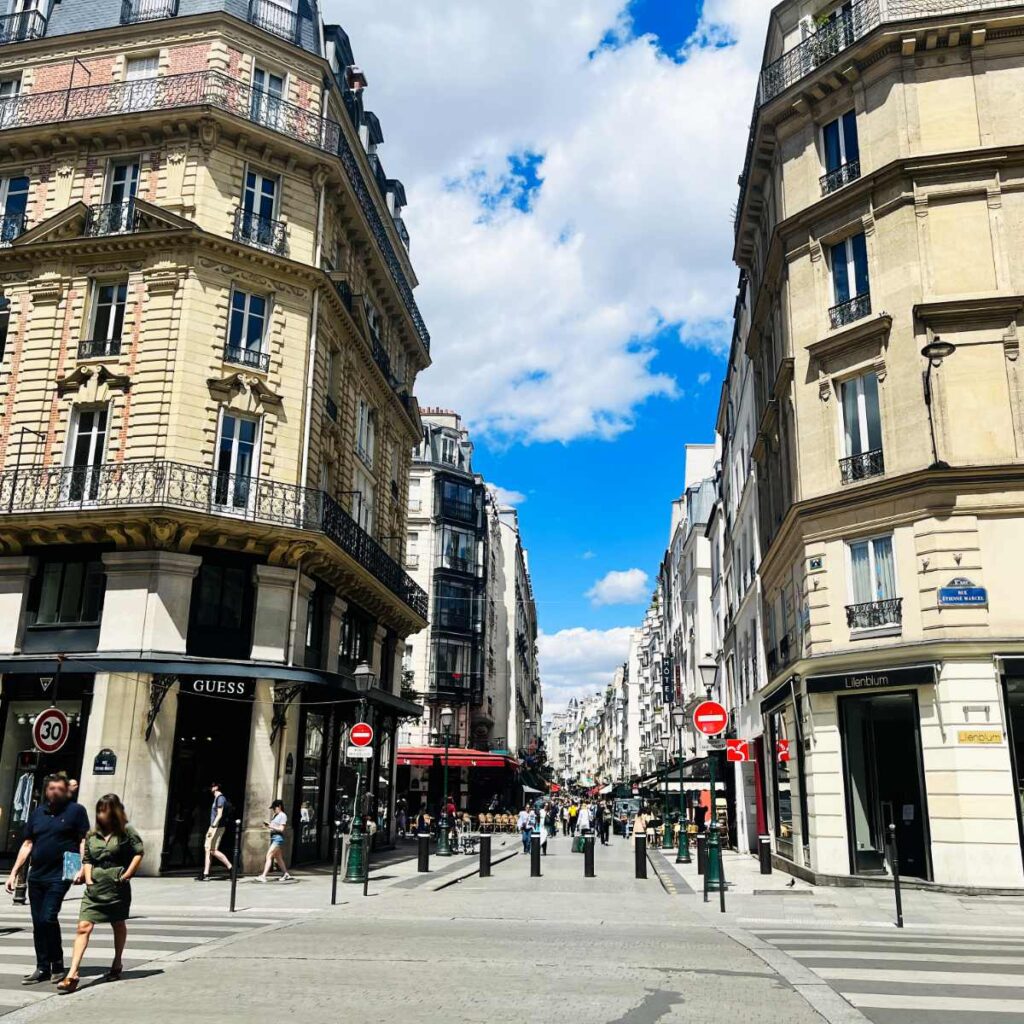
At a train station
For more numbers in French , you can find my printable here.
In a museum
You can find the top museums in Paris here.
If you enjoyed that article, you may like to download the list in printable format below. You can also read more about traveling to Paris here. A bientôt!

You Might Also Like

12 Popular French Comics for beginners

12 Incredible Churches in France
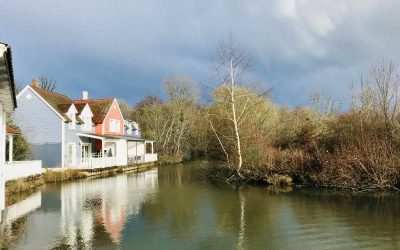
12 Best tips for your Center Parcs family holiday

September in France: Weather, travel, and events
Leave a reply cancel reply.
- Paris & Île-de-France
- Alsace & Lorraine
- Bourgogne-Franche-Comté
- Bretagne & Normandy
- Auvergne Rhône Alpes
- Loire Valley
- Northern France
- Nouvelle Aquitaine
- Provence & French Riviera
- Festivities
- Facts and history
- Get the Look
- Moving to France
- Appetizers & Starters
- Main dishes
- Side dishes
- Common Questions?
- Newsletters
60+ French Phrases for Travel You Need to Know [PLUS Printable]

Order your petit-déjeuner (breakfast) or buy your billets (tickets) to the Louvre all in French! Here are the most useful French phrases for travel you need to know.
Learning some French will offer you further insight into the French culture, mentality, and way of life. The ability to speak even un peu français (a little bit of French) and avoid making these French faux pas will enhance your travel experience and open the doors to unique connections with the locals.
France is the world’s top tourist destination, attracting more than 79,5 million visitors a year! That’s why French is the next language in my travel phrase guide series.
Not only that, but speaking French also comes in handy when travelling to Africa, Switzerland, Canada , Monaco, French Polynesia, the Seychelles amongst other places.
Why else should you learn French? Well, it makes learning other languages, especially Romance languages like Spanish , Italian , Portuguese and Romanian much easier.
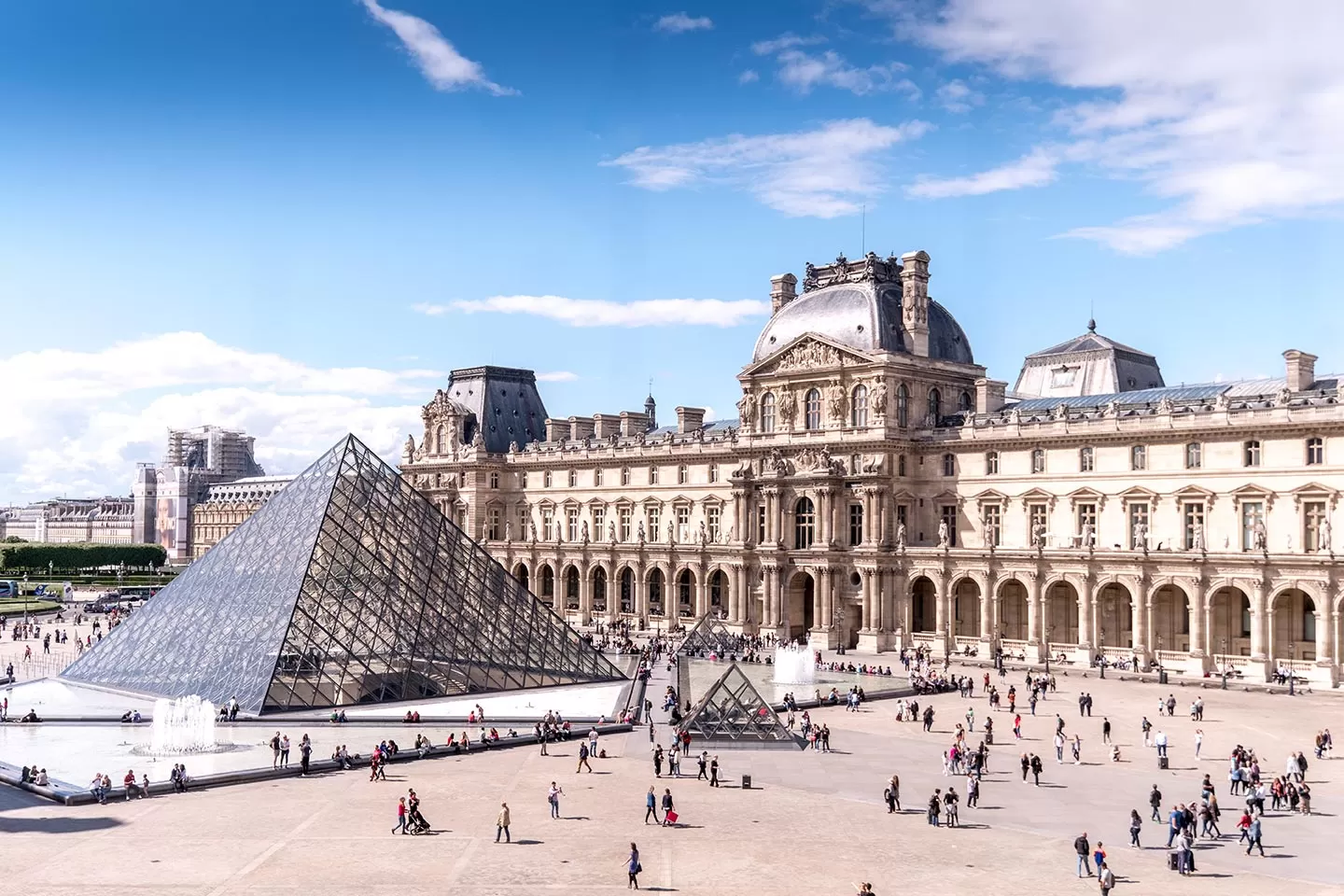
Want to have fun whilst learning French? Struggling to find decent French language resources? I recommend getting uTalk . Available as a desktop site and app, uTalk is awesome for learning key words and phrases in French especially if you want to use it for travel purposes. It’s great for beginners getting started in a language and invaluable for intermediates looking to fill in gaps in their vocabulary and pronunciation.
What I love most about uTalk is that you can jump around their extensive library of topics and choose what you want to learn, when you want, and at your own pace. Because I believe in uTalk so much, I reached out to them and we’ve teamed up to offer you an exclusive 30% OFF reader discount across all of uTalk’s 140 languages! This offer isn’t available anywhere else! Click here to claim your exclusive 30% discount.
Let’s take a quick look at the French language so you’re a bit more clued up on its origin, use, and vocabulary.
I hope you enjoy this post as much as I enjoyed bringing it together. If you have any requests for other languages, let me know in the comments section!
Where is French spoken?

That’s a lot of Bonjour -ing!
French is the third most spoken language in Europe, after German and English and has official-language status in 29 countries, including: Belgium , Benin, Burkina Faso, Burundi, Cameroon, Canada , Chad, the Ivory Coast, the Democratic Republic of the Congo, Djibouti, Equatorial Guinea, France , Haiti, Luxembourg, Madagascar, Mali, Monaco, Niger, Rwanda, Senegal, Seychelles, Switzerland , Togo and Vanuatu. French is even one of six official languages of the United Nations.
It seems like nearly everyone wants to learn French, it’s the only language, alongside English, that is taught in every country in the world!
And the best way to learn it? Well, France operates the biggest international network of cultural institutes, which run French-language courses close to a million learners. My two favourite ways to learn French is by attending language classes – so I’m not only held accountable but also for the social aspect – and going on language holiday too!
A Brief History of the French Language
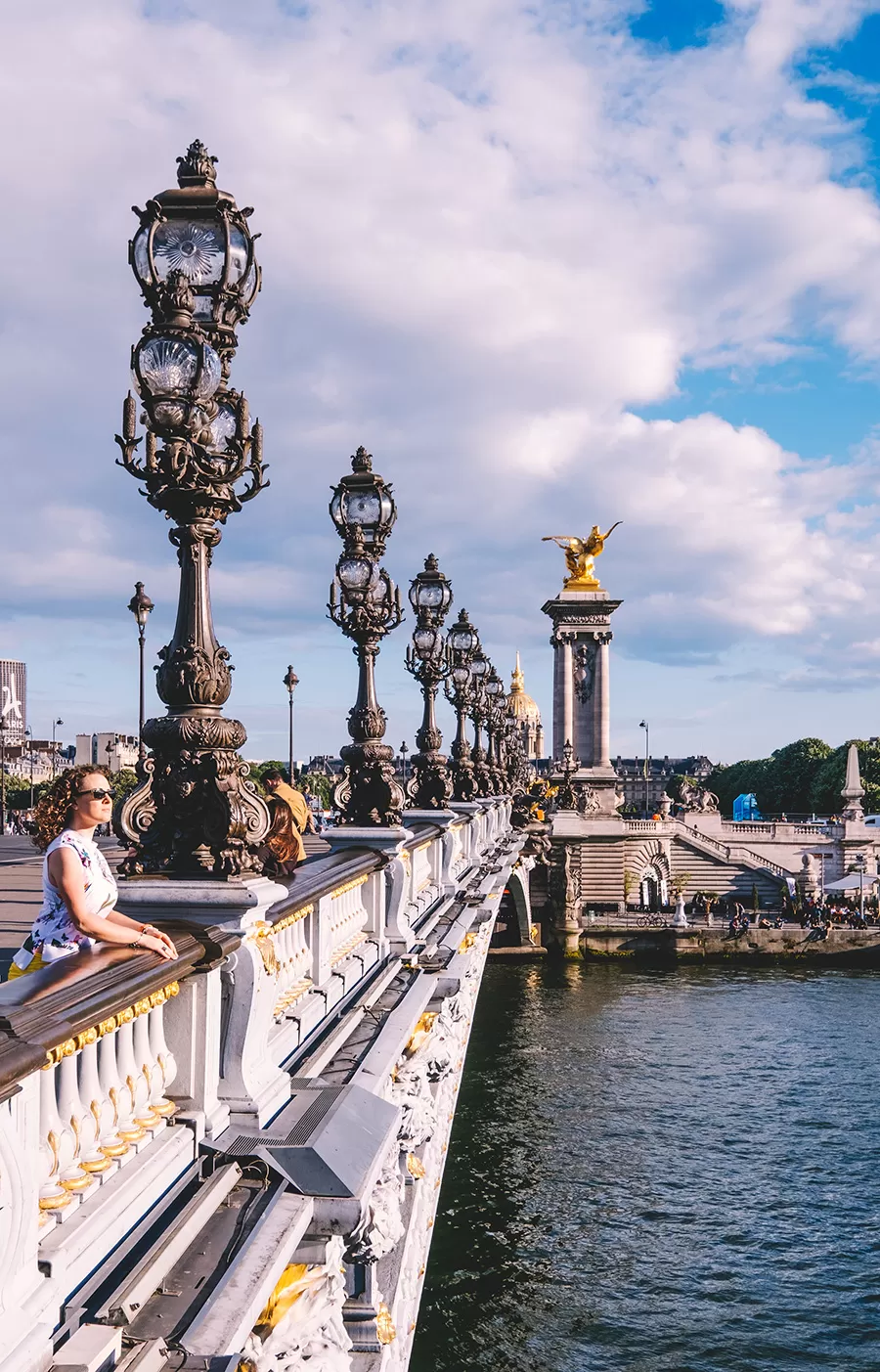
The French and English languages have a pretty mixed-up history. Following the Norman Conquest of 1066, Norman French was adopted as the language of power on the British Isles.
For the next 400 years, French was the language of the nobility and of most official documents. King Henry V put a stop to that when he went to war with France, but because the two languages existed in parallel for so long, the English language is peppered with words of French origin, many of which can be traced back to French roots. This means that you actually already know a lot of French, even if you don’t think you do.
Now for the tricky stuff!
French Pronunciation Tips

There is a total of 26 letters in the French alphabet. Standard French contains 13 oral vowels and up to 4 nasal vowels, but there are 5 additional accented letters that can be applied to change the sound of a letter.
Here are some helpful pronunciation tips:
Using Liaisons
One of the fundamental rules of pronouncing French (and many other Latin-based languages) is that everything has to flow. That’s one of the reasons why French sounds so beautiful.
If you’re speaking French correctly, everything should sound like a continuous melody.
That’s where liaisons come in.
Liaisons are a phonetic link between two words that may sound awkward if left unconnected.
Let’s take a look at some examples where they are used when speaking:
- After pronouns e.g. vous avez sounds like vooz-ah-vey not voo ah-vey
- Numbers and nouns e.g. deux amis sounds like derz-ah-mee not der ah-me
- One syllable prepositions e.g chez eux sounds like shez-uur not sheh uur
And liaisons that are forbidden when speaking:
- When using full names e.g.
- After et (and)
Liaisons may seem complicated at first, but they will become easier the more you listen to spoken French. After a while, you’ll automatically be able to notice where a liaison is needed (and where it isn’t) and how to make it sound natural when speaking.
What Not to Pronounce in French
Much like English, the French language isn’t written phonetically. The same sound can be represented by several different combinations of letters, and there are many cases of silent French letters. Two of the most well known are the silent “e” and the silent “h.”
The Silent “e”
The letter “e” is often silent in French, especially at the end of a word. Here are some examples:
Rue (road/street) is pronounced roo not roo-ee and inacceptable (unacceptable) is pronounced an-ah-sep-tah-bil not an-ah-sep-tah-ble
Of course, there are exceptions when it comes to masculine and feminine adjectives and nouns.
In the case of feminine adjectives and nouns, this typically means that the final consonant of the masculine form will now be pronounced. So, the masculine ouvert , meaning open in the masculine form and pronounced oo-ver , will become ouverte in the feminine form and pronounced oo-vert . The ‘ e ’ makes the final letter sounded.
The Final Consonant
As you’ve probably already noticed, there are a tonne of French letters that simply aren’t pronounced at the end of words. Don’t worry, you’ll get used to it!
In French, silent letters, or lettres muettes , have rules and exceptions just like many other linguistic concepts.
In general, the final consonants of a word are usually silent in French except in some cases of the letters c, f, l or r .
Just remember this simple rule, the consonants in the word ‘ careful ’ are always pronounced.
For example,
Avec (with) is pronounced ah-ve k
Cinq (five) is pronounced saan k
Hiver (winter) is pronounced ee-ve r
The general rule regarding French word endings is that when in doubt, you probably don’t pronounce it. But, French is full of exceptions!
The Infamous “r”
For many English speakers, the French “r” can be a source of frustration. To pronounce it, you’ll need to use your throat and imagine you’re trying to gargle. The French “r” is pronounced in the same place as the English “k”, but with your throat closed.
The Silent “h”
As you’ve probably noticed from every French speaker’s failed attempt to say the word “hamburger” in English, the “h” in French is a silent letter no matter where it’s located in a word.
The only exception to this is when the preceding letter is “c,” in which case the “ch” combination makes a “sh” sound or “k” sound.
Here are a few examples of the silent “h”:
Le haricot vert (French bean) is pronounced leh ah-ree-coh ver
Huit (eight) is pronounced weet
Hiver (winter) is pronounced ee-ver
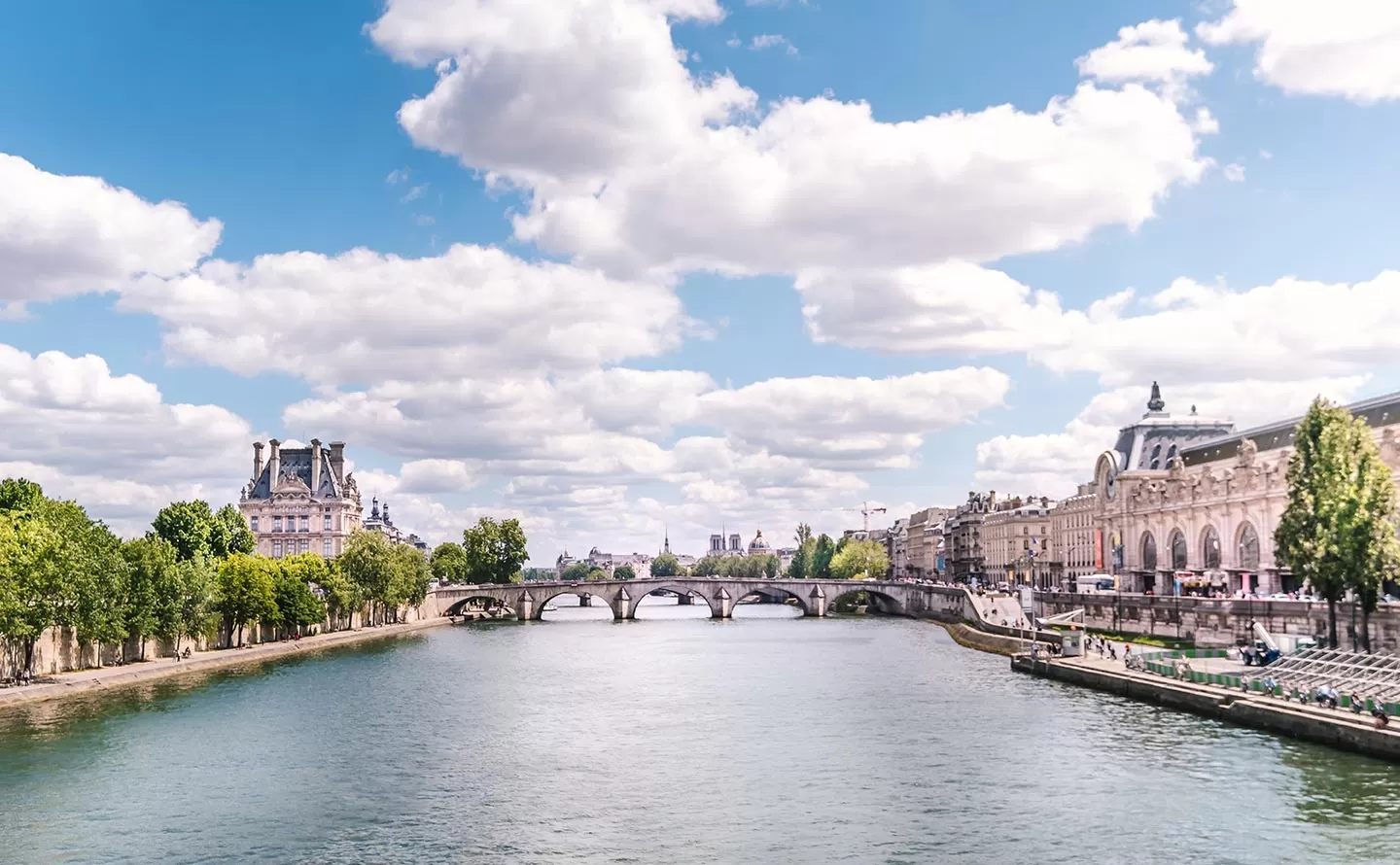
Admittedly there are a few finicky grammar rules to learn, but generally speaking, English grammar corresponds relatively closely to French grammar.
Consider words in English that end with – ible and -able , these are the same in French, only the pronunciation changes. So, the French word ‘possible’ sounds like poss-ee-bleh and ‘comfortable’ becomes kom-for-tah-bleh .
Then we have English words ending in -ent and -ant which also come from French and have the same spelling and the same meaning. So, the word, différent sounds like diff-er-ohnt and important sounds like ahm-poor-tahnt . The ‘t’ at the end is just slightly sounded.
Had enough? Ok, one more! Words in English ending in -ary l ike contrary become -aire in French. So, ‘contrary’ becomes contraire and sounds like kon-trair .
There are so many rules like this, so you can see just how easy learning French can be.
Here are top 10 French Italian Phrases for Travel You SHOULD Know [& How to Use Them]
Top french phrases for travellers.
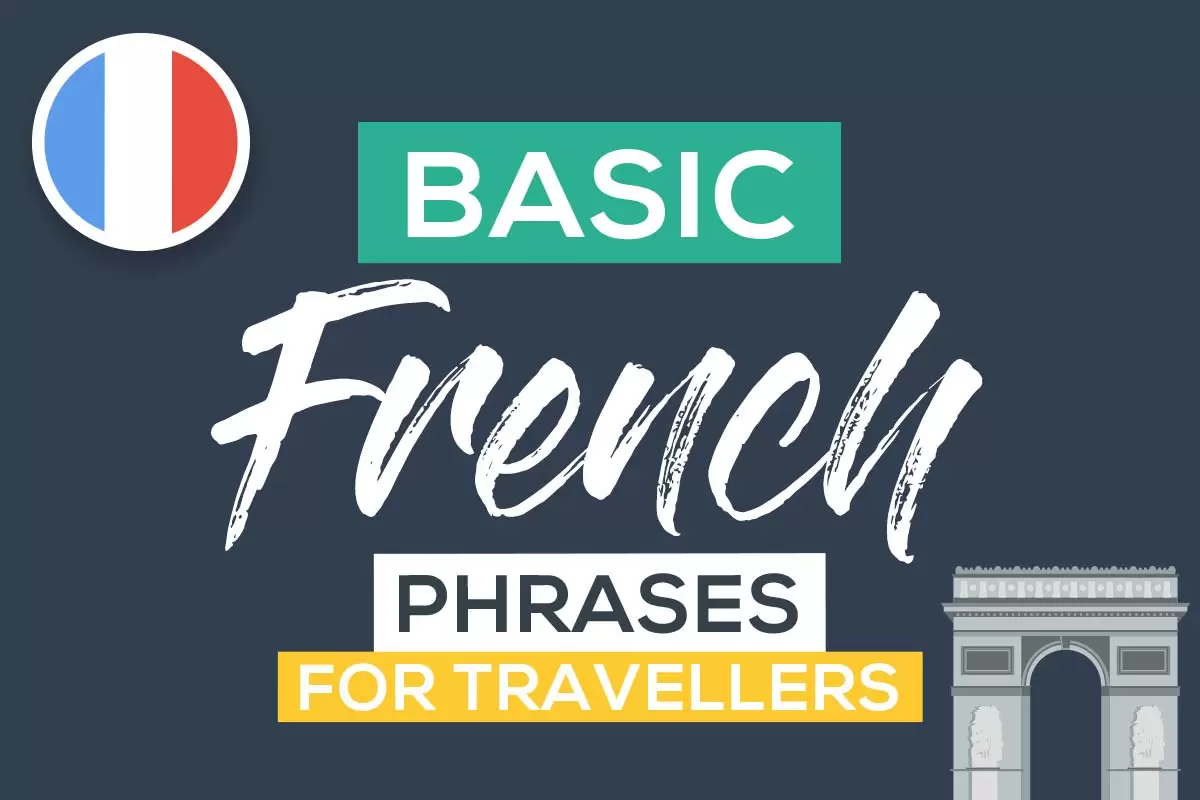
Want the infographic to take with you? Scroll to the bottom of the page.
Greetings Essentials Questions Eating Out Getting Around Numbers Days Emergencies
**There are a few places that use unique words for the numbers 70 ( septante ) and 90 ( nonante ), such as Belgium and Switzerland. With the numbers 80 to 89, combine the number 4, the number 20, and the ones.
For example, in French 80 is four 20s, 81 is four 20s plus 1, and so forth. (Unlike most French-speaking countries, Switzerland actually has a word for the number 80. It’s huitante .)
Want more? Learn French with me, with Intrepid French!
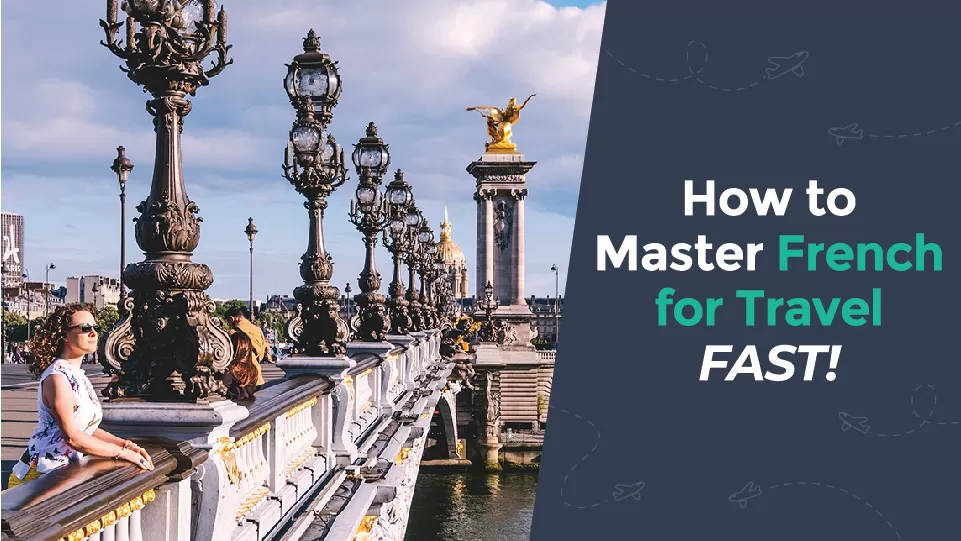
Travelling to France? Don’t be treated like a tourist! Live your best travel experiences and learn France for less than the cost of eating at a tourist trap restaurant or a taxi driver who has “taken you for a ride”. In addition to my free French travel phrase guide , I’ve made it even easier for you to master the French language so you can create lifelong memories as you mingle with locals , get local tips , avoid tourist traps , and make new friends . Join my popular French course here.
Here’s what my students are saying:

Loved it, loved it, loved it. I’ve been trying to learn languages using various language learning apps for years now and although I know random words I feel no more confident in actually speaking the language than I was when I started.” – Basil Pereira
Click here more details and get instant access!
Have a laugh with these funny French expressions
Like it? Pin or download this French travel phrase guide

Like it? Pin it for later!
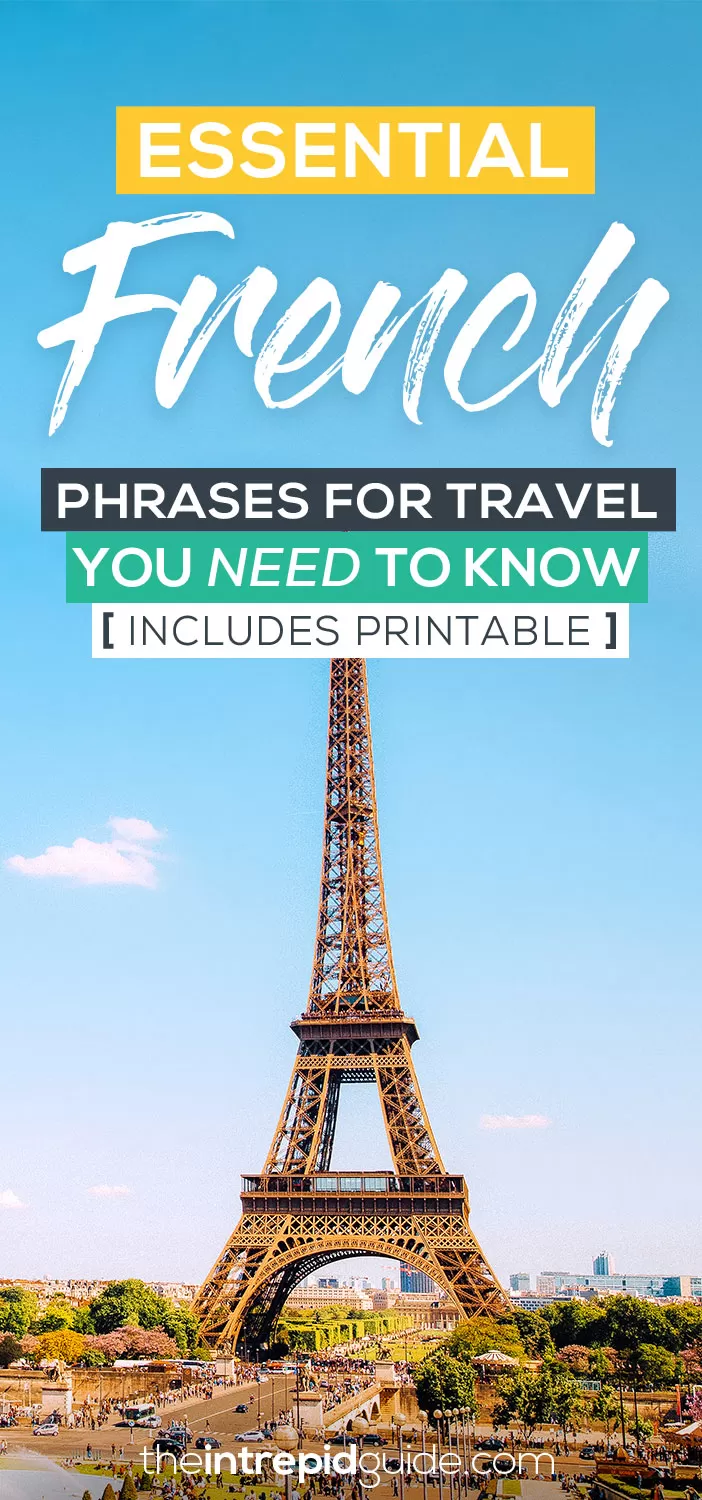
Learning French? Check out these French language guides
- Top 10 French Phrases You Should NEVER Say [& What to Use Instead]
- How to Sound More French: Top 10 French Phrases the French Love Saying
- How a ‘potato’ improved my French pronunciation
- 25 Funny French Idioms Translated Literally
- 22 Most Common French Grammar Mistakes [& How to Avoid Them]
Want to know more about learning languages? Start here!
- 6 Language Learning Tips: How to Learn a Language from Home
- What Type of Language Learner Are You? Your 4-Step Personalised Learning Plan
- 15 Top Language Learning Resources You Should Use
- 44 Best Movies on Disney Plus for Learning Languages
- 13 Ways to Seamlessly Integrate Language Learning into Your Daily Life
- 10 Pro Tips: How to Learn a Language with a Full-Time Job
- 7 Reasons Why You Should Go on a Language Holiday
- Essential Travel Phrases: How to be Travel Fluent in 10 Simple Steps
- 23 Cool Gift for Language Learners They Will Actually Use and Love
- How to Learn Your First Foreign Language in 8 Simple Steps: A Beginner’s Guide
- 11 Life-Changing Reasons Why You Should Learn a Language
- 42 beautiful Inspirational Quotes for Language Learners
- Language learning tips: 11 Polyglots Reveal The Secrets of Their Success
- Top 10 Best Ways to Learn a Language Better and Faster
- How Many Languages are there in the World?
Don’t miss my France Travel Guides
- How to Spend 4 Days in Paris: Ultimate First Timer’s Guide to Paris
- Where to Stay in Paris: A Fairytale Stay at Hotel Trianon Rive Gauche [Hotel Review]
- Where to Stay in Paris: A Decadent Stay at Hôtel Thérèse [Hotel Review]
Over to you!
Which of these French phrases are the most useful? What other languages would you like a travel phrase guide for? Have you been to a French-speaking country? Let me know using the comments section below or join me on social media to start a conversation.
Thanks for reading and I hope you enjoyed this post.
Like what you see? Subscribe using the form below to have all of my posts delivered directly to your email.
Success! Now check your email to confirm your subscription.
There was an error submitting your subscription. Please try again.
Get my best language and travel tips FREE by email...
Subscribe to my newsletter to receive detailed travel guides, exclusive travel and language learning tips, priority access to giveaways and more!
I will never give away, trade or sell your email address. You can unsubscribe at any time.
Michele creates language learning guides and courses for travel. What separates her from other instructors is her ability to explain complex grammar in a no-nonsense, straightforward manner using her unique 80/20 method. Get her free guide 9 reasons you’re not fluent…YET & how to fix it! Planning a trip? Learn the local language with her 80/20 method for less than the cost of eating at a tourist trap restaurant Start learning today!
Blond or Blonde: Why Does Grammatical Gender in English Still Exist?
How to sound more french: top 10 french phrases you should use.
This is great. I took years of French when in school, 40-years ago and now want to re-learn and be able to get by when traveling. Merci
Hi! (Sorry for the Failures, I don’t speak english very well because I am french) My Name is Salomé and I am from France. I felt random on your Website and I watched you tables and the picture called ” French travel Cheat sheet “. What you’re doing is awesome because you help people open us to the World. I am proud of what you do. I want to help because I am a native speaker of French not of all the French (Canada, Belgium..) but from France. Salomé
Hey Michele, love the article, love the guide. I think there are some mistakes on the French spelling and pronuciation for the word Right.
Right =droite drrrwa (with the funny r for the French). Apart from that, what a precious website!! Well done!
Hi Monique, thank you for correcting this typo, I’ve just fixed it now 🙂
Hey Michele
This is so cool. Thanks for sharing it. I was I Paris about a month ago and these would have come in very handy. Keep up the good work.
Merci Au revour
Thanks Basil, I’m so glad you enjoyed this post. I hope you’ll find it useful for future travels in Francophone countries 🙂
Leave a Comment Cancel Reply
Save my name, email, and website in this browser for the next time I comment.
This site uses Akismet to reduce spam. Learn how your comment data is processed .
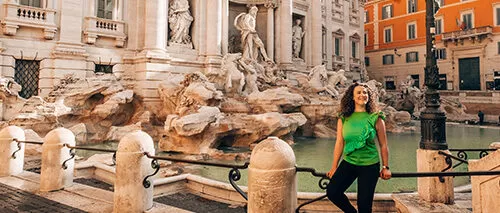
If you don't know where you are , how do you know where you're going? Find out how well you know Italian grammar today!
- Search Please fill out this field.
- Manage Your Subscription
- Give a Gift Subscription
- Sweepstakes
- Travel Tips
Basic French Words, Phrases, and Sayings Every Traveler Should Know
These are the basic French words, phrases, and slang to know for your next trip to France.
Anyone who has spent even the shortest amount of time in France — particularly in Paris — knows the importance of being able to speak a little français, so we've rounded up some common French phrases, words, and even French slang you should learn before your next trip — whether it's in six months or six years.
Locals will quickly warm to travelers who at least make an effort to speak their language. Whether it's saying "bonjour" when you enter a shop or ordering politely in a café, the French will take note of your courtesy. Any useful French words, sayings, or phrases you can commit to memory will help you navigate the country, interact with residents, and make the most of your trip.
And, as a rule, remember that it's always safer to use the "vous," or formal version, of French, unless you're speaking to a child. Here are the basic French words and phrases to learn before you visit France.
Basic French Words
Hello: Bonjour
Goodbye: Au revoir
Goodnight: Bonne soirée, or bonne nuit
Please: S'il vous plaît (formal), s'il te plaît (informal)
Thank you: Merci
You're welcome: De rien
Beautiful: Beau (masculine), belle (feminine)
Common French Phrases
How are you?: Comment allez-vous? (formal), Comment vas-tu? (informal)
I am well, and you?: Je vais bien, et vous?
What is your name?: Comment vous appelez-vous? (formal), Comment tu t'appelles? (informal)
My name is...: Je m'appelle...
I love you: Je vous aime (formal), Je t'aime (informal)
I miss you: Vous me manquez (formal), Tu me manques (informal)
Excuse me: Pardon
I don't know: Je ne sais pas
I don't understand: Je ne comprends pas
Basic French Phrases for Travelers
Do you speak English: Parlez-vous anglais?
I'm lost: Je suis perdu(e), adding an e if you identify as female.
I'm sorry: Je suis désolé(e)
Where is...: Où est... (For example, "Where is the Louvre?" translates to "Où est le musée du Louvre ?")
Where is the bathroom?: Où sont les toilettes?
How much is...: Combien coûte... (For example, "Combien coûte cette robe?" means "How much is this dress?")
I would like...: Je voudrais...
A beer: Une bière
A glass of wine: Un verre de vin
A coffee: Un café
Common French Sayings and French Slang
Hello: Salut (informal)
I love Paris: J'adore Paris
Have a nice trip: Bon voyage
Forget it or drop it: Laisse tomber
Come on or let's go: Allez
That's life: C'est la vie
Long live the Republic and long live France!: Vive la république et vive la France!
French food is the best in the world: La cuisine française est la meilleure du monde
Unconventional language hacking tips from Benny the Irish polyglot; travelling the world to learn languages to fluency and beyond!
Looking for something? Use the search field below.
Home » Articles » 60+ Essential French Phrases for Beginners to Start Speaking Now
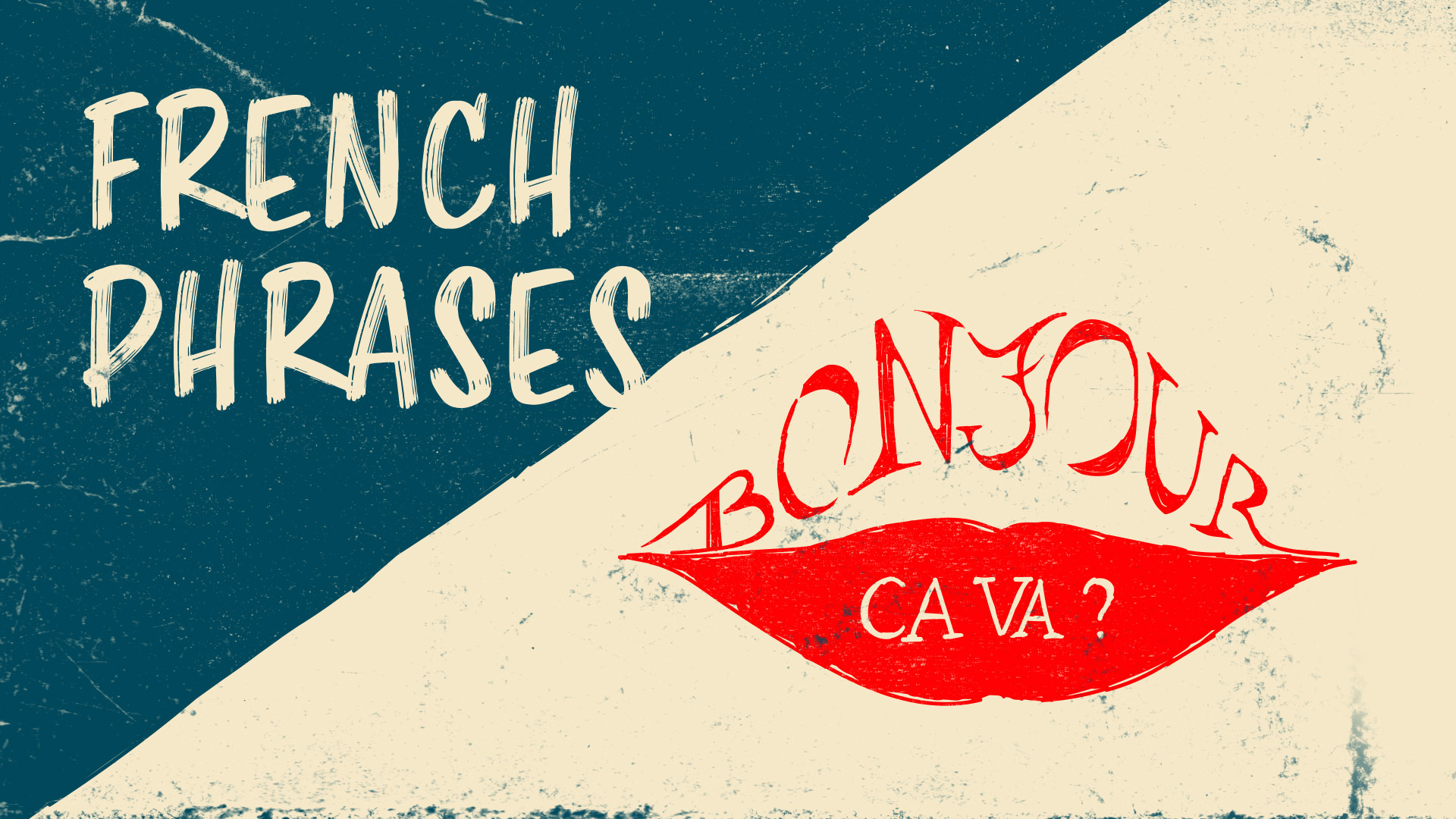
Full disclosure: This post contains affiliate links. ?
written by Benny Lewis
Language: French
Reading time: 17 minutes
Published: Jan 11, 2021
Updated: Sep 17, 2021
60+ Essential French Phrases for Beginners to Start Speaking Now
What are some French sayings? What are the most common phrases in French? And can learning a few powerful French phrases really help you start speaking right away?
Absolutely!
Even if you'll only be spending a short time in the country, learning a few basic French phrases can be very rewarding and make a big difference to your trip.
Let’s start by mastering some of the most common French phrases you need to know as a beginner:
I've long advocated that set phrases are the best thing for beginners to learn when starting out.
After all, isn't the goal of language learning to communicate?
How do you expect to communicate with anybody if the only thing you've learned so far is a verb table?
So whether you're planning to travel to Paris for a week or move to Saint-Louis-du-Ha! Ha! for the rest of your life, here are the most important and useful French phrases that you should learn A.S.A.P.
Listen to the French Phrases:
Here's a quick “French phrases” video I made that will help you with pronunciation for most of the phrases in this article:
Before we get started, if you’re looking for an online French course, here’s the course I recommend: French Uncovered – Learn French Through the Power of Story, a course with a fascinating new method by my friend Olly.
French Greetings and Polite Phrases
Bonjour – “hello”.
There are many ways in French to say “hello” , but bonjour is undoubtedly the most well-known. It's universally polite and friendly, whether the situation is formal or informal.
Bonjour is a combination of the words bon (“good”) and jour (“day”).
In the evening, you could also say bonsoir (“good evening”). A more casual way to greet people is salut , which can mean either “hi!” or “bye!”.
S'il vous plaît / s'il te plaît – “Please”
As a tourist, the last thing you want to be is rude. So when in France, remember what your mother taught you, and say s'il vous plaît (“please”) when making a request.
You can also say s'il te plaît. What's the difference? It's all about “you”:
In French there are two ways of saying “you”.
Tu is what you'd use when addressing a friend. Vous is a more polite and formal version, best used when talking to a stranger or older person.
( Vous is also what you should use when addressing a group of people in any situation, similar to saying “you guys” or “you all” in English).
So s'il vous plaît and s'il te plaît both mean “please” (literally, “if it pleases you”), but s'il vous plait is the more polite version. If in doubt, use s'il vous plaît .
(Why is it s'il te plait and not s'il tu plait ? It's a grammatical thing that you don't need to worry about as a beginner. Just learn the phrase as a whole for now, and things will become clear later.)
In fact, when asking for something in French – e.g. asking a stranger for directions or asking to see a menu in a restaurant, you should start with “ Bonjour. S'il vous plaît… ” It literally means “Hello, please…”, which would sound a bit strange in English, but it's the normal way to start a polite request in French.
Comment vous appelez-vous? / Comment t'appelles-tu? – “What’s your name?”
When meeting anyone, one of the first things you'll want to know is their name.
In French, you can find it out by asking “ Comment vous appelez-vous? ” (formal) or “ Comment t'appelles-tu? ” (informal).
Literally, these questions mean “what do you call yourself?”. You could also ask “ c'est quoi ton nom? ” – which is a more literal translation of “what's your name?”
If you're on the receiving end of this question, answer with “ Je m'appelle… ” (“my name is”, literally “I call myself”) or a simple “ Je suis… ” (“I am…”).
Oui/Non/Si – “Yes/No”
Two essential words to learn in any language are “yes” and “no”. In French, “yes” is oui and “no” is non .
Informally, it's also common to say ouais or ouaip instead of oui – like saying “yeah” or “yep” in English.
Then you have si . This is a handy little word that has no direct equivalent in English. Use it to say “yes” when someone asks you a negatively phrased question.
To illustrate what I mean, imagine that someone asks you, in English, “haven't you been to Paris?”
If you reply “yes”, it's not exactly clear what you're saying. Do you mean “yes, I have been to Paris – contrary to your assertion” or “yes, you're correct: I haven't been to Paris”?
French avoids this confusion with the word si . It means “yes”, but more specifically it contradicts the assertion in the question. In the above example, if you say si , it clearly conveys that you have, in fact, been to Paris.
Si is one of many linguistic features that I sorely miss when I speak English.
Comment allez-vous? – “How are you?”
This is the polite way of saying “how are you?” in French. Note the use of the polite vous rather than the informal tu .
Another, more informal way to say “how are you?” is ça va ? This phrase is extremely common – when in France you'll likely hear it several times per day.
If someone asks you “ ça va? ”, you can respond with a simple “ ça va bien ” – “it's going well”.
Excusez-moi – “Excuse me”
To get someone's attention, whether they're a waiter in a restaurant or a stranger on the street, say “ excusez-moi ”, “excuse me”.
This is also the polite way to ask someone to get out of your way. For example, if you're trying to exit a crowded train, a soft “ excusez-moi ” should (hopefully) be enough to make people step aside.
Pardon – “Sorry”
Picture getting off a crowded train, being careful you don't bump into anyone as you walk through the crowded metro station. But if a collision does occur, it's fine. Just say pardon , “sorry”, and all will be forgiven.
“ Pardon? ” is also how you'd ask someone to repeat themselves if you didn't hear or understand what they said. In this case, you should say it with a rising tone to indicate that it's a question.
Another way to say this is “ pourriez-vous répéter, s’il vous plaît ?” – “Could you repeat, please?”
Merci beaucoup – “Thanks a lot”
And of course, don't forget to say thank you!
The French word for “thank you” is merci . Or you can make it stronger by saying merci beaucoup – “thanks very much”.
Use merci in all the same situations you'd say “thank you” in English.
Other Must-Know French Greetings and Polite Phrases:
- Nice to meet you – Enchanté
- How’s it going? – Comment ça va?
- And you? – Et toi?
- Are you well? – Vous allez bien?
- What’s new? / What’s up? – Quoi de neuf?
- Good, thanks! – Bien, merci!
- So-so / It’s okay – Comme ci, comme ça (Literally: “like this, like that”)
- Same as always – Comme d’hab
- It could be worse – Ça pourrait être pire
- You’re welcome – Je t'en prie
- Don’t mention it / You’re welcome – De rien
- Goodbye – Au revoir
- See you soon – À bientôt!
French Phrases for Maintaining a Conversation
Je voudrais parler français – “i would like to speak french”.
The French are famously protective of their language. Sometimes they can be a bit impatient with us anglophones, and reply in English to your imperfect French questions.
It's frustrating when this happens, but if you ever want to make progress in a foreign language, you absolutely must stop speaking English !
Be polite but firm when someone tries to speak English with you – tell them “ Je voudrais parler français ” – “I'd like to speak French.”
Note that, unlike in English, names of languages are not written with a capital letter in French.
Je ne comprends pas – “I don’t understand”
Sometimes pardon doesn't quite cut it. If you really can't figure out what the other person is saying, try telling them “ je ne comprends pas ” – “I don't understand.”
There's no shame in being a beginner! Just remember not to fall back to English when the going gets tough. If you don't understand something, persevere in French anyway – it's the only way you'll learn.
Que veut dire ça? – “What does that mean?”
Maybe the reason you didn't understand is because there was a specific word you didn't recognise. If that's the case, say “ que veut dire X? ” – “What does X mean?”
You can also phrase this as “ ça veut dire quoi? ” – “What does that mean?”
Plus lentement – “More slowly”
Sometimes, vocabulary isn’t the problem. You’d know the words if you could make them out, but you can't because the other person is talking too fast!
In this case, try saying plus lentement – “more slowly”.
Better yet, say a full sentence: “ Pourriez-vous parler plus lentement, s’il vous plaît? ” – “Can you speak more slowly, please?”
Comment dit-on __ en français? – “How do you say __ in French?”
What if you need to say something in French, but the exact word escapes you?
Just fill in the blank in the above sentence: “ Comment dit-on X en français? ” means “How do you say X in French”?
A side note: the pronoun on , seen above, is an interesting one. It’s a colloquial alternative to nous (“we”). However, on is also used to refer to an unspecified person or people in general, like the word “one” is sometimes used in formal English. (If you speak German, note that on in this sense is like the German word man .)
One doesn't use the word “one” very much in modern English – one finds it rather old-timey and stuffy. These days you normally use “you” when you're talking about people in general.
Comment ça s'écrit? – “How do you spell that?”
If you learn a new French word using the phrase above, you might want to write it down before you forget it.
Unfortunately, French spelling isn't the easiest.
The relationship between spelling and French pronunciation can be complicated. Generally, it's easier to figure out a word's pronunciation from its spelling than it is to know its spelling from its pronunciation. I wrote a guide to help you with French pronunciation here .
So if you're not sure, ask someone “ comment ça s'ecrit? ” – “How do you spell that?” Literally: “How does that write itself?”
Or if you don't trust your own transcription abilities, try asking them to write it for you: say “ Est-ce que vous pouvez l'écrire? ” – “Can you write it (down)?”
Other Helpful Phrases for Maintaining a French Conversation:
- Can you speak more slowly please? – Pouvez-vous parler plus lentement s'il vous plaît?
- Can you say it one more time? – Pouvez-vous le dire une fois de plus?
- Do you speak French? – Parlez-vous français?
- Do you understand? – Comprenez vous?
- What do you do for a living? – Qu’est-ce que tu fais dans la vie?
- How old are you? – Quel âge as-tu?
- I’m _ years old – J’ai _ ans
- Where are you from? – D'où êtes-vous?
- I’m from… – Je viens…
- Are you married? – Es-tu marié?
- Are you single? – Es-tu célibataire?
- When can we meet? – Quand pouvons-nous nous rencontrer?
- What’s your phone number? – Quel est ton numéro de téléphone?
French Phrases for Getting Around
Où est… – “where is…”.
Struggling to find your way around? Not to worry. Just get a stranger's attention (remember what phrase would you use to do this?) and ask “ où est X ” – “Where is X?”
“X” could be many things: la Tour Eiffel, le Louvre, Notre Dame … or perhaps something less exotic, like le metro or un restaurant .
Où se trouve la station de métro la plus proche? – “Where is the closest metro station?”
Another way of saying “where is it?” is où se trouve , literally “where is (it) found”.
Here's an example of où se trouve combined with another handy phrase to know: la station de métro la plus proche means “the closest metro station”.
One more piece of useful vocabulary: once you're in the metro station, you might want to ask someone “ où est le guichet? ” – “Where is the ticket window?”
Je voudrais acheter un billet – “I would like to buy a ticket”
Now that you've found the guichet , you probably want to buy a billet – a ticket. But what type of ticket do you want?
- un billet aller simple – a one-way ticket
- un billet aller retour – a round-trip ticket
Make your decision, and tell the assistant “ je voudrais un billet aller simple/retour pour X ” – “I would like to buy a one-way/round-trip ticket to X”, where X is your destination.
C'est combien? – “How much is it?”
France isn't the cheapest of countries – so whether you're at the guichet or elsewhere, it doesn't hurt to be price-conscious.
To ask how much something costs, say “ c'est combien? ” – “how much is it?” You can also say “ Combien ça coûte? ” – literally, “how much does it cost?”
Où sont les toilettes? – “Where are the toilets?”
It's worth learning this phrase, because you might need it in a hurry! Où sont les toilettes means “where are the toilets?”
Although if you want to use a public toilet, you could be searching for a long time.
They aren't very common in France – and if you do find one, you'll probably have to pay to use it. You're probably better off buying something in a café and using their toilets instead.
(Why is it “ où sont “, when previously we used “ où est “? Easy: sont means “are” while est means “is”. Since toilettes is plural, you must use sont , not est – “where are the toilets?”, rather than “where is the toilets”, which wouldn’t make sense.)
À quelle heure est-ce qu’il faut régler la note? – “What time is check out?”
If you're checking into a hotel in a French-speaking country, one useful thing to know the checkout time.
One way to find this out is to ask “ à quelle heure est-ce qu’il faut régler la note? ” – “What time must we check out?”
Another similar expression is: “ quelle est l'heure limite d'occupation? ” (Lit: “What is the occupancy cut-off time?”
La carte/le menu, s’il vous plaît. – “The menu, please.”
France is famous for its food, so while you're there, you'll probably want to dine in a restaurant or two!
When dining out in any language, there are usually a few subtleties around how to order. Here I'll explain one of the more important things to know in French: the words for “menu”.
I say “words” because there are two main ways to say “menu” in French.
The general word is carte , which you may recognise from the expression à la carte .
A carte is what you typically think of when you hear the word “menu”. It's a list of individually-priced options; you pick and choose what you want, then add up the prices to get your total bill.
But you can also ask for a menu , which is usually called a “fixed-price menu” in English. When ordering from a menu , you pick an option for each course (starter, main course, etc.) and pay the same, fixed price no matter what you selected.
Whichever option you choose, inform the serveur/serveuse (“waiter/waitress”) by saying “ la carte/le menu, s’il vous plaît ” – “the menu/fixed-price menu, please.”
Je ne peux pas manger… – “I can’t eat…”
This doesn't apply to everybody, but for those to whom it does apply, it's very important: informing the waiter about your dietary restrictions.
The simplest way to do this is to say “ je ne peux pas manger de X ” – “I can't eat X”. Here are some of the more common ways to fill in the blank:
- cacahuètes – peanuts
- noix – nuts
- gluten – gluten
- fruits de mer – shell fish
- œufs – eggs
- poisson – fish
- produits laitiers – dairy products
- viande – meat
If you're vegetarian, say so with “ je suis végétarien ” (for men) or “ végétarienne ” (for women.)
A vegan is a “ végétalien(ne) “, although végan/végane is sometimes used too.
You could also explain “ je ne consomme pas de produits animaux .” – “I don't consume animal products”
Nous voudrions commander maintenant. – “We would like to place an order now.”
To “order” in French is commander , when you're talking about ordering something in a restaurant.
Don't confuse this with ordonner , which is used in the sense of “to order a person to do something”, such as in the military.
After receiving the carte or the menu , and perhaps informing the waiter of your dietary restrictions, you may be given some time to make a decision. When you're ready, say “ nous voudrions commander maintenant ” – “we'd like to order now.”
It’s also acceptable in nearly any restaurant to use on instead of nous for we, as I mentioned earlier: On voudrait commander maintenant.
Or if you're by yourself, say je voudrais (I'd like) instead of nous voudrions (we'd like). Bon appétit!
L’addition, s’il vous plaît. – “The bill, please”
One final bit of restaurant-related vocabulary – the bill (or “check” if you're American) is l'addition .
So when you're ready to leave, say l’addition, s’il vous plaît – “the bill, please”.
You’ll often hear la facture used in Quebec instead of l’addition – however both are perfectly understandable to waitstaff.
Other French Phrases for Out and About in France:
- Can you help me please? – Pouvez-vous m'aider s'il vous plaît?
- I would like… – Je voudrais…
- I’d like one of those please – J'en voudrais un s'il vous plait
- Three: Trois
- Four: Quatre
- Five: *Cinq
Learn more: French Numbers: Counting in French from 1 – 100+
Romantic French Phrases
Je t'aime – “i love you”.
Finally, let’s talk about love.
They say that French is a romantic language, so maybe in your travels you'll find love on the road? Or maybe after you get home, you'll want to use your newfound French skills to woo that special someone.
So how do you say “I love you” in French?
The French word for “to love” is adorer – but you generally only use this word when talking about things rather than people, for example to say that you love a place, book, or song.
When talking to a person, say je t'aime . Aimer usually means “like”, but in this context it means “love” in the most romantic of senses. Use it wisely!
Here are some other romantic French phrases:
- My heart – Mon cœur
- My love – Mon amour
- You’re beautiful – Tu es belle (to a woman); Tu es beau (to a man)
- You’re too cute – Tu es trop mignon
- I like you (Lit: “You please me”) – Tu me plais
Bonus: French Slang
Wondering what a famous French saying is that you could use in everyday life? Or how do you say “cool” in French slang?
Here are some bonus French sayings and slang to level up your French:
- Cool – Cool (yes, really! Just say it with a French accent 😉)
- Awesome – Génial
- That sucks – C’est nul
- That’s great – C’est top
- Don’t worry – T'inquiète
- Losing my mind – Perdre la tête
Over to You
Can you think of any other useful French phrases for tourists? What are the most important words and phrases for beginners to know? Let us know in the comments.
And if you’re ready to learn more French, check out the 111 core French words that are commonly used. Or learn some more fun French slang !
Benny Lewis
Founder, Fluent in 3 Months
Fun-loving Irish guy, full-time globe trotter and international bestselling author. Benny believes the best approach to language learning is to speak from day one .
Speaks: Spanish, French, German, Italian, Portuguese, Esperanto, Mandarin Chinese, American Sign Language, Dutch, Irish
Have a 15-minute conversation in your new language after 90 days
101 Basic French Words For Travel In France
Are you planning your trip to France but feel nervous about actually speaking french among the natives? Do not worry. We made a special guide for you to help you during your trip!

Samuel Bonne
Although France lies next door to England, a native English-speaking country, you may not always be able to get by with speaking English, especially if you wish to immerse yourself in the culture or walk around the French suburbs. So, before you plan a trip to Metropolis, it's a smart option to brush up on some fundamental French terms and phrases.
Learning a few introductory greetings and courteous phrases in the mother tongue will make the most of your trip and facilitate your interactions with the locals. Even if speaking the language isn't your forte or you're not too confident, this guide below will help you speak french like a native .
Below are a few that will allow you to communicate and will surely make your vacation worthwhile.

Why Visit France
France has been on each one of us's bucket list. Why not? It is known as one of the most beautiful spots on the planet.
Every tourist will find that the country has a lot to offer. Whether you've come to learn about the city's rich culture and history through its museums and architectural marvels, or you've come on a romantic trip with your loved one in, you guessed it! The City of Lights, Paris, la France has something for everyone.
Paris, as well as Bordeaux, Lyon, Cannes, and Nice, France is known for its magnificent cities and luxurious lifestyle that will certainly capture your heart. It is home to world-famous art and movies; museums such as the Louvre and the Cannes Film Festival , as well as films such as La Vie en Rose and Amelie. Moreover, learning french through art and artists is a fun and engaging way to understand the language.
It should come as no surprise that France and fashion are sides of the same coin, hence prepare to see many shopping centres and boutiques around the region. It had to be, given that it is the birthplace of some of the world's most well-known fashionistas, like Yves Saint-Laurent, Christian Dior, and LVMH.
It's also famed for its delectable cuisine, scenic towns, outdoor sports, and, most importantly, its love language, le français. So, even if you can't fly to this lovely nation just yet, you may begin to feel a connection by growing your French vocab and develop your accent right now!
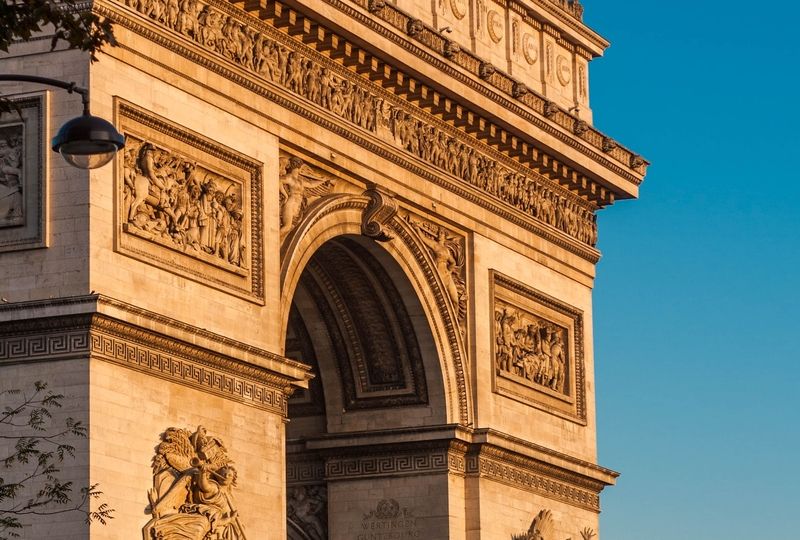
Basic French Phrases To Visit France
Learning to approach people respectfully in French is the very first step toward feeling at ease in France. It will also enhance the level of service you receive and your interactions with the French overall.
Male and female expressions are generally different, just as there are various definitions of greeting in French depending on how well you know someone.
There are often articles associated with every word, be it an object, a material or a person; they are categorised into masculine and feminine . You can use le (the)/ un (a) for a masculine noun like un garçon means a boy. Likewise, you use la (the)/ une (a) for a feminine noun like une fille means a girl.
Similarly, when speaking to someone you know or addressing a child or an animal, you can say 'tu' , which means you. However, you must use ‘vous’ while speaking to strangers, authorities or your seniors. It is a far more polite and formal way of addressing someone. Remember, it's usually safer to use ‘vous’ as a general rule.
To start a discussion, here are some simple French words and phrases to use:
The Basics Phrases You Need To Know
Common courtesy is fairly serious among the French, so whether you're meeting someone for the first time or conversing with a stranger, it's key that you address them correctly and with the appropriate expression.
Bonjour : Good morning/ Hello Do not forget to say bonjour as you enter a shop or start a conversation with someone!
Salut : Hello (casual way of saying hello)
Bonsoir : Good evening
Monsieur/ Madame/ mademoiselle : Mister/ Madam/ Miss
S'il vous plaît : Please
Merci/ Merci beaucoup : Thank you/ Thank you very much
Excusez-moi/ Pardon : Excuse me Pardon is an informal way. You can use either if you bump into someone or make your way through a crowd.
Au revoir : Goodbye
Bonne journée! : Have a good day!
Je suis désolé(e) : I'm sorry (an e is added if you identify as female)
Making Yourself Understood In French
It is important to make yourself understood if you are a tourist and you are not familiar with the language. Je is used as a subject and it stands for I.
- Je ne comprends pas : I don't understand
- Je ne sais pas : I don't know
- Parlez-vous anglais? : Do you speak English
- Je ne parle pas français : I do not speak French
- Je parle un peu français : I speak a little French
- Répétez, s'il vous plaît : Repeat please You can say this when you have not understood what has been said or if the person might have spoken too quickly, you can say:
- S'il vous plaît, parlez lentement : Please speak slowly
Introducing Yourself In French
- Je m'appelle ... : My name is ...
- Quel est votre nom? : What is your name?
- Comment allez-vous? : How are you?
- Je vais bien, et vous? : I am well, and you?
- Je viens de ... : I come from ...
- Enchanté(e) : Pleased to meet you (an e is added if you identify as female).

Transportation Words In French
The transit system is usually the main mode of transport in the country, connecting the big cities so you will have no problem travelling from one end to the other.
Prices vary over distances and it is a fast and comfortable option. You can even travel within as well as to neighbouring countries. You might need to know certain terms to be able to get your way through!
Le bus : the bus
Arrêt de bus : Bus stop
Un taxi : a taxi
Je voudrais partir à la gare : I would like to go to the bus/train station
Train : Train The high-speed train of France is called Train à grande vitesse (TGV) , you can simply say TGV.
Le Métro : Subway
Un Avion : Airplane
Une Voiture : Car
Un Billet : Ticket
Le Guichet : Ticket window
Quelle est l’horaire? : What is the schedule?
L'aéroport : Airport
La gare : Bus/ train station
Directions Phrases In French
- À gauche : To the left.
- À droite : To the right.
- Tout droit : Straight ahead.
- Où sommes-nous? : Where are we?
- C’est loin/près d’ici? : Is it far/close by?
- La Sortie : The exit
- Nord : North
- Sud : South
- L'Est : East
- L'Ouest : West
- Là-bas : There
Places Or Accomodation Terms In French
As you explore the country, you should have an idea of what certain places are called so that it's easy for you to maneuver around.
L'hôtel : Hotel
L'auberge : Hostel A hostel is usually cheaper than a hotel but you have to make sure that they are accessible and clean.
J'aimerais faire une réservation : I'd like to make a reservation
Je voudrais une chambre pour deux : I would like a double room.
À quelle heure est-ce qu’il faut régler la note? : At what time should we check out?
La plage : The beach
Les Magasins : Shops
Centre commercial : Shopping mall
L'église : Church
L'ambassade : Embassy
La poste : Post office
Le supermarché : Supermarket
La pâtisserie : Pastry shop
Asking For Help In French
As a foreigner, it is essential to learn how to ask for help if ever you find yourself in trouble, face an emergency situation or simply having issues in finding something. Keep reading to know how to deal with such circumstances!
- Je cherche : I'm looking for
- Où est : Where is... You can say either followed by the thing or place you might be looking for.
- Où sont les toilettes? : Where is the restroom?
- Où est l'hôpital/ la pharmacie? : Where is the hospital/ the pharmacy?
- Aidez-moi : Help me
- Je suis perdu : I'm lost
- J'ai perdu ... : I've lost..
- J'ai perdu mon porte-monnaie : I've lost my wallet
- J'ai mal au cœur : I feel sick
- Appelez une ambulance : Call an ambulance
- Appelez la police : Call the police You might be able to properly explain yourself to authority figures as they usually understand English.
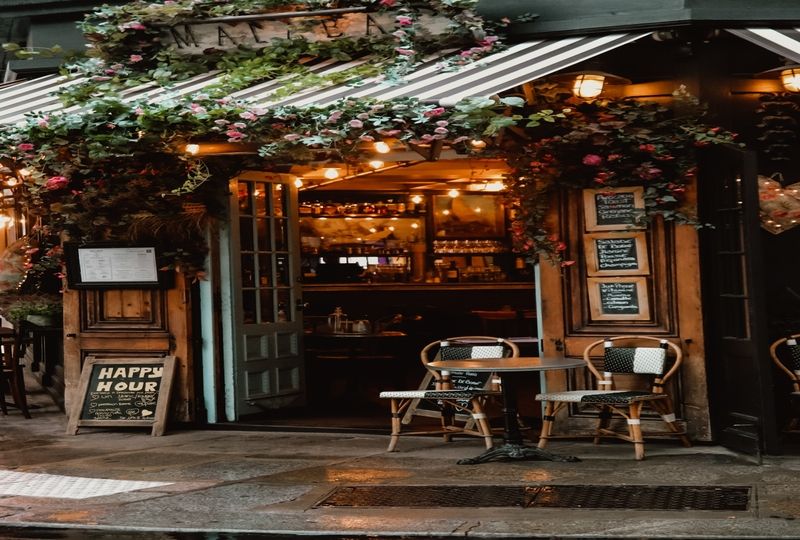
Food And Ordering In Restaurant In France
Home to one of the most popular cuisines, France will surely make your mouth water with its myriad choice of cheese and pastries, not to forget its unique dishes! However, most menus are not offered in the English language, so a few basic culinary vocabulary will make your dining experience more fun. Moreover, you can also learn french by following french recipes yourself!
Le menu, s’il vous plaît : The menu, please.
Quels sont les plats du jour : What are today's specials?
Je suis allergique à ... : I'm allergic to ...
Options végétariennes : Vegetarian options
Je prendrai : I'd like
L’addition : The bill
Est-ce que le service est compris? : Is the tip included? You should remember that tipping is not a common practice in many restaurants.
C’est trop bon! : This is so good!
Le Pain : Bread
Un Fromage : Cheese
La viande : Meat
Drinks Words In French
La carte des vins, s’il vous plaît : The wine menu, please.
Un verre de vin : A glass of wine You cannot visit France and not try a wine collection!
Du thé : Tea
Un café : a coffee
Une bière : a beer
Du jus de fruit : Some fruit juice
De l’eau : Some water
Boisson pétillante : Fizzy drink

Money Terms In French
If you are travelling to France, you are bound to use some euros to enjoy your stay. What better way to start understanding money terms in french than now!
Billet d'argent : Notes
La monnaie : Coins
Combien ça coûte? : How much does this cost?
Je voudrais payer en liquide : I would like to pay in cash.
Acceptez-vous les cartes? : Do you accept cards? It is important that you inquire before paying as many small restaurants do not accept cards. It is also a wiser option to carry cash with you.
Je vous dois combien? : How much do I owe you?
C'est trop cher : It is too expensive
La banque : The bank
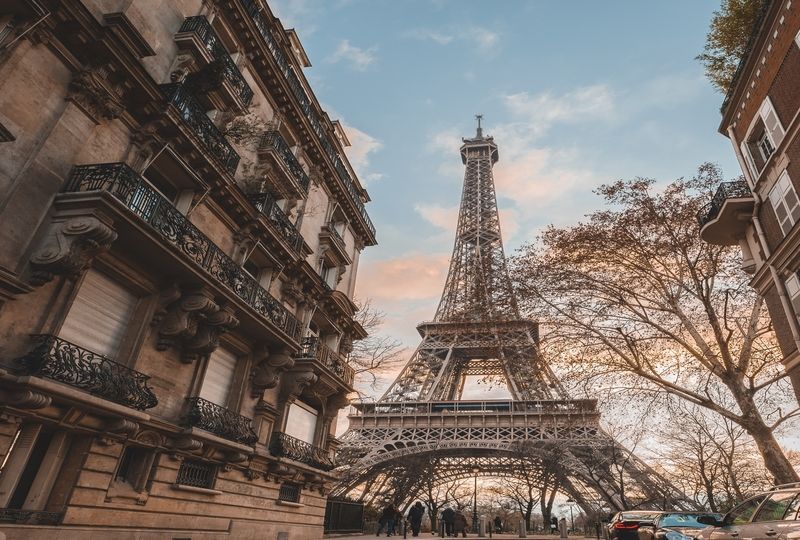
Best Places You Need To Visit In France
A vacation to France will keep you busy with all the wonderful activities available.
Since you made it this far, we added 5 more beautiful places to visit in France along with their gorgeous names.
La tour Eiffel : The Eiffel tower One of the must-see locations in France is surely the Eiffel Tower , a real and amazing structural masterpiece. You can mount the Tower and look down on beautiful Paris.
Bordeaux : Bordeaux If you are a wine enthusiast, you may tour the winery in Bordeaux , which is also a city full of history and art.
Le Musée du Louvre : Louvre museum The Louvre, which houses the Mona Lisa, has some of the most renowned works of art in contemporary history.
La Cathédrale Notre-Dame de Paris : Notre-Dame de Paris cathedral Notre Dame Cathedral is a Gothic architectural marvel and one of the most amazing tourist sites you should see.
La plage de Saint-Tropez : Saint-Tropez beach You may also choose between the captivating beaches of Saint-Tropez and the ski resorts of Chamonix , or you can simply do both.
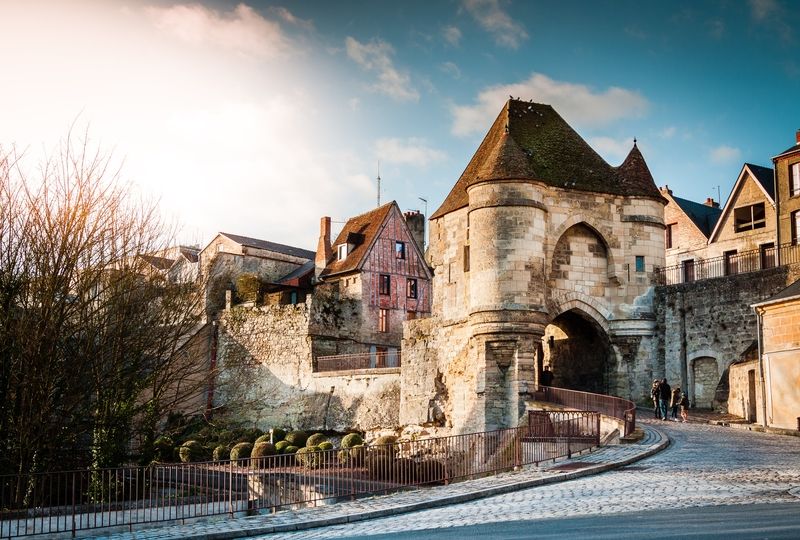
Now, Up To You To Practice You French!
Now that you have an idea of what le français consists of, it is time for you to practice saying these words. You can also improve your french with the tools that Speechling provides.
Remember as many as you can to make the most of your next trip to France!
Speechling is a nonprofit app and website that combines human coaching with technology to improve your foreign language speaking.

French Travel Phrases: Your Survival Kit for Smooth Trips

If you’re reading this, you already know why you want to travel to France, be it the beauty and diversity of its landscapes, the appeal of its cuisine, or its wealth of history. But you may find yourself in need of helpful French travel phrases, and fast!
As a travel destination, France is notorious for a reason and it will delight the casual beach-goers and culture vultures alike. But to be fair, it’s not the cheapest travel destination and the language barrier can be challenging. Even though the number of English speakers has been rising rapidly over recent years, we’re still lagging behind most of our European neighbors. Even in the most touristic spots, you might bump into a waiter, a taxi driver, or a ticket seller who doesn’t speak anything but French.
This is where our French travel phrases will come in handy!
In this guide, you’ll find everything you need to travel around France, from the basic daily words to specific topics such as transportation, restaurants, hotels, and much more. You’ll also find more French travel tips to help you find your way around your new favorite country with these key French travel phrases!
Without further ado, let’s move on to our list of French travel phrases.
Table of Contents
- Survival Basics: Simple French Travel Phrases
- Lost in Translation
- Moving Around
- Hotel / Hostel
- Restaurants
- Asking for Directions
- Emergencies
- How FrenchPod101 Can Help You Learn More French Vocabulary

Arras, in the “Hauts-de-France” region.
1. Survival Basics: Simple French Travel Phrases
In this chapter, I gathered a list of basic French travel phrases and words that can prove useful in most encounters in France. These French phrases for travel are just what you need to get started on your journey here. Later on, we’ll examine more specific scenarios and make sure you’re well-equipped for anything that could come your way! You’ll certainly be glad to know this survival French for travelers!
1- Being Polite
As I’ve mentioned in other articles, France invented the word “ étiquette ” and is still a place where courtesy matters…a lot. I’m not saying all French behave like white knights of exquisite politeness, but knowing how to greet and thank your French hosts and friends will take you a long way, while doing so in their language makes you instantly more likable.
These are just the ten most useful phrases. To read more on this topic or to practice some of these French travel phrases with pronunciation, please have a look at the following resources on FrenchPod101 :
- How to Say Hello in French
- Vocabulary List: Common Ways to Say Hello
- How to Introduce Yourself
- Vocabulary List: 10 Lines to Introduce Yourself
2- General Toolkit
Now that you’ve shown your good manners, let’s look at a few more essential French phrases for travellers. Here are some common words and expressions to gracefully make your way through France.
This is a small sample of the most common general phrases. You can find out more on our List of 24 Key Phrases with audio recordings, on FrenchPod101 .
2. Lost in Translation
Even if you’re well-prepared and almost fluent, there will be times when your interlocutor doesn’t make sense to you, and you’ll have to make them repeat. Heck, even as a native speaker, I’m helpless with the thickest cases of southern French accents! So just know that even knowing the best French travel phrases won’t always save you from the awkwardness of asking someone to repeat what they said.
It’s perfectly fine to ask someone to talk slower, repeat themselves, or rephrase what they were saying. Most French people will be happy to see you putting in the effort and will help you understand.

Je ne comprends pas ( “I don’t understand” )
3. Shopping
From the sparkling fancy boutiques of the Champs-Elysées to the dusty antiques of a typical Brocante (“Garage sale”), from the sprawling suburban malls to the modest Bouquinistes ( “Book sellers” ) along the Seine river, France caters for all tastes and budgets.
French shopping is usually a painless experience: Prices are displayed almost everywhere and credit cards are widely accepted, even in small bakeries or convenience stores. We don’t do five hours of siesta in the middle of the day, and unless you’re strolling around the Eiffel Tower in the crowd of souvenir sellers who won’t let you leave without a dozen dust collectors, shop owners aren’t likely to jump on you.
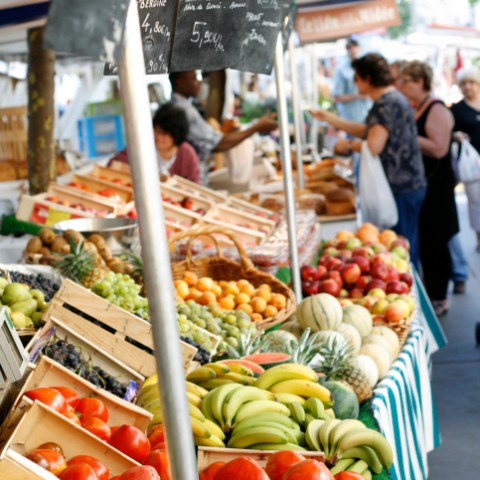
Le marché ( “The market” )
For more shopping words, check out our free Shopping vocabulary list .
While shopping in France, you’ll also need to know how to handle prices or quantities. Make sure to read my previous article about French Numbers: From 0 to Infinity, and Beyond and the complementary vocabulary list .
4. Moving Around
No list of basic French phrases for tourists would be complete without information on talking about your ride. Whether you travel by bus, train, taxi, or plane, you need to be able to ask your way around, inquire about the timetables and details of the trip, navigate until you board the correct ride, and figure out when to get off.
Here are the most popular ways to move around France:
- Le train ( “Train” ) This is the fastest, most comfortable, and usually most scenic way to travel from one city to another. However, compared to buses, it can be pretty expensive, especially when booked at the last minute . Although locals will often complain of the trains being late or canceled, our national network is actually pretty strong and reliable compared to those of some of our close neighbors.
- Le bus intercité ( “Intercity bus” ) Bus travel has been developing rapidly in recent years and offers cheap prices to compete with the train and car sharing services. For instance, you can book an overnight trip from Paris to Nice for 28€ while a train on the same date would be around 60€.
- Moving around the city with Les transports en commun (“The public transport”): Bus , Métro , or Tram ( “Bus,metro, or Tramway” ) The subterranean metro or Trams are only available in big cities, but you can always move around with a local bus. Without the monthly or annual card, individual trips can be purchased for around 2€ in the metro or tram station, or directly on the bus.
- Le taxi ( “Taxi” ) is the expensive alternative to public transportation that you only want to take when you’re going to the airport in the middle of the night or going back home dead drunk after an intense night out.
- Questionable business practices aside, Uber is a much cheaper and more convenient substitute to taxis, and it’s well-developed in France.
- L’avion ( “Plane” ) Keeping in mind the dire environmental cost, traveling by plane is by far the fastest way to cover long distances and the prices of the Billets d’avion ( “Plane tickets” ) have continued to drop steadily over the years. Prices are especially low if you can book around a month in advance.
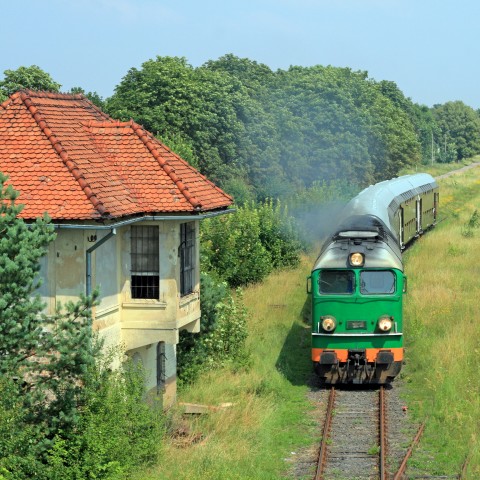
Le train ( “The train” )
Now, where do you want to go?
Then, using your brand new words, find your way there:
Now, you have to ask the right questions before buying your tickets:
Personally, I don’t see why anyone would go to Dunkerque, but I’ll let you be the judge of that (or rather don’t!).
And finally, you’ll just have to figure out where your ride is leaving from and when you should get off:
To learn more vocabulary about transportation, please check out our lists of vocabulary for Airplanes , Bus or Train Stations , and Crossing Borders .
5. Hotel / Hostel

As the most visited country in the world (nothing wrong with a bit of bragging!), France has no shortage of accommodation of all shapes, sizes, and prices. You’re not likely to run out of options when looking for a place to spend the night. But you may still want a couple of French travel tips and phrases regarding your stay.
Prices vary greatly depending on the season and proximity to the tourist attractions, but considering the quality of the transport network all over the country, it’s usually fine to sleep outside of the city center.
While the Gîtes ruraux (“Rural houses” used as vacation rentals) and Chambres d’hôte ( “Bed & Breakfast” ) are popular choices among locals for their summer vacations, the most common options are still L’hôtel ( “The hotel” ) and its budget version, L’auberge de jeunesse (“The hostel” or “Youth hostel”).
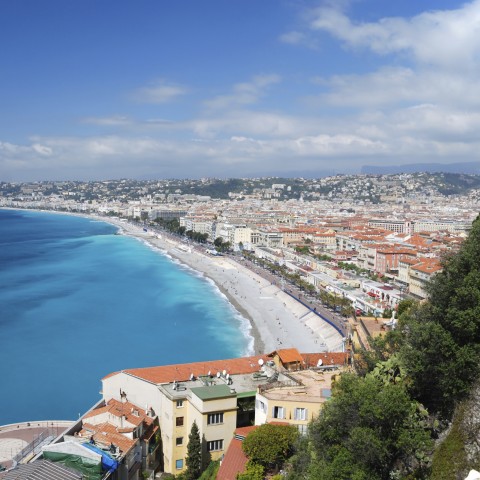
Nice, on the Mediterranean coast.
Most visitors in France will book their room through the usual Booking.com or HostelWorld , but there are times when you just want to stroll around and find the perfect place all by yourself. Here’s how to ask for a room in French:
Next step: you probably have some questions about the room.
6. Restaurants

You’ve found a nice room with a convenient location in this cute family-run hostel. You’ve dropped your bags and are now ready for more adventures. But wait, what’s that sound? Is that the infamous Beast of Gevaudan or your growling stomach?
If there’s one thing France is acclaimed for, it has to be the food! Good food is at the heart of our friends, family, and even business meetings; alongside wine, it stands as the cornerstone of our philosophy of Art de vivre (“The Art of Living”).
Some people imagine French meals as fancy and snobbish, but this is mostly untrue. From the biggest cities to the tiniest towns, you can always find a good Brasserie ( Literally “Brewery” ) to serve you a generous portion of typical and unpretentious food such as Cassoulet (A mixture of white beans and sausage simmered in goose fat), Steak au poivre (“Pepper steak”), or Tartare de boeuf (“Beef tartare”), served with a glass of Beaujolais .
Many restaurants have the menu displayed outside, which is really convenient if you want to quietly check your options before entering. When they don’t, you can simply ask for it before sitting; if you don’t like what you see, just give it back, thank them politely, and leave.
Otherwise, if you like what they offer, go ahead! Most restaurants will take you to a table, while simple Brasseries , Pubs, or fast food places will let you seat yourself.
1- How to Order Drinks
Before you order the food, the first question you’ll usually hear is:
- Voulez-vous boire quelque chose ? ( “Do you want something to drink?” )
- Voulez-vous commander quelque chose à boire ? ( “Would you like to order a drink?” )
It’s worth noting that when you order a meal, water is always free in France (we have a law explicitly stating it). I’m talking simple tap water in a pitcher, and not sophisticated bottled sparkling water, but this is an amazing feature of French restaurants, especially if you’re on a budget! And you can get refills.
To ask for your free water, don’t just ask for water; sneaky waiters could take your order as mineral water and charge you for it. Instead, use this phrase:
The important word here is Carafe (“Jug”), as it differentiates this from a paid order of mineral water. Also, don’t worry: water is properly filtered all over the country and it’s always fine to drink from the tap.
Oh, and you know what else is always free? Delicious French bread!
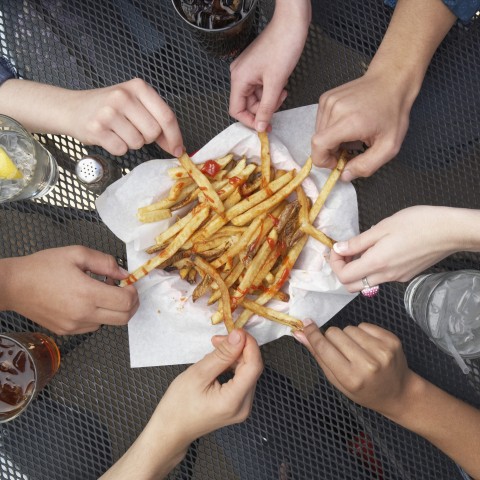
Did you know that French Fries are not French?
2- How to Order Food
Alright, now, let’s get some food on this table!
If you have any specific diet or allergy, it’s probably best to start with this:
And here’s how to order something from the menu:
Your stomach has stopped growling, your belly’s full of French delicacies, and your mind is at peace. It’s time to thank the chef and ask for the bill:
You can find more vocabulary and practice your pronunciation with our vocabulary list on Restaurants and key phrases for restaurants .
7. Asking for Directions
As Mandy Hale says, “Sometimes when you lose your way, you find yourself.” But sometimes, you just get severely frustrated and waste your day trying to reach this freaking museum your GPS keeps making you circle around.
One way or another, you’ll always end up relying on the help of locals to reach well-concealed destinations. Let’s start with the most common questions:

Je suis perdu. ( “I am lost.” )
As I often noticed while traveling, asking for directions is always the easy part, but making anything of the other person’s answer can prove much more challenging. Here are some examples of the answers you could receive:
To understand these kinds of instructions, it all comes down to knowing the right keywords, such as Droite (“Right”), Gauche (“Left”), En face (“In front”), Tout droit (“Straight”), and a few others.
Check out our lists of vocabulary for Position Words and Direction Words on FrenchPod101 to learn more about this.
And here’s more vocabulary and recordings about Key Places in Town , as well as the French Tourist Attractions .
8. Emergencies
In case of an emergency, you don’t want the language to get in the way of you and the help you need. Let’s have a look at the main emergency words (which may just be the most important French travel phrases when you need them) and how to use them.
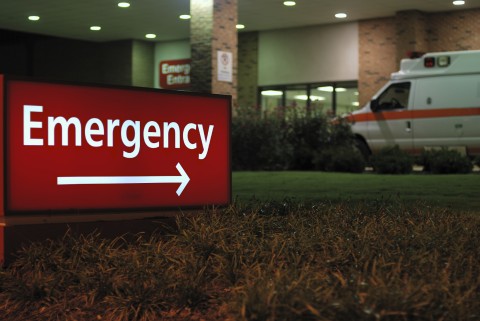
C’est une urgence ! ( “It’s an emergency!” )
For more words on this topic, make sure to visit our free list of vocabulary about The Words and Phrases to Help You if You are in an Emergency .
If you’re in need of medical assistance, you’ll be glad to know about the Common Health Problems and some basic vocabulary about Medicine .
9. How FrenchPod101 Can Help You Learn More French Vocabulary
French travel phrases in language learning are so important, and in this guide, you’ve learned a LOT of French travel phrases. I hope it wasn’t too overwhelming! Using these travel phrases to learn French will surely benefit you, but you don’t have to remember them all, as long as you keep these phrases accessible in a notebook or on your phone.
Did I forget any important words or expressions? Are you ready to get out there and ask locals about your travel needs?
Make sure to explore FrenchPod101 , as it has plenty of free resources for you to practice your grammar and learn new words. The vocabulary lists are also a great way to revise and listen to the words. And you’re in luck, because we have tons of lists about traveling:
- Top 30 Travel Phrases
- Most Useful Verbs for Traveling
- Travel and Traveling general lists
- Vocabulary for Nationalities
- Summer Vacation Phrases
- Words for the Beach
- Winter and Snow Vocabulary
Remember that you can also use our premium service, MyTeacher , to get personal one-on-one coaching. Practice creating French travel phrases with your private teacher so they can give you personalized feedback and advice, or record them for you, so you learn the correct pronunciation.
About the Author: Born and bred in the rainy north of France, Cyril Danon has been bouncing off various jobs before he left everything behind to wander around the wonders of the World. Now, after quenching his wanderlust for the last few years, he’s eager to share his passion for languages.
Or sign up using Facebook
Got an account? Sign in here

How To Say ‘Thank you’ in French

How to Say “Hello” in French: Break the Ice Like a Pro!

How to Say I Love You in French – Romantic Word List

The French National Anthem: La Marseillaise

60 Classroom Phrases for Studying or Teaching in France
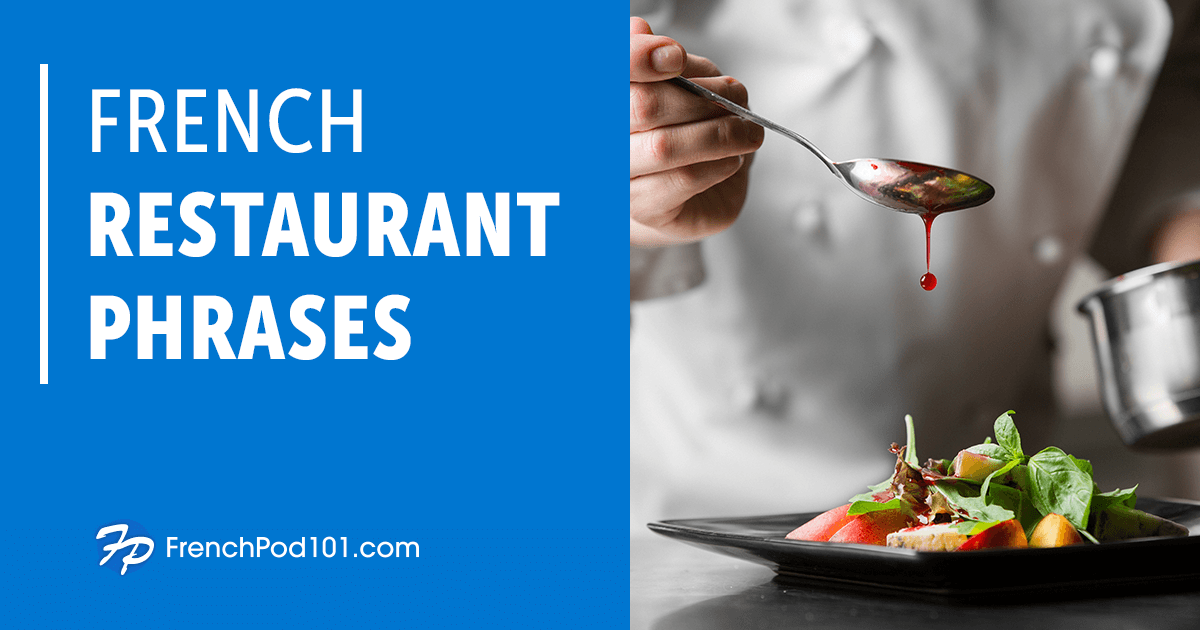
The Only Guide to French Restaurant Phrases You’ll Ever Need
How to celebrate april fools’ day in french.
- Forum Spotlight
- French Bazaar!!
- French Holidays
- French Language
- French Translation
- Scheduled Maintenance
- Guest Bloggers
- Advanced French
- French Grammar
- French Phrases
- French Podcasts
- French Words
- Tips & Techniques
- Media Coverage
- Feature Spotlight
- Success Stories
- Teaching French
- Team FrenchPod101
- Twitter Lessons
- Uncategorized
- Word of the Day
- Immigration, Visas
Copyright © 2024 Innovative Language Learning. All rights reserved. FrenchPod101.com Privacy Policy | Terms of Use . This site is protected by reCAPTCHA and the Google Privacy Policy and Terms of Service apply.

French Travel Phrases
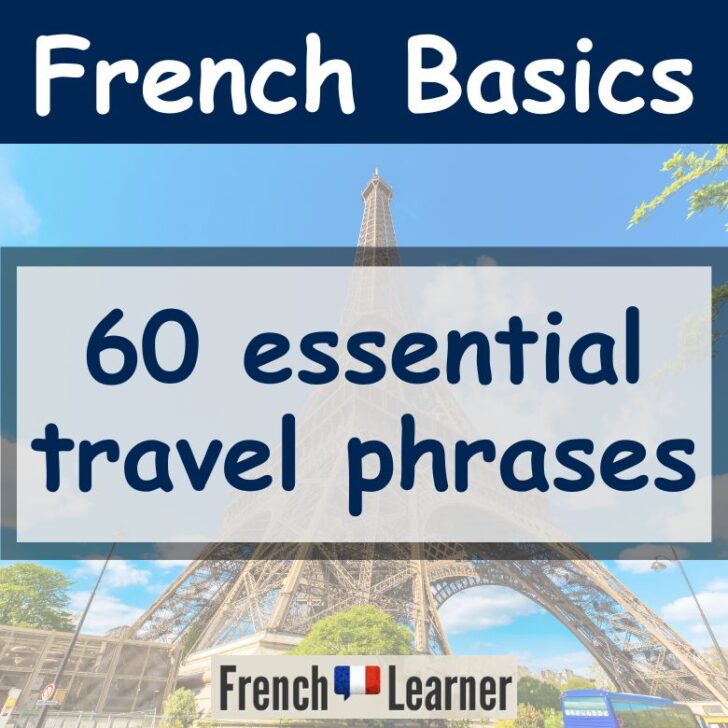
The most essential French travel phrases are Bonjour (hello), au revoir (goodbye), Où est? (Where is), C’est combien? (How much is it?) and l’addition s’il vous plaît (the check, please). This page covers over 60+ useful words and phrases which you can use on a trip to France.
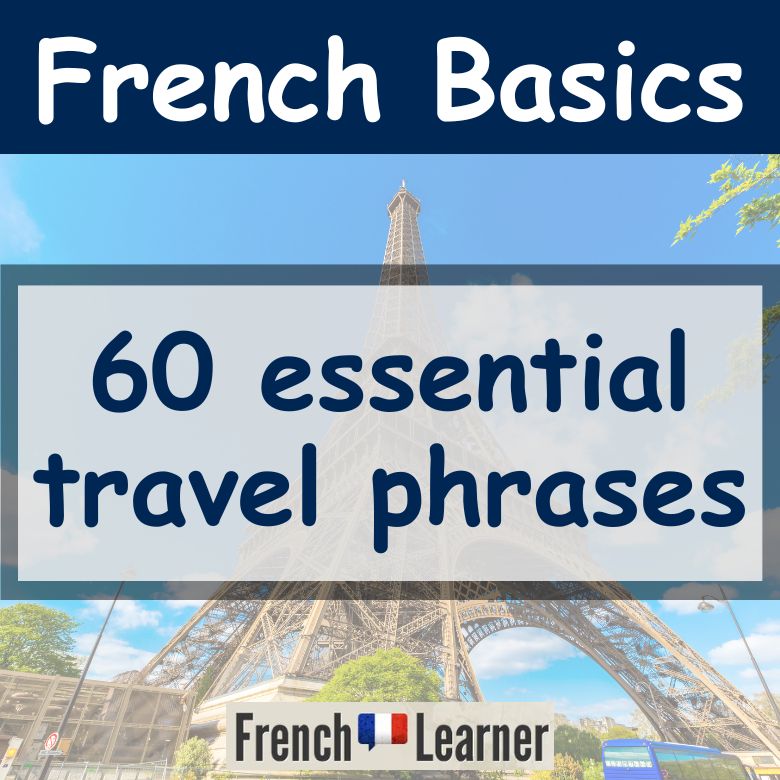
French Greetings
If you are going to France it is very important to learn the basic greetings. While you might not speak French fluently just yet, the French people will really appreciate your trying to make an effort.
- Bonjour Hello, good morning, good day
- Au revoir Goodbye
- Salut Hi/bye (informal)
- Merci! Thank you!
- Merci beaucoup! Thank you very much!
- Ça va? How are you? How’s it going? (informal)
- Bien, merci! Fine, thank you!
- S’il vous plaît Please
- De rien You’re welcome
- Enchanté! Nice to meet you!
This page on our site covers French greetings in detail.
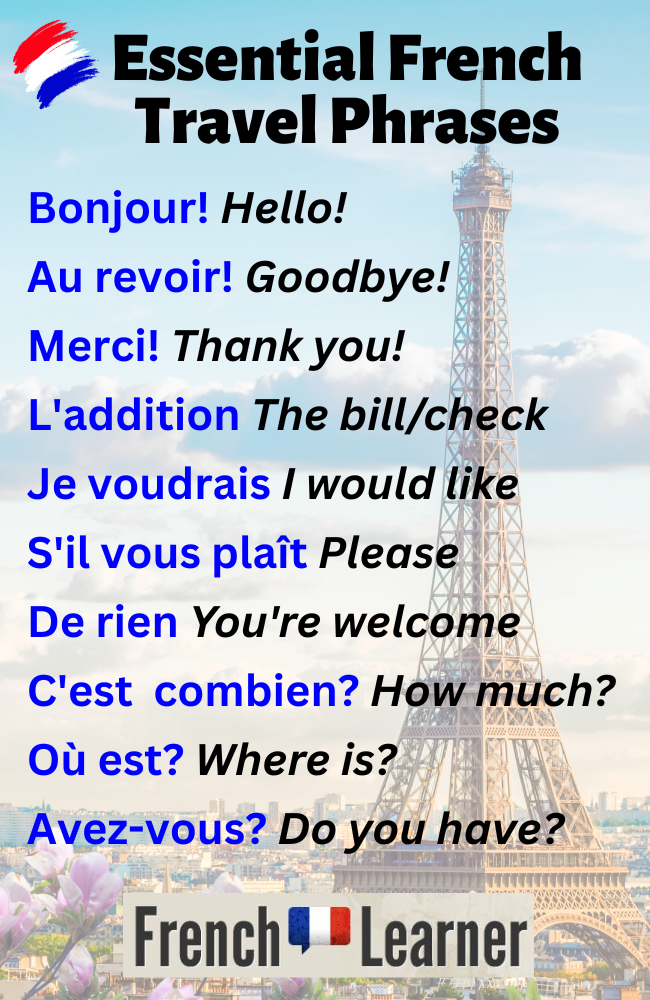
Asking directions
When asking directions in France, it’s very important that you know a few basic words. This page on our site covers asking directions in detail.
- Où est…? Where is…?
- Où est la gare? Where’s the train station?
- Où est la gare routière? Where’s the bus station?
- Où sont les toilettes? Where’s the restroom?
- Où est la banque? Where’ the bank?
- Où est un bureau de change? Where’s a exchange counter?
- Je suis perdu I’m lost
- Le plan city map
Asking for things
On your trip you’ll inevitably need to ask for things. This short list of words is a very good start. Learning the verb vouloir is a good idea as it means “to want”.
- Je veux (slightly informal)
- Je voudrais I would like
- Donnez-moi Give me
- Avez-vous? Do you have?
- Auriez-vous Would you happen to have?
- Qu’est-ce que c’est? What is it?
- Nous avons We have
- Nous n’avons pas We don’t have
- C’est disponible It’s available
Restaurant phrases
One of the best places to try practicing speaking French is a restaurant. Here’s a short list of words in phrases you may use. This page on our site offers a very comprehensive list of restaurant vocabulary . In addition, this page on our site covers food vocabulary and this page covers beverage vocabulary.
- Une table pour deux, s’il vous plaît A table for two, please
- Je prends I’ll have (from the verb prendre , to take)
- La carte menu
- La soupe soup
- La salade salad
- L’entrée appetizer
- Le dessert dessert
- La boisson beverage
- Le vin rouge red wine
- Le vin blanc white wine
- La a bière beer
- Le café coffee
Taxi/Uber phrases
If you find yourself in a taxi or Uber, some of the the following phrases should come in very handy.
- Je vais à I’m going to
- Je descends ici I’ll get off here
- Voici l’adresse Here’s the address
- Allez tout droit Keep going straight
- Tournez à gauche Take a left
- Tournez à droite Take a right
Hotel phrases
The following is a short list of words and phrases that you can use in your hotel. While most hotel staff speak basic English, it’s still nice to know these words in French.
- L’hôtel hotel
- Une chambre à deux double room
- Un grand lit Double bed
- La réception Check-in desk
- Quitter la chambre To check out
- La piscine swimming pool
- Le petit déjeuner compris Breakfast included
- Réserver une chambre To reserve a room
Miscellaneous words and phrases
The following is a list of miscellaneous French words and phrases which we feel are essential for a trip to France and belong on this list.
- Je voudrais louer une voiture. I’d like rent a car.
- Je voudrais acheter un billet. I’d like to buy a ticket.
- Un billet aller-retour Round-trip ticket
- L’aller simple One-way ticket
- Le passeport passport
- Les vacances vacation
- Je voudrais annuler. I’d like to cancel.
- Un voyage A trip
- Bon voyage! Enjoy your trip!
- Bon séjour! Enjoy your stay!
Further your learning We feel that it’s a great idea to carry a French phrase book while traveling in France. Most phrase books on the market won’t show you how to actually say the phrases. For an audio option, check out French Today’s Modern French Audio Phrasebook !
Discover more:
- Ways to say “thank you” in French
- How to say “hello” in French
- Ways to say “you’re welcome” in French
- Guide to French verbs
- Guide to French vocabulary

Sharing is caring!
Affiliate disclosure: Below you will find affiliate links. If you purchase something after clicking the link, we will receive a small commission. To learn more please visit our full disclosure page . Merci!

Read our full review of À Moi Paris and find out why we love it so much!

Read our full review of French Verb Drills and find out why we recommend this course!
David Issokson
David Issokson is a lifelong language enthusiast. His head is swimming with words and sounds as he speaks over six languages. Of all the languages he speaks, he's the most passionate about French! David has helped hundreds of students to improve their French in his private online lessons. When procrastinating working on his site, FrenchLearner.com, David enjoys his time skiing and hiking in Teton Valley, Idaho.
See all posts by David Issokson
Get my newsletter plus a FREE guide of DOs & DON'Ts for tourists!
Oui In France
50+ Basic French words and phrases for travel to France (with pronunciation)
French language · travel
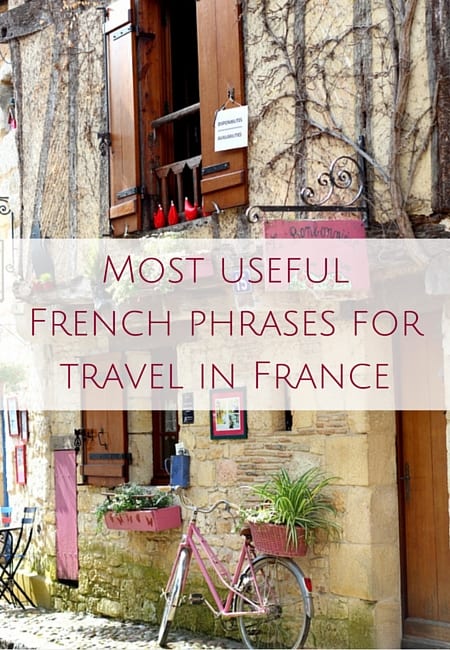
When traveling to a country where your native tongue isn’t spoken, the language barrier can be a major hurdle. Two of the most frustrating things are expressing yourself as well as not understanding what is being said to you. A relaxing, stress-free trip can get very stressful when you’re not able to communicate.
To help you out, I’ve put together some of the most common French words and phrases for travel to France — with audio, of course (thanks Tom!) because pronunciation is everything.
GO read my basic French words and phrases for travel
Basic French words and phrases with pronunciation for your France trip

Even the most talkative and friendly traveler can be silenced when one’s lexicon in the local language is nonexistent. Don’t let that be you and learn my basic French words and phrases before you go!
First, a quick primer on French etiquette. Before approaching a stranger and asking them a question, always start with a “Bonjour” at a bare minimum. Bonjour really is a magic word in France and I explain why here. It’s probably best to throw in “Excusez-moi” too.
If you’re interrupting someone who is busy working, eating or otherwise unavailable, it’s best to be extra polite and say “Bonjour, desolé de vous déranger mais…” (Hi, sorry to bother you but…) and then ask your question.
After the person has attempted to help, be sure to thank them with a “Merci, beaucoup, bonne journée!” Trust me, politeness goes a long way and these basic French words and phrases will come in handy.
Below I’ve used all formal/polite (vous) forms of phrases and questions.
Regarding my list of basic French words and phrases, this is by no means a comprehensive list and is just a starting off point. Write ’em down, learn ’em and keep ’em in your back pocket for when the perfect situation arises. Then show off your French skills like a boss. Or at least be happy someone understood you!
Click the triangle icon under all of my French phrases for travel for the audio (me saying the word in English and Tom saying the French equivalent) — because what good are travel phrases in a foreign language if you have no idea how they’re supposed to sound?
Tourists in France: Why a little bit of effort with French goes a long way >>
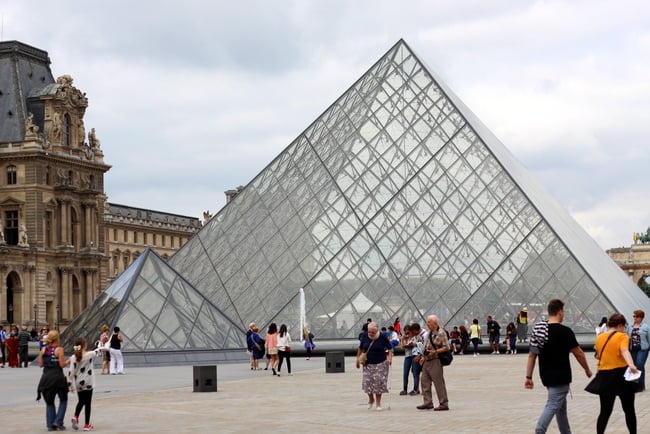
Basic French words and phrases for travel with pronunciation
Hello / Bonjour
Goodbye / Au revoir
Thank you / Merci
Sorry / Désolé(e)
You’re welcome / Je vous en prie (or De rien)
Excuse me /Excusez-moi
Do you speak English? / Parlez-vous anglais ?
I don’t speak French / Je ne parle pas français
Could you please speak more slowly? / Pourriez-vous parler plus lentement s’il vous plaît ?
Where is the restroom? / Où sont les toilettes ?
What time is it? / Quelle heure est-il ?
I’d like… / Je voudrais…
45 Things an American in France thinks when visiting for the first time >>
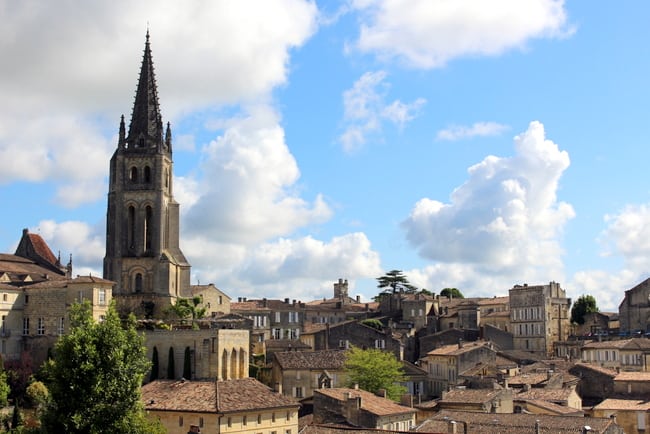
When traveling in France
Where is (gate 42)…? / Où est la porte d’embarquement 42 ?
I am on the train / Je suis dans le train
I need to change my reservation / Je dois changer ma réservation (mon billet)
We are going to be late (early) / Nous allons être en retard (en avance)
We arrive at 10 o’clock / Nous arrivons à 10 heures
What time are we arriving? / A quelle heure arrivons-nous ?
I need a taxi / J’ai besoin d’un taxi (Je dois prendre un taxi)
Where is the train station? / Où est la gare ?
Where is the airport? / Où est l’aéroport ?
To the train station (airport) please! / A la gare (l’aéroport) s’il vous plaît !
Go right / left / straight / Allez (prenez) à droite/à gauche/tout droit
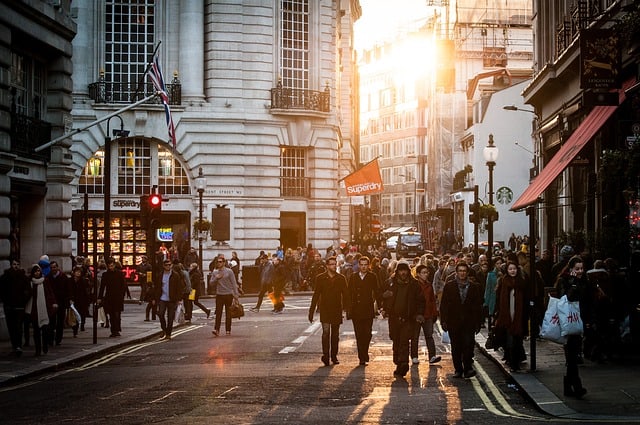
When shopping in France
How much is… ? / Combien coûte… ?
It’s too big / C’est trop gros
It’s too small / C’est trop petit
I like it / J’aime ça
I don’t like it / Je n’aime pas ça
Do you have these in size 39? / Est-ce que vous les avez en 39 ?
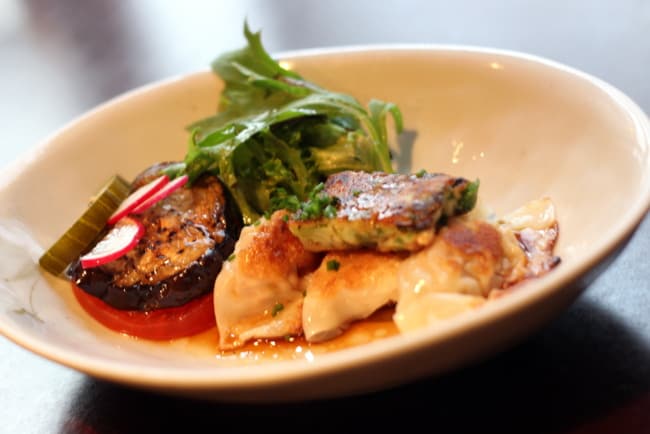
When at a restaurant in France
To go / A emporter
We’d like a table for 2 please / Une table pour deux s’il vous plait (Nous voudrions une table pour deux s’il vous plait)
Do you have a menu in English? / Avez-vous un menu en Anglais ?
I’d like another glass of wine please! / Je voudrais un autre verre de vin s’il vous plaît !
I’m allergic to dairy. Is there any in this dish? / Je suis allergique aux produits laitiers. Est-ce qu’il y en a dans ce plat ?
It was excellent! / C’était excellent (délicieux)
Check, please! / L’addition, s’il vous plait !
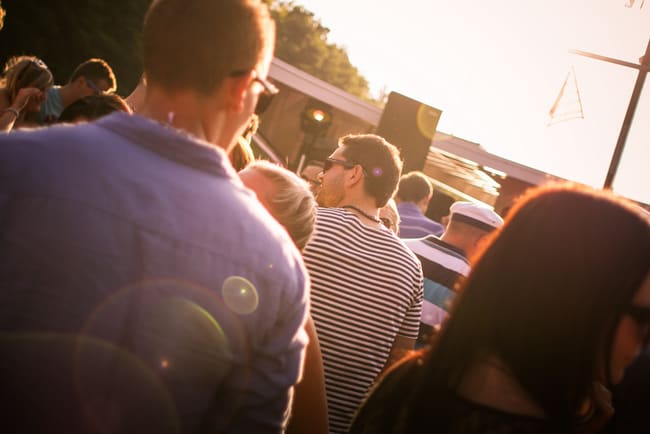
When socializing in France
Hey! (also “see ya”, when leaving) / Salut !
How are you? / Comment allez-vous ? (Comment vas-tu ? / Comment ça va ?)
What’s up? / Quoi de neuf ?
Where are you from? / D’où venez-vous ? (d’ou viens-tu ?)
I’m from the United States / Je viens des Etats-Unis
I’m American / Je suis américain(e)
Are you hungry? / Est-ce que vous avez faim ? (est-ce que tu as faim ?)
Want to grab a drink? / Vous voulez prendre un verre ? (tu veux prendre un verre ?)

When you’re sick in France
I am sick / Je suis malade
My head hurts / J’ai mal à la tête
I’m nauseous / J’ai la nausée (j’ai mal au coeur)
I vomited / J’ai vomi
I need to see a doctor / J’ai besoin de voir un médecin (Je dois voir un médecin)
I need to go to the hospital / Je dois aller à l’hôpital
Call an ambulance! / Appelez une ambulance ! (Appelle une ambulance !)
Where is the pharmacy? / Où est la pharmacie ?
Help me please /Aidez-moi, s’il vous plait !/ Au secours!
With a little practice, your ability to bust out these basic French words and phrases will skyrocket the next time you’re speaking to a French person. So get to it! Anything you’d like to add? Talk to me in the comments about the most common French words for travel!
If you found my list of basic French words and phrases for travel helpful, would you mind sharing please?
PIN my basic French words for travel POST:
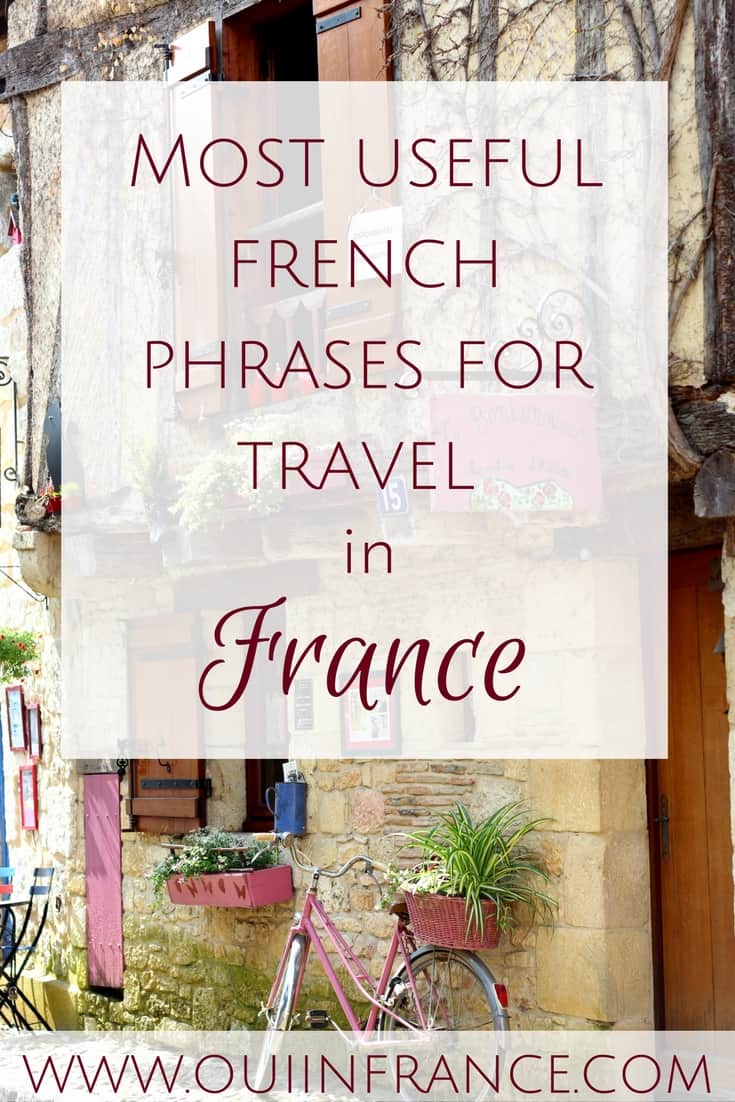
You might like

Sign up for the Oui In France Newsletter!
Stay up to date with everything Oui In France! Plus get my FREE GUIDE with 24 DOs & DON'Ts to keep in mind when visiting France!
January 4, 2016 at 5:11 pm
Great post Diane and good advice about interrupting someone. Last year in SuperU I asked an assistant (who was stacking shelves) where the batteries were. I started with ‘Excusez-moi Monsieur’ (at home I would just say ‘excuse me’ ) He very pointedly replied with ‘Bonjour Madame’, I felt very rude and now try to remember to always use Bonjour before an enquiry.
January 4, 2016 at 7:39 pm
Thank you! Yes, so true about the bonjour before saying anything else. I think sometimes people can be very goal focused — get the answer to your question and move on. But in France it seems like kids are taught that politeness is obligatory so I’m sure Americans launching right into a question can seem off-putting. Sometimes I forget the bonjour and right away I realize my error, so I kind of fake cough and say it again haha.
January 4, 2016 at 7:55 pm
Love your blog. Today was great! Your husband did a great job of taking words apart to hear.
January 5, 2016 at 6:31 am
Thank you, so glad you enjoyed it, and I’ll let Tom know! He was nervous recording everything!
January 5, 2016 at 2:49 am
Thank you I found this to be interesting
January 5, 2016 at 6:32 am
Great to hear, thanks so much!
January 6, 2016 at 4:21 pm
This was one of your best so far! Like having a mini translator guide with audio. Well done!
January 12, 2016 at 8:12 pm
Thank you, glad you found it useful!
January 11, 2016 at 12:14 pm
Starting with “bonjour” is just about the most important tip for any interaction with a stranger in French. A really useful post Diane, thanks for linking to #AllAboutFrance
January 12, 2016 at 8:13 pm
Yup, I always tell people even if you don’t know any other words or are too embarrassed to try, ALWAYS start any interaction with bonjour. Makes a good first impression! Thanks for hosting the linkup!
January 11, 2016 at 12:54 pm
Very helpful. Merci Beaucoup!!
You’re very welcome!
January 12, 2016 at 7:35 pm
What a handy tool! This is so easy to use — a great brush up before a trip to France!
Thank you for checking out the post. So glad you found it useful!
January 17, 2016 at 5:29 am
This is great and so useful! Bises from #allaboutfrance
December 12, 2016 at 4:28 pm
French are known for their lack of patience and quick exasperation, but if you know the right words to approach them you’re off with a positive and happy response. As you have mentioned above, Politeness is the #1 rule. Great post, should come in handy for many foreign travelers in France!
December 12, 2016 at 4:32 pm
Thanks so much, Frederic! I hope you’ll consider sharing this post on your FB page. I’m sure your community would find it helpful. 😉
May 7, 2018 at 11:05 am
Hey guys I was on Reunion Island where I took french courses at DP Langues and I really recommand it my experience there was amazing ! Cheers
June 20, 2018 at 2:32 am
Merci beaucoup! So helpful!
January 21, 2022 at 2:50 am
Stumbled across this post on Pinterest—a great summary! I’m requiring my kids to learn a little French before their first trip to Paris this summer, and I’ll use this to help. Thanks!
January 21, 2022 at 6:43 am
You’re very welcome! So glad it was helpful!
June 26, 2023 at 7:27 pm
Excellent basic French questions and phrases. I like it when the French guy says the French at a slow pace.
Leave a Reply Cancel reply
Your email address will not be published. Required fields are marked *
Notify me of new posts by email.

As an Amazon Associate I earn from qualifying purchases.
- , November 17, 2022
50+ Basic French Travel Phrases To Use While Abroad

Bienvenue en France! While traveling through this beautiful country, knowing basic French travel phrases is essential to help you get around. Many French people do not speak English, so it’s actually quite necessary to know a bit of French to help make your travels as smooth as possible.
It can be frustrating to travel to a place that does not speak your native language. Still, one part of exploring new places is navigating these difficulties. If you prepare yourself beforehand by learning a few French phrases, you can turn these frustrations into meaningful interactions with local people.
Whether you need to order food from a restaurant, tell your cab driver where you’re headed, or ask French locals general questions, these 30+ travel phrases will help you navigate easily and cement memories to last a lifetime.
Essential French Phrases For Travelers
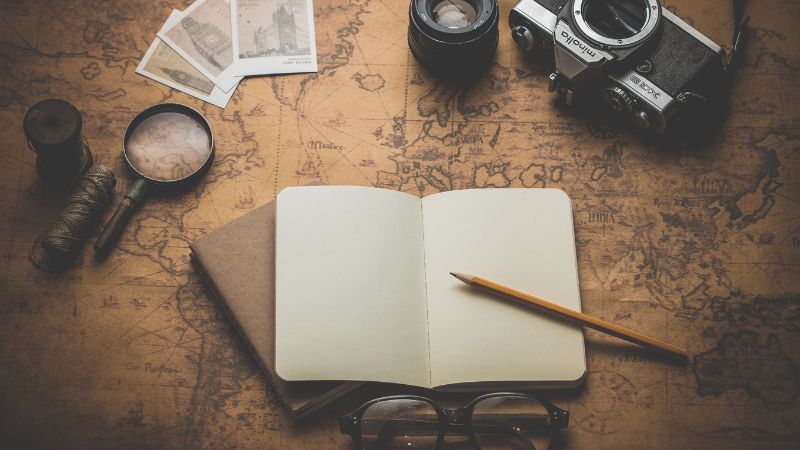
Basic French Phrases For Conversations
These basic words and phrases are the first level of interactions while traveling and probably the words you will use the most in everyday conversations. So pay special attention to them!
These basic words and phrases are the first level of interactions while traveling, and probably the words you will use the most in everyday conversations. So pay special attention to them!
Basic French Phrases For Directions
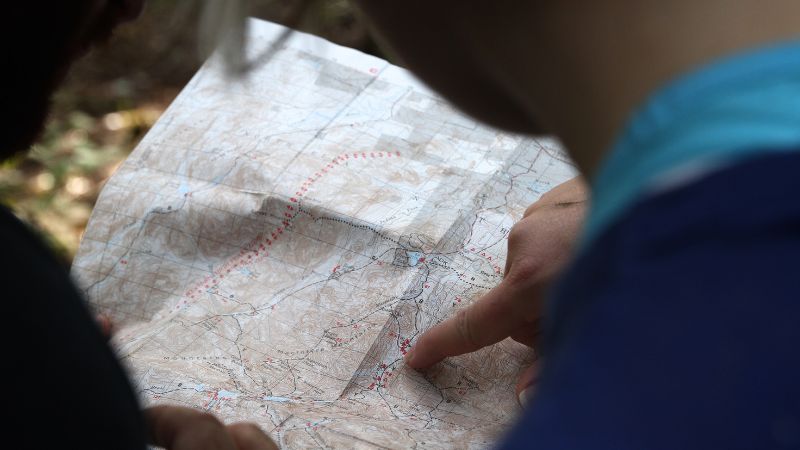
Are you lost in a big city with no phone service? Whip out these basic phrases for directions to get someone to point you in the right direction and save yourself a headache.
Basic French Phrases For Money & Shopping

France is known for its opulent, high-end clothes and style. You’ll definitely be tempted to shop in all the beautiful boutiques, so learn basic phrases for money and shopping. Want to learn more about this topic? Check out Shopping Vocabulary In French: 20+ Useful Phrases & Expressions .
Basic French Phrases For Transportation

France has an excellent public transport system, so you’ll most likely be taking trains and buses while traveling through. These are some phrases to help you get by.
Basic French Phrases For Instruction

These French phrases will help you find the bathroom, the nearest grocery store, or wherever else you need to go. These are easy to pop out while walking or sightseeing, so keep them in mind!
Basic French Phrases For Dining
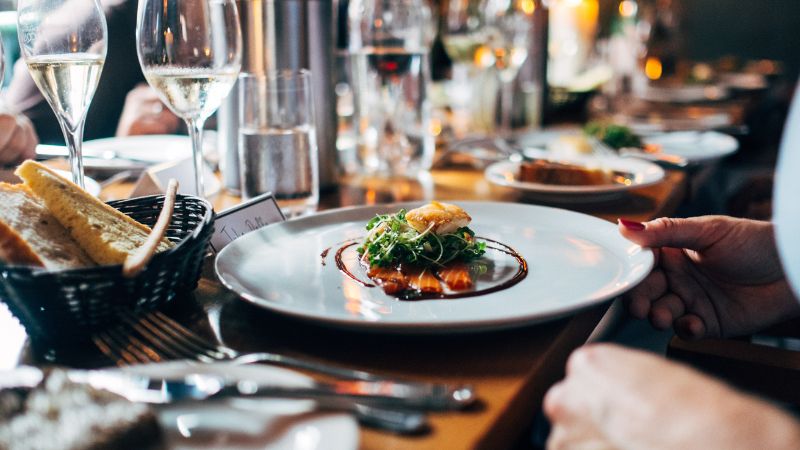
Food is a huge part of French culture, so when you’re fine dining, you’ll definitely want to know some basic phrases to fit in and avoid any awkward situations.
Final Thoughts

Whew! I know that is a lot of information, but take it one category at a time to learn these basic French words and phrases for travelers. Trust me, when you’re in France you’ll want to speak French! Not only is it a beautiful language, but French speakers find it extra respectful when you speak French to them.
Interested in learning more French but need specific, targeted resources? Download the Ling App ! It is a user-friendly language-learning app with games, quizzes, and interactive features proven to help you learn a new language.
You can download it for free on the App Store and Play Store . What are you waiting for? If you start today, you’re one step closer to being prepared for your traverse through France.
Want even more resources? Check out #1 Best Guide: French Vocabulary To Use At The Airport & French .
Leave a Reply Cancel reply
Your email address will not be published. Required fields are marked *
Save my name, email, and website in this browser for the next time I comment.

People also read

No Marathi On Duolingo? The #1 Best App To Use This 2023

No Marathi On Babbel?: 3 Best Resources You Shouldn’t Miss
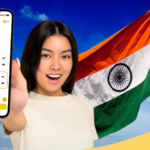
15-Minute Program Makes Learning Marathi Child’s Play
What makes learning with ling special, interactive exercises.
Improve your pronunciation by starting a conversation with our app’s interactive chatbot
Engaging activities
Practice your skills with mini-games and track your progress with fun quizzes
Mix of languages
Choose from over 60 languages, both big and small, and listen to audio from native speakers
Proven results
Backed by linguistic research, our learning methods can help you achieve fluency in record time
Southeast Asia
East europe.
© 2024 Simya Solutions Ltd.
Cyber Monday Sale 70% Off - Start Your Free Trial - LIMITED TIME

Mastering French for Your Next Travel: A Beginner's Guide

Bienvenue , or "welcome", to this quick comprehensive guide to French phrases for everyday life and travel!
We will go over some basic French phrases and the essential French phrases for travel. If you want to learn to speak French, this is an excellent starting point for your foreign language learning journey.
Before we dive into this useful French vocabulary, we will also discuss various ways to learn French at home.
So, if you are planning a trip to France or another French-speaking country, kick-start your learning journey now with our top tips, concise vocab list and notes on French pronunciation.

Learning to Speak French
The process of learning French is made easier when you have the right learning tools in your tool kit. The more learning resources you use, the faster you will progress.
Remember to focus on all four language skills: reading, writing, listening and speaking. If you want to master the French language, all of these skills are essential.
You can sign up for free French courses online and use well-reputed language-learning apps like Lingopie or Duolingo, which you will find as iPhone and Android apps.
Different online courses and apps will focus on different foreign language skills, so try to use more than one in conjunction. On top of that, look for grammar and vocabulary-specific resources, such as YouTube videos, TikToks , Instagram reels and so on.
With the plethora of awesome free or low-cost learning resources at your disposal, learning French has never been easier or more fun!
Another great approach to learning French is to watch French movies and TV shows on Lingopie. This will develop your French language skills and understanding of French culture all while you are entertained.
French immersion in content created by and for native French speakers is invaluable. Download some French TV or music and learn French anytime, anywhere while you go about your everyday life.
You will be speaking French in no time if you use these learning tools for at least ten minutes every day. Remember - the more time you put into your learning, the faster you will progress!
Basic French Phrases
Now that you have read some top tips for learning to speak French quickly, let's break down some essential French phrases for everyday life and travel.
By learning just a few useful French phrases, you can build your confidence, introduce yourself and express your wants and needs in a new language.
So, here are the most useful French words and phrases to learn for beginners!
Bonjour means "hello" in French. Its literal translation is "good day" and you can use bonjour for "good morning" and "good afternoon" as well. Then, when the sun sets, you should switch to bonsoir , which means "good evening".
At night, you can say bonne nuit , which is "good night". If you want to politely greet someone and you are not sure which phrase to use, you can always opt for the simple but effective bonne journée , or "good day".
Comment vous appelez-vous?
If you are meeting someone for the first time in France, you can ask formally "what is your name?" by saying comment vous appelez-vous? or informally, using comment tu t'appelles?
Consider the person's social position in relation to your own and judge which version of the question is more appropriate. If they are your senior in a social or business situation, it is best to use formal language.
Je m’appelle…
Then, when asked your name, you can reply "my name is..." by saying either je m'appelle or simply je suis…
While the former means "I am called", the latter means "I am..." Both are acceptable ways to introduce yourself, so it comes down to personal preference.
At this point, you might add et je viens de… "and I'm from..." to your introduction.
Comment allez vous
Once you have introduced yourself in French, you might want to ask "how are you?" There is a formal way to do so; comment allez vous? as well as an informal option; comment ça va?
As you know, the choice of which phrase to use depends upon the formality of the situation and your relationship to the other person. You would ask your boyfriend comment ça va? but you would ask his mother comment allez vous?, for instance.
Ça va bien/ mal
The most common reply to the question "how are you?" in French is ça va bien , "I'm good"/ "it's going well". But you can also say ça va mal, "it's not going well", if that is a more accurate response.
Comme ci, comme ça
Everyone learning French in a classroom is familiar with this classic French phrase. If you are neither feeling good nor bad, you can say comme ci, comme ça, which means "so-so".
Of course, oui means "yes", while non means "no". Once you start to ask and understand questions, these words will be vital for everyday use.
When it comes time to say goodbye, you can opt for the classic au revoir , meaning "goodbye".
Or, you can say a more casual à bientôt! , which means "see you soon!"
S’il vous plaît
When asking for something in French, remember to add a s'il vous plaît or a s’il te plaît, meaning "please". Once again, the options here are formal and informal, so judge the situation and if in doubt, opt for the formal phrase.
Merci means "thank you". Please and thank you are two essential French phrases for everyday life and travel in the French-speaking world. When you visit any country in which French is the official language, you will do well to use your manners and show willing to be polite in French.
De rien means "it's nothing" or "you're welcome". French people respond to merci with this handy little phrase.
The French word rien means "nothing" or "anything" depending on the context. Think of the famous Édith Piaf song Non, Je ne Regrette Rien (" no, I don't regret anything").
Excusez moi
This useful French phrase means "excuse me". You can use excusez moi when you need to excuse yourself or get a person's attention to ask a question.
Qu’est-ce que…?
Finally, qu’est-ce que…? means "what?...", "what is it?" or "what is that?" depending on the context.
You can use this phrase to ask a longer question, such as qu’est-ce que tu fais ce soir?, meaning "what are you doing this evening?", for example.
Speaking French on Holiday as a Beginner
Parlez vous anglais.
If you want to ask a question you cannot yet express in French, you can always ask "do you speak English?"
Je parle un peu français
Then, you can explain "I speak a little French". This will encourage native French people to speak to you more clearly, using simple language.

Pourriez-vous parler plus lentement?
If you are still struggling to understand, you can ask "could you speak more slowly?"
Je ne comprends pas
And in the event that you cannot translate the other speaker's remarks, you can say "I don't understand".
French Travel Phrases
The question où est...? means "where is...?" and it can be followed by le , la , or les, depending on whether you intend to use a masculine noun, a feminine noun or a plural noun.
For instance, où est le guichet? means "where is the ticket window?", où est la banque? means "where is the bank?" and où sont les toilettes? means "where are the toilets?"
Je cherche means "I'm looking for". A common phrase uttered by tourists in Paris is je cherche la tour Eiffel, "I'm looking for the Eiffel Tower".
Je voudrais
Je voudrais means "I would like". This is an invaluable phrase when speaking French. Add a verb from your French dictionary and start to form a request. For instance, je voudrais acheter ... "I would like to buy..."
Combien ça coûte?
The next logical question is, of course, "how much does it cost?"
La carte (des vins)
In a restaurant, you will want to know how to as for the "(wine) menu".
And at the end of your meal, you can request "the check".
When you are clinking glasses with your French friends in the restaurant, you can say santé , which literally means "health". This is like when people who speak English say "good health" when they touch glasses.
When your friends say santé, it is common to reply à la vôtre! "[and] to yours!" if you are with more than one person (or someone with whom you are speaking formally).
French Pronunciation
Finally, a note on the French accent. This is an area that many people find challenging when developing their speaking skills.
You will have to work on your pronunciation and French accent in order to improve your speaking skills, so try to shadow the speech of native speakers on French TV and listen to French songs.
As a beginner learning French, you might find the pronunciation illogical, but as you learn the basics, it will fall into place - we promise!
An example is the "est ce que” in qu'est-ce queue, which is pronounced like “ess que”. This is not instinctive to English language speakers, but it is consistent in French.
Now, let's look at some frequently asked questions about the French language!

FAQs related to learning basic French phrases
How can i learn french by myself.
You can learn French by yourself by using great online resources to inform your language learning. Language apps, online courses and streaming platforms are excellent tools to help you learn French grammar, vocabulary and language skills.
How long does it realistically take to learn French?
The timeline for learning French is different for everyone. Realistically, you can learn to speak French at a basic level in just a couple of weeks. Then, after 6 months to a year, you should be speaking French comfortably at an intermediate to advanced level.
Which words and phrases will help you a lot when traveling in France?
When traveling in France, there are certain words and phrases that will help you to sound authentic and communicate with native speakers. The French slang word picoler means "to drink alcohol [in excess]" and this is a great one for sounding like a local. You can also use c'est nul , meaning "that sucks", sans déconner , meaning "no joke" or vas-y mollo, "take it easy".
These colloquial French words and phrases will help you to fit in with native French speakers while you travel.
What are some sayings in French about travel?
Here are some useful French phrases about travel:
- Bonnes vacances! - have a good holiday!
- Bon voyage! - have a good trip!
- Les grandes vacances - school summer break
- Partir en vacances - to go on vacation
Summing Up: Mastering French for Your Next Travel
This guide to French travel phrases and French pronunciation is a great starting point for your French learning journey.
While you are learning French, try to use all of the available learning resources, such as TV and movies, music and apps.
The more you engage with native French content, the more your spoken French will develop a certain je ne sais quoi!
Sound like a native French speaker in no time with the help of Lingopie and other language-learning apps and websites.

Milena Andrade

9 Short Stories to Learn Italian (for Beginners)

Spanish for Travelers: How to Speak Like a Local
You might also like.
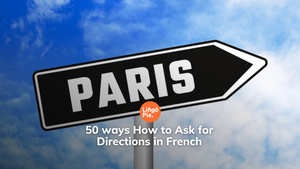
50 ways How to Ask for Directions in French

18 French Pick Up Lines Every Learner Should Know
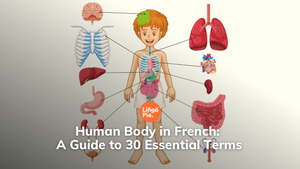
Human Body in French: A Guide to 30 Essential Terms

French Animal Sounds: A Fun Way to Learn French
Get the secret guide to language learning with tv and music for free, browse posts by popular tags.
Learn French for travel: The best 100 phrases to know

Learn French for travel ! Our comprehensive guide covers everything from greetings and introductions to ordering food and asking for directions.
Learn French for travel
It is an excellent idea to learn the French language before traveling because it is widely spoken, especially in France and other French-speaking nations in Europe, Africa, and Canada. A few basic French phrases will enable you to interact with locals, find your way around foreign locales, and make the most of your trip.
Here are the best French phrases to know for travel:
- Bonjour (Hello)
- Comment ça va? (How are you?)
- Merci (Thank you)
- S’il vous plaît (Please)
- Excusez-moi (Excuse me)
- Je suis désolé (I’m sorry)
- Je ne comprends pas (I don’t understand)
- Parlez-vous anglais? (Do you speak English?)
- Où se trouve …? (Where is …?)
- Combien ça coûte? (How much does it cost?)
- Je voudrais … (I would like …)
- Je suis perdu (I’m lost)
- Je cherche … (I’m looking for …)
- Je m’appelle … (My name is …)
- J’ai besoin de … (I need …)
- Je viens de … (I come from …)
- Je suis en vacances (I’m on vacation)
- Je suis touriste (I’m a tourist)
- C’est où le …? (Where is the …?)
- C’est combien? (How much is it?)
- C’est combien pour …? (How much for …?)
- C’est à quelle heure? (What time is it?)
- Quel est votre adresse? (What’s your address?)
- Où est la gare? (Where is the train station?)
- Où est l’aéroport? (Where is the airport?)
- Où est la plage? (Where is the beach?)
- Où est la mairie? (Where is the town hall?)
- Où est la banque? (Where is the bank?)
- Où est le musée? (Where is the museum?)
- Où est le restaurant? (Where is the restaurant?)
- Où est le café? (Where is the café?)
- Où est le supermarché? (Where is the supermarket?)
- Où est le cinéma? (Where is the cinema?)
- Où est l’hôpital? (Where is the hospital?)
- Où est le centre-ville? (Where is the city center?)
- Où est le parc? (Where is the park?)
- Où est le marché? (Where is the market?)
- Où est le parking? (Where is the parking?)
- Où est le bureau de poste? (Where is the post office?)
- Je prends … (I’ll have …)
- Je voudrais une chambre pour … nuits (I would like a room for … nights
Why you should learn French when you travel to France?
There are several reasons why you should learn French when you travel to France:
- Improved communication : Knowing French will help you communicate with locals , understand menu items at restaurants, ask for directions, and engage in conversation with the people you meet.
- Cultural understanding : By speaking French, you will gain a deeper appreciation of French culture, history, and customs.
- Increased independence : If you know French, you will be able to navigate your way around France and feel more confident and independent during your travels.
- Better bargains : Knowing French will allow you to negotiate prices and haggle for goods in markets, making shopping more enjoyable and cost-effective.
- Enhanced travel experience : When you speak French, you are more likely to engage with locals and have authentic experiences, creating lasting memories from your travels.
Overall, learning French can greatly enhance your travel experience in France, making it more enjoyable, convenient, and culturally enriching.
Tips on how to learn French for travel
Here are some tips on how to learn French for travel:
- Start with the basics : Focus on learning essential phrases, such as greetings, numbers, and simple questions and answers.
- Use language learning resources : Take advantage of online resources, such as language learning apps, online courses, and audio programs, to improve your speaking and listening skills.
- Immerse yourself in the language : Watch French TV shows, listen to French music, and practice speaking with native speakers to improve your comprehension and pronunciation.
- Learn key travel phrases : Make a list of key phrases related to travel, such as asking for directions, ordering food, and shopping, and focus on learning those first.
- Practice, practice, practice : The more you practice speaking French, the more confident you will become. Try to find opportunities to practice speaking, such as with a language exchange partner or a tutor.
- Get a French language guidebook : Invest in a guidebook that has French phrases and grammar explanations, so you can refer to it while you travel.
- Study before you go : Use your travel time to study the French language , such as on a plane or train ride.
Remember, the key to learning French is consistency and practice, so be patient and persistent with your studies, and you will soon be able to speak the language with confidence on your travels.
Greetings in French while traveling
Here are some common greetings in French that you can use while traveling:
- Bonjour – Hello
- Salut – Hi
- Bonsoir – Good evening
- Comment ça va ? – How are you?
- Ça va bien, merci. Et vous? – I’m fine, thank you. And you?
- Enchanté(e) – Nice to meet you
- Bonne journée – Have a good day
- Bonne soirée – Have a good evening
- Bonne nuit – Good night
- Au revoir – Goodbye
Using these greetings will help you make a good impression and connect with locals during your travels in France. Keep in mind that the French are known for their politeness, so using proper greetings and farewells is an important part of communication in the country.
Introduce yourself in French
Introducing yourself in French is a great way to make a good first impression and start a conversation with locals. To introduce yourself, you can use the phrase “Je m’appelle” followed by your name.
For example: “Je m’appelle Sarah.”
Additionally, you can add information about where you are from and what you do, using the phrases “Je suis de” and “Je suis.” For example: “Je suis de Los Angeles et je suis enseignante.” (I am from Los Angeles and I am a teacher.)
To finish the introduction, you can ask the person you are speaking to about themselves, using the phrase “Et vous ?” (And you?). With these simple phrases, you can make a great introduction and start a conversation in French.
Saying “I don’t understand” in French
When traveling in a foreign country, it’s important to know how to communicate effectively, especially when it comes to expressing that you don’t understand. To say “I don’t understand” in French, you can use the phrase “Je ne comprends pas.”
This phrase is simple, clear, and easy to remember, making it an essential tool for anyone traveling in France. If you need further clarification, you can also ask the person to repeat what they said, using the phrase “Pouvez-vous répéter, s’il vous plaît?” (Can you repeat, please?).
By using these phrases, you can ensure that you can communicate effectively and get the information you need during your travels in France.
Basic questions for learning French for travel
Here are some basic questions in French that you can use while traveling:
- Comment vous appelez-vous ? – What is your name?
- D’où venez-vous ? – Where are you from?
- Qu’est-ce que vous faites dans la vie ? – What do you do for a living?
- Parlez-vous français ? – Do you speak French?
- Pouvez-vous me dire comment aller à … ? – Can you tell me how to get to …?
- Combien coûte … ? – How much does … cost?
- Avez-vous … ? – Do you have …?
- Où est … ? – Where is …?
- Pouvez-vous me recommander un bon restaurant ? – Can you recommend a good restaurant?
- Pourriez-vous me donner un peu d’aide, s’il vous plaît ? – Could you give me a little help, please?
You can effectively interact with locals and obtain the information you require when traveling in France by being aware of these fundamental questions. Always utilize proper pronunciation and grammar when speaking French, and always be courteous and respectful.
Ordering food in French
If you don’t speak French well, ordering food in that language can be a little scary. You can order meals in France with the use of the following simple inquiries and expressions:
- Je voudrais commander … – I would like to order …
- Qu’est-ce que vous recommandez ? – What do you recommend?
- Est-ce que vous avez … ? – Do you have …?
- Je prendrais … – I will have …
- Est-ce que je peux avoir … s’il vous plaît ? – Can I have … please?
- Est-ce que c’est possible de … ? – Is it possible to …?
- Est-ce que je peux avoir une carte des vins ? – Can I have a wine menu?
- Est-ce que je peux avoir l’addition, s’il vous plaît ? – Can I have the bill, please?
- C’était délicieux, merci ! – That was delicious, thank you!
With these basic phrases, you will be able to confidently order food and drinks in French while traveling in France. Remember to use proper pronunciation and grammar, and to be polite when speaking with restaurant staff.
Asking for directions in French
When traveling in France, it’s important to know how to ask for directions. Here are some basic phrases that you can use to ask for directions in French:
- Excusez-moi, où est … ? – Excuse me, where is …?
- Comment aller à … ? – How do I get to …?
- Est-ce loin d’ici ? – Is it far from here?
- Est-ce que c’est à droite ou à gauche ? – Is it to the right or to the left?
- Est-ce que vous pouvez me montrer sur la carte ? – Can you show me on the map?
- Est-ce que vous pouvez me donner des indications ? – Can you give me directions?
- Je cherche … – I am looking for …
- Pouvez-vous me dire comment y aller à pied ? – Can you tell me how to get there on foot?
- Pouvez-vous me dire comment y aller en voiture ? – Can you tell me how to get there by car?
- Merci beaucoup ! – Thank you very much!
With the help of these fundamental words, you will be able to ask for directions and move around France with ease. While requesting instructions, keep in mind to be kind and respectful, and when speaking French, remember to pronounce words correctly and use perfect grammar.
Learn French for travel now
Your journey can now begin. The vocabulary and phrases you acquired here can be used to start making travel arrangements for your planned trip to French now that you are ready to learn French for travel .
Related Posts
French: how to teach on italki.
Why a guide to teaching languages online I’m ready to reveal my small secrets as I transition from providing online instruction to managing my website.
German: Babbel vs Duolingo: differences
Numerous individuals use software and apps to learn new languages. These days, two well-known online resources for language learning include Babbel and Duolingo. They both
Languages: Babbel vs Duolingo: differences
In today’s post, we’ll talk about the differences between Babbel and Duolingo. These are unquestionably the two most well-known language learning programs out there. Let’s
Spanish for “nights”: words and examples
There are several terms and idioms in Spanish that refer to the night, each with its unique sense and function. In Spanish, the most basic
How to say no in Spanish: 15 different ways
Learn 15 different ways to say “no” in Spanish and understand their appropriate usage. Improve your communication skills and broaden your vocabulary. As we go
How to maximize your time in learning French: Tips and strategies for success
Efficiently learn French with expert tips and strategies! Discover how to maximize your time and achieve success in your language journey. Start mastering French today!
How do you say “bon appetit” in Spanish?
Savor the flavors of Spanish cuisine with the proper greeting “Buen Provecho” when dining. Say “Bon Appétit” in Spanish and impress your friends! Bon appetit
German Lifestyle vs American Lifestyle: How to Adapt to German Lifestyle
Discover the intriguing clash of German and American lifestyles and learn essential tips for seamlessly adapting to the distinctive German way of life. As our
7 Common Myths of Learning the German Language
Discover the truth behind learning German as we debunk 7 common myths. From grammar fears to accent hurdles, prepare to unravel the language’s secrets. Over
Top 20 Spanish words used in sports
Discover the top 20 Spanish words commonly used in the world of sports. Enhance your sports vocabulary and understanding with our informative blog. Introduction The
French Phrases You Need in Workplace
Mastering French phrases in the workplace is essential for effective communication. This blog explores key phrases to navigate the professional world en français. I. Introduction
Sea in French: How to say Sea in Italian
Discover the Italian translation for “sea” with our guide. Learn how to pronounce and use this common word in the beautiful Italian language. The sea
11 Must-Know German Gardening Vocabulary Words for Green Thumbs
Master the German gardening jargon with our essential guide! Explore 11 must-know vocabulary words to level up your green thumb skills. If you’re passionate about
10 Must-Know Spanish Gardening Vocabulary Words for Green Thumbs
Expand your green thumb with these 10 essential Spanish gardening vocabulary words. Master the language of plants and enhance your gardening skills. 10 Essential Spanish
12 Must-Know French Gardening Vocabulary Words for Green Thumbs
Enhance your green thumb with our blog! Discover 12 essential French gardening terms to elevate your gardening skills and knowledge. Bonjour! As the warm weather
Spanish adverbials: Mientras…
The word Mientras can be an adverb or conjunction depending on the sentence and its structure. You can use mientras to connect two actions in
Spanish imperative negative + pronouns
The Spanish structure imperativo negativo + pronombres enclíticos is a bit controversial topic since many Spanish students get confused when using it. Los pronombres enclíticos
French Restaurant Phrases for Ordering Food and Drinks with Ease
Je voudrais un verre d’eau, s’il vous plaît. (I would like a glass of water, please.) Pouvez-vous m’apporter le menu, s’il vous plaît? (Can you
Say It Like a Native Speaker: 7 French Sayings You Should Know
Sayings or proverbs have a very important role in any culture and language, and the French language is no exception. They provide people with insight
Avoid vocabulary mistakes about false cognates in french
False cognates, also known as “faux amis“, are words that are similar in French and in English but ultimately, they have completely different meanings. When
Why is it important to respect French grammatical gender?
The grammatical gender is a system of classification in the French language that assigns a gender to nouns and adjectives. This plays a very important
7 Common Myths of Learning the French Language
Unveiling the Truth: Debunking 7 Common Myths of Learning the French Language. Separate fact from fiction in your language journey! 7 Most Popular Myths about
7 Myths About Learning Spanish
Unveiling the truth behind learning Spanish! Discover and debunk the 7 common myths that may be holding you back from mastering this vibrant language. Are
Spanish Lifestyle vs American Lifestyle: How to Adapt with Spanish Lifestyle
Discover the vibrant Spanish lifestyle and learn how to seamlessly adapt to it, contrasting it with the American way of life. Join us on this
French Lifestyle vs American Lifestyle: How to Adapt to French Lifestyle
Know more about the French lifestyle vs the American lifestyle. Which do you think is better for you? Embrace culture, cuisine, and joie de vivre!
Famous French Food You Must Try
Indulge in the flavors of France with our guide to famous French food. Discover must-try dishes like escargots, coq au vin, and crème brûlée. Bon
Famous French Singers You Must Know
Discover the iconic voices that have made French music famous worldwide. Our list of famous French singers features timeless classics and modern hits. French singers
Famous Spanish Food You Must Try
Embark on a delectable journey through Spain’s culinary wonders! Discover the must-try famous Spanish dishes that will tantalize your taste buds. Spanish Food Spain is
Famous German Singers You Must Know
Get ready to immerse yourself in the enchanting world of German music as we showcase the extraordinary talents of renowned singers from Germany. From timeless
Famous Spanish Singers You Must Know
Let the music captivate your senses and ignite your passion for Spanish culture by knowing the famous Spanish singers that ever existed. Importance of Spanish
German Phrases You Need in the Workplace
Discover essential German phrases for the workplace. From greetings to professional conversations, equip yourself with the necessary language skills. German Phrases in the Workplace Learning
Spanish Phrases You Need in Workplace
Master the essential Spanish phrases for the workplace and enhance your communication skills. From greetings to professional requests, we’ve got you covered! Spanish Words in
Top Spanish Speaking Countries
Explore the vibrant cultures and diverse landscapes of the top Spanish-speaking countries in this blog. Discover their history, traditions, and more! Explanation of the importance
Top 20 German Words Used in Sports
Discover the top 20 German words commonly used in sports, from ‘Tor’ to ‘Abseits’. Enhance your sports vocabulary and impress your German-speaking friends! Introduction Explanation
Top 20 French Words Used in Sports
Discover the Top 20 French words used in sports! From “but” to “arbitre,” learn essential vocab to help you better understand the sports world in
How to Say “Food” in Spanish
“Learn the different ways to say ‘food’ in Spanish and expand your vocabulary with our comprehensive guide. Enhance your language skills today!” One of the
How to Say “Food” in French
Learn the various ways to say “food” in French with this comprehensive guide. Expand your vocabulary and impress your francophone friends! “Food” in French: La
How to Say “Food” in German
Learn how to say ‘food’ in German and impress your friends with your language skills! Check out our easy guide and enhance your vocabulary today.
Famous places in France: Where to go in France
Discover the most famous places in France with our guide to the famous places you can’t miss. Plan your trip today! France is well-known for
Top French Slang Words Used in Everyday Life
Discover the most popular French slang words and expressions that French natives use in everyday conversations. Improve your language skills and sound like a local!
Famous Places in Spain: Where to Go in Spain
Discover the most famous places in Spain and plan your next trip. From the iconic cities of Madrid and Barcelona to the stunning beaches of
Communication Skills in a Foreign Language: Achieve Fluency by Solving Tasks
Improve your communication skills in a foreign language by solving tasks. Our blog offers practical tips and strategies to achieve fluency. Start now! Mastering Communication
Top German Slang Words Used in Everyday Life
Discover the top German slang words used in everyday life with our comprehensive guide. Impress your friends and sound like a native speaker! Top German
Famous Places in Germany: Where to Go in Germany
Explore the must-visit famous places in Germany! Discover the top destinations and attractions to add to your itinerary for an unforgettable trip. Germany is a
Top German-Speaking Countries that You Must Know
Discover the top German-speaking countries to visit and explore their rich culture, stunning landscapes, and unique attractions. Start your adventure today! Over 130 million people
Top French Speaking Countries that You Must Know
Discover the top French-speaking countries around the world, their culture, traditions, and why learning French is beneficial. Start your journey today! French Speaking Countries French
How Useful German lessons on YouTube can benefit students
Discover how German lessons on YouTube can empower students with practical language skills, cultural insights, and engaging learning experiences. Boost your German fluency today! Would
How to Maximize Your Time in Learning Spanish
Unlock the secrets to mastering Spanish efficiently! Learn how to maximize your time in learning Spanish. Start your language-learning journey now! Learning a new
Language Learning for Communication: Acquisition is Best
Discover why acquiring Spanish language skills through communication is the most effective approach. Enhance your learning journey with our expert tips. The importance of Spanish
How Useful French Lessons on YouTube to Students
Discover the power of French lessons on YouTube for students! Learn language skills with engaging videos, practice exercises, and interactive lessons. Boost your learning and
Top Spanish Slang Words Used in Everyday Life
Discover the most popular Spanish slang words and phrases used in everyday life! Improve your language skills and sound like a native speaker. Learning Spanish
Communication skills in a foreign language: Achieve fluency by solving tasks
Improve your ability to communicate in a foreign language by solving tasks. This blog helps you work through problems that improve your accuracy and confidence.
Top 7 Reasons for learning French
Parlez-vous Français? Explore the top 7 reasons for learning French and unlock a world of opportunities. Start your language journey with confidence today! 7 reasons
Top 7 Reasons for Learning German
Discover the power of learning German! Unlock opportunities and expand your horizons with compelling reasons to study German. Start your linguistic journey today! Reasons for
Top 9 Reasons for learning Spanish
Is learning Spanish worth it? What are the top reasons for learning the Spanish language? Start your Spanish journey now! Reasons why learning Spanish is worth
How to learn Spanish through Podcasts
Do you want to learn Spanish through podcasts? Immerse yourself in the richness of the Spanish language with our podcast-based learning guide. Learn Spanish through
How to learn Languages through Podcasts
Unlock the power of language learning with podcasts! Explore the ultimate guide to mastering a new language through engaging podcasts. Start your linguistic journey now!
How to Maximize Your Time in Learning German
Learn German efficiently with expert tips! Discover effective techniques on how to maximize your time in learning German. Tips and strategies for efficiently learning German
How to learn French through Podcasts
Unlock the beauty of the French language with our podcast-based learning approach. Master French effortlessly with engaging lessons and practical tips! The Power of Podcasts
How to Learn German through Podcasts
Master German with ease! Explore the ultimate guide to learning German through podcasts. Gain language skills, cultural insights, and fluency. Start your German journey now!
How useful Spanish Lessons on YouTube can Benefit Students
Discover the power of Spanish lessons on YouTube for students! Boost language skills with engaging videos. Learn Spanish anytime, anywhere. ¡Vamos! Learning a new language
How hard is it to learn German?
How hard is it to learn German? Our comprehensive guide provides insights into the challenges and strategies to master the language. How hard is it
How hard is it to learn French?
Discover how difficult it is to learn French in our latest blog post, “Parlez-Vous Français?”. Gain insights and tips to improve your French skills. Parlez-vous
5 ways to say “excuse me” in Spanish and be a polite bilingual
Master the art of politeness with this blog on 5 ways to say “excuse me” in Spanish. Impress native speakers and boost your bilingual skills
Every meaning of Fare | German verbs and how to use them
Unlock the full potential of the German verb “fare” with this comprehensive guide! Learn all its meanings and how to use them in context. Check
How to Curse in French | 12 Most Popular Swear Words
You must have noticed by now that the French have a reputation for swearing a lot. If you are learning French, it’s a good idea
5 ways to say “excuse me” in French and be a polite bilingual
Learn how to say “excuse me” in five different ways in French and impress native speakers with your bilingual skills. Be polite and confident! Excuse
How to say in German
Looking to learn how to say common phrases in German? Check out this blog for tips and tricks on how to speak the language like
French Nasal Vowel /õ/ | Possible Spellings with Examples
The French language is renowned for its multiple nasal vowels, making it a challenging feat for non-native speakers to perfect. One sound that often trips
18 useful Spanish colloquial words and expressions
Spanish is a beautiful and expressive language, full of rich idiomatic expressions that can add flavor and humor to any conversation. If you’re learning Spanish,
French Preposition Dans | Usage and Meaning
Are you struggling with the usage of the French preposition “dans”? It can be confusing to determine when to use “dans” compared to other prepositions
7 ways to say “excuse me” in German and be a polite bilingual
In this blog, you’ll learn seven different ways to say “excuse me” in German, so you can be a polite bilingual and impress native speakers.
Chic Parisian Style: How to Dress when in Paris?
Excited about an upcoming trip to Paris, but not sure what to wear? Paris, the city of lights and fashion, is heaven for those who
French Nasal Vowel ɛ̃: Possible Spellings with Examples
One sound that often trips up learners is the nasal vowel ɛ̃, which is found in words like “temps” and “enfants”. In this blog post,
French Nasal Vowel ɑ̃: Possible Spellings with Examples
One sound that often trips up learners is the nasal vowel ɑ̃, which is found in words like “temps” and “champagne”. In this blog post,
What’s the meaning of “allons-y!”? A common French exclamation
Explore the meaning and cultural significance of “Allons-y!” in the French language. Discover its different uses and learn to use it correctly in conversation. What’s
Every meaning of “Fare” | Spanish verbs and how to use them
Discover the various meanings of ‘Fare’ in Spanish verbs and learn how to use them effectively. Expand your language skills with our comprehensive guide. Narrowing
Every meaning of Faire | French verbs and how to use them
Learn the various meanings of “faire” in French with this comprehensive guide. Master the verb’s usage in different contexts and improve your fluency. Meaning of
What’s the meaning of “¡vamos!”? A common Spanish exclamation
Discover the meaning and uses of “¡Vamos!” in the Spanish language. Learn about its cultural significance and how to use it correctly in conversation. What’s
Daring you to Pronounce the Most Difficult French Words
Ready to tackle some of the most notoriously difficult French words to pronounce? It’s time to flex those linguistic muscles and push your pronunciation skills
French Prepostion Chez: At someone’s place
One of the trickiest aspects of the language can be mastering French prepositions. The French preposition chez is used to indicate that someone is “at”
Enchaînement: Connecting French Sounds
As a French speaker, using enchaînement in French is key to achieving a natural and fluent French. Enchaînement is the glue that binds the sounds
How to Pronounce Luxury Brands in French?
Are you a fashion enthusiast struggling to correctly pronounce luxury brand names in French? Look no further! In this French pronunciation guide for luxury brands,
Understanding French Liaison: The Key to Fluent Speaking
Do you want to sound like a native French speaker? Then you need to master the French art of liaison. What is it? Simply put,
Silent French H: Mute and Aspirated
The silent letter h is often causing trouble to French learners. In this blog post, we’ll take a closer look at the “h” mute and
Learn How to Stress French Words Correctly
Are you ready to learn the key to speaking like a native French? Correctly stressing French words is an important aspect of speaking French accurately
What Not to Pronounce in French? Silent Letters
The most challenging aspect of learning French is spelling words with silent letters. You know you’ve nailed your French accent once you can tell which
Understanding the French Pronunciation Using IPA
Are you struggling with French pronunciation? When it comes to vowels, do you often struggle with the many nuances of French? What if I told
Diphtongs in French: Pronunciation and Spelling
Are you looking to improve your French pronunciation? To help you learn French diphthongs, we’ll discuss their pronunciation, spelling, and examples in this blog post.
Nasal Vowels in French: Pronunciation and Spelling
Are you struggling with the pronunciation of French nasal vowels? From the different spelling patterns to the complex sounds they produce, understanding nasal vowels can
French Vowels for Beginners: Everything You Need to Know
Vowels in French are notoriously difficult for English speakers because they differ greatly from those in other languages. This guide will teach you everything you
Faire la Bise: All about French Kiss
If you’re wondering how to greet in French, either through handshakes or kisses, you are at the right place. Today, you’ll learn how to navigate
Speaking practice: talk to yourself
Improve your speaking skills with these simple tips on how to practice speaking by talking to yourself. Start speaking confidently today! Read more here. Speaking
Spaced repetition for the German language
Master German faster with spaced repetition! Our blog explains how this powerful technique works and offers tips to incorporate it into your learning routine. What
French Art of Subtle Communication: How to Sound Polite?
Understanding the nuances of French communication can be challenging, but it’s essential to understand that the French place politeness standards are pretty high. From the
What does TE AMO mean in Spanish?
Discover the romantic meaning behind Te Amo, the Spanish phrase for ‘I love you’. Explore its cultural significance and usage in everyday life. Te Amo
What are the 10 most spoken languages in the world?
Discover the top 10 most spoken languages in the world with our informative blog. Learn about their origins, unique features, and cultural significance. The most
What does JE T’AIME mean in French?
Discover the meaning and cultural significance of “Je t’aime,” the famous French expression for “I love you.” Explore its nuances and usage in this blog.
What does ICH LIEBE DICH mean in German?
Discover the meaning and cultural significance of ‘Ich liebe dich’ in German. Explore its nuances and usage in this insightful blog post. “Ich liebe dich”
Think Languages LLC
1309 Coffeen Ave, Suite 1200, Sheridan WY, USA, 82801
+1 917 9937880
Travel and Language Adventures

Ultimate and Printable Guide: Basic French for Travelers

Once it is safe to travel again, are you planning on visiting France? France is the most-visited country in the world , with nearly 90 million people visiting annually (in a normal year that is!). French is estimated to be spoken fluently by approximately 235 million people . That means that the French you learn for your trip will likely be useful again in the future as well!
It is a great idea to have some knowledge of basic French words and phrases in your repertoire before departing on your trip. In major cities like Paris, it may be true that many people know some English, but most still use French. The more you go out of the city there will be fewer people willing to use English, or even that know English at all. French speakers are very proud of their language, so knowing at least some of it is respectful and part of the experience of traveling to a new place.
French is a Romance language, which while it does sound romantic, actually means it is one of the languages that derive from Vulgar Latin . You may not have a community of native French speakers at your disposal to help with pronouncing new words in this romantic language. So, while talking with native speakers really is the best way to learn, online tools like Google Translate or Duolingo can help in the meantime.
Without further ‘adieu’, here are some great Basic French Words and Phrases you should know before traveling to France:
General Greetings
- Hello — Bonjour
- Thank You — Merci
- Good Morning — Bon Matin
- What time is it? — Quelle heure est-il?
- Excuse Me — Excusez-moi
- Good Evening — Bonsoir
- Goodbye — Au revoir
- Please — S’il vous plaît
- Sorry — Pardon
- My name is *name* — Je m’appelle *name*
- How are you doing? — Comment allez vous?
- Do you speak English? — Parlez vous anglais?
- Airport — Aéroport
- Train Station — Gare
- Restaurant — Restaurant
- Washroom — Toilettes
- Hotel — Hôtel
- Museum — Musée
- Metro — Métro
- Car — Voiture
- Taxi — Taxi
- Bus — Autobus
- Ticket — Billet
- Street — Rue
- Passport — Passeport
- Luggage — Bagage
Food and Drink
- Water — L’eau
- Beer — Bière
- Coffee — Café
- Bread — Pain
- Cheese — Fromage
- Breakfast — Petit déjeuner
- Lunch — Déjeuner
- Dinner — Dîner
- Food — Nourriture
- Drinks — Boissons
- Menu — Menu

The French language has ‘formal’ and ‘informal’ words that English does not have to address someone. For instance, in English, you would just ask ‘How are you doing?’, whereas in French you can ask either ‘Comment allez vous?’ (formal) or ‘Comment vas-tu?’ (informal). If you have never met someone before, make sure you use the formal ‘you’.
Also, something to remember whenever you are traveling abroad: the emergency number in a foreign country may not be the same as your own. For instance, in France, it is 112. Something important to note before traveling to a new place, just in case you need it!
With some Basic French words and phrases in your repertoire, you’re ready to enjoy your visit to Sweden!

You May Also Like

Ultimate and Printable Guide: Basic Swedish for Travelers

Ultimate and Printable Guide: Basic German for Travelers
One comment.
60 Basic French Words You Need to Know Before Travel
- Everything About
- The alphabet
- Funny phrases
- Common words
- Untranslateable Words
- Reading Hacks
- Writing Tips
- Pronunciation
- Telling time
- Learn FASTER
- More resources
By OptiLingo • 5 minute read
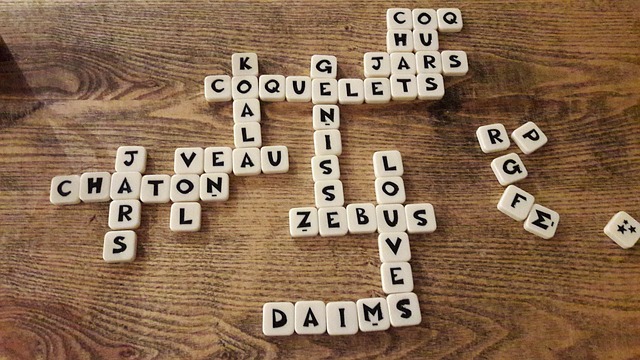
Learn Basic French Words and Phrases
French is an awesome language. If you’re traveling to France, you’ll know first hand. But, the French are really proud of their language. Before you travel, you should definitely learn the most basic French words and phrases to get by. You’ll navigate easier and receive better customer service if you speak a little bit of French. Luckily, it doesn’t take long to learn at all . Use this handy vocabulary list to learn the most common French words in less than 30 minutes, and start your journey to fluency .

Psst! Did you know we have a language learning app?
- It teaches you useful words and phrases.
- Presented in a natural, everyday context.
- Spaced out over time, so you absorb your new language organically.
- It’s kind of like learning the words to your new favorite song!
You’re only one click away!
Common French Words
Let’s dive right in with some of the most common French words and phrases.
- Bonjour : a general greeting meaning “hello” or “good morning”
- Au revoir : goodbye
- Merci : thank you
- Merci beaucoup : thank you very much
- Fille : girl
- Garçon : boy
- Femme : woman
- Homme : man
- Amour : love
- Français : French
- S’il vous plaît : please (literally, “if you please”)
- Bonsoir : good evening
- Bonne nuit : good night
- Excusez-moi : excuse me
- De rien : a casual way of saying “you’re welcome”
- Je vous en prie : a formal way to say “you’re welcome”
- Temps : time
- Monde : world
- Monsieur : mister or gentleman
- Raison : reason
- Mademoiselle : Miss, referring to an unmarried woman
- Madame : a married or older woman
- Beau : handsome
- Belle : beautiful
- Chien : dog
- Fort : strong
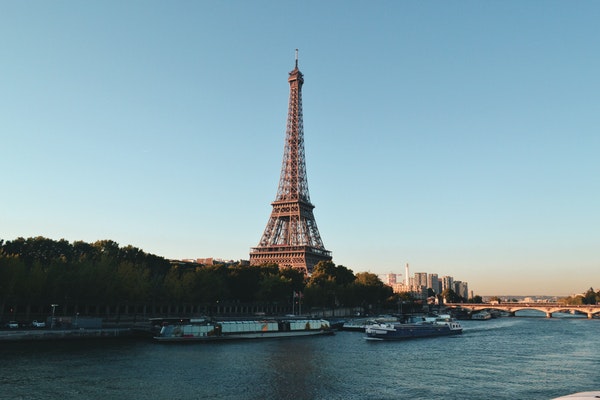
Common French Phrases
Now that we’ve looked at some common French words, let’s learn some frequent phrases. These will be helpful to know as you start forming full sentences, particularly if you plan to travel and talk with native French speakers .
- Je suis désolé(e) : I’m sorry
- Comment vous appelez-vous? : What is your name?
- Parlez-vous anglais? : Do you speak English?
- Je m’appelle : My name is
- Comment allez-vous? : How are you doing?
- Quelle heure est-il? : What time is it?
- Pouvez-vous m’aider? : Can you help me?
- Combien ça coûte? : How much is this?
- Je t’aime : I love you
- À tout à l’heure! : See you later!
Useful French Phrases for Travelers
We’ve looked at some common everyday words and phrases. Here are some specific phrases that might be useful if you need to get information in French-speaking areas.
- Je ne comprends pas : I do not understand
- Parlez lentement, s’il vous plaît : Speak slowly, please
- Répétez, s’il vous plaî t : Repeat, please
- Où sont les toilettes? : Where are the toilets?
- Où est un bon restaurant/un bon café? : Where is a good restaurant/cafe?
- Je cherche le métro/le gare/l’aéroport : I am searching for the metro/train station/airport
- Où est la plage/le centre-ville? : Where is the beach/city center?
- Je cherche l’hôtel/l’hôpital/la banque : I am searching for the hotel/hospital/bank
- Pourriez-vous me/nous prendre en photo? : Are you able to take my photo/our photo?
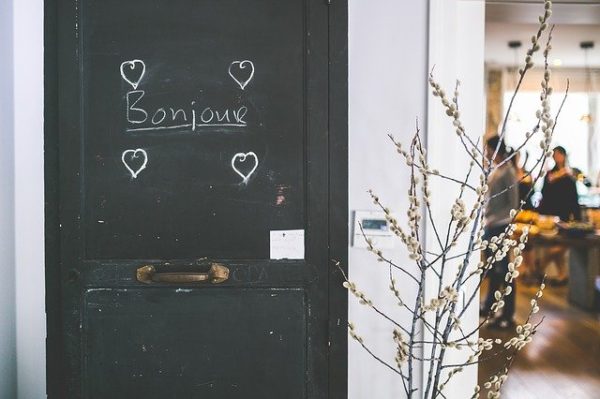
French Grammar: The Basics
Grammar is the boogeyman of language learning. Nobody likes it. But, it’s important to be familiar with the most basic rules, so you can start forming sentences in French quickly. With the useful French vocabulary you now have, you’re only steps away from fluency.
- Nouns Have Genders : In French, nouns are either feminine or masculine . These French genders affect a lot of grammatical rules. You need to conjugate adjectives and articles in French to fit the gender and number of the noun. For “the”, the French have “le” (masculine), “la” (feminine), and “les” (plural). For the English “a” and “an”, the French use “un” (masculine) and “une” (feminine).
- Verbs Conjugate Differently: In English, verbs in the present tense have only two forms. For example talk and talks. Meanwhile, in French, you have to conjugate verbs up to six different ways to fit the pronoun.
- Adjectives come after the noun: In English, the adjective is placed before the noun. But, in French, the adjective is often found after the noun. Note that this is true often, but not always. Adjectives describing beauty, age, number, goodness, and size (or BANGS) come before the noun as an exception.
Tips For Learning Common French Words
Before you begin learning the most common French words, it’s good to know how you can study the best. Use this advice to guide your experience and maximize your language learning success.
- Use your trip as motivation : Motivation and enthusiasm are crucial to language learning success. And an upcoming trip is the perfect opportunity to motivate you. Build your excitement and your fluency at the same time.
- Review often : Once you’ve read these common French words and phrases and understood their meaning, make sure you review your material multiple times before you travel. This method is called spaced repetition , and it’s the best way to remember your language lessons.
- Don’t be afraid to speak : Speaking is the only way you’ll become fluent in French. Feel free to say these common French words out lout to get comfortable with the language. By the time you arrive to France, you’ll have no problem talking with the locals.
- Learn about French culture : French culture is incredibly rich in cultures and traditions . Learn a little bit about them before your trip, so you don’t commit faux pas .
Learn More Useful French Words and Phrases
Knowing these common French phrases will be extremely handy when you go to France. But, of course, there’s a lot more to the language. Perhaps this list was just the beginning of your language learning journey. If you want to learn the most useful phrases in the French language , you should try OptiLingo.
OptiLingo gives you the most high-frequency words and phrases in French. Forget about learning unnecessary vocabulary. This fun and effective method will make French more accessible than ever. Speak like a local with minimal study time. Discover how great learning French is by trying OptiLingo today !
Related posts

Learn How to Read French Effortlessly In 8 Steps
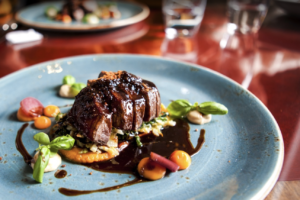
French Food Culture and Dining Experience

Top 10 Most Beautiful French Words
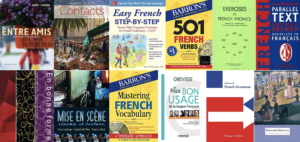
The Best Books and Textbooks to Learn French
Many people believe they aren’t capable of learning a language. we believe that if you already know one language, there’s no reason you can’t learn another..

- Write for us
- Privacy Policy
- Terms and Conditions

Learn 150+ Basic French Travel Phrases To Master For Your Next Trip To France
- Post author: Elijah Logan
- Post last modified: April 11, 2023
- Post category: French Vocabulary / Popular Reviews

If you want to explore France thoroughly, especially the city of love, you must know the basic French travel phrases.
Although English is a universal language, it is not well-known in most French-speaking countries. Thus, to get around, you need to learn how to speak basic French.
Traveling to any place where you do not speak the native can be frustrating, especially steering your way while exploring.
So, to ensure you get around different French destinations quickly, you need to learn some essential travel French phrases. Even basic French knowledge can help you interact with locals and learn about the regular lifestyle.
Keeping this in mind, today, I bring you 150+ basic French words and phrases for travel to ensure your next trip to France is unforgettable.
Table of Contents
Basic French Words For Travel In France: Learn Useful French Phrases
Traveling is not only about moving from one place to another. There are a lot of aspects connected to this journey.
While traveling to an unknown place, you are bound to meet new people, interact with strangers, ask for their assistance when lost, go dining, shop, & more.
All these activities do not seem much of a task when you are in a place where you can easily interact with others.
However, in an unknown land, all these tasks seem like dreadful things that may even prompt you to never leave your accommodation in French.
But that is not why you or anyone would fly out for miles to the country of love, France. Exploring another country is a once in a lifetime opportunity. Thus, you need to make the most out of your visit.
And to help you with this, below I have a list of over one hundred & fifty common French phrases & words categorized as per various activities you will enjoy there. So let us begin and start our learning before that trip of yours.
26 Basic Conversational French Phrases
You can never go by in a foreign land if you can not speak even the bare minimum of the native language.
You do not need to be a pro in the French language. But you should at least know the words & phrases used the most in everyday conversations by natives.
Below is a list of some essential words & expressions that you will often use during your travel time in France.
Knowing these everyday phrases will help you interact with natives in a comfortable & sophisticated manner.
- Hello / Good Morning- Bonjour !
- Good Evening- Bonsoir !
- Hi (Informal)- Salut !
- Nice To Meet You- Enchanté!
- Welcome- Bienvenue!
- Yes / No- Oui / Non .
- How Are You?-Çava?
- I’mWell.- Je vais bien.
- How’s It Going?-Ça roule?
- I Am Well, And You?-Je vais bien, et vous?
- Do You Speak English?-Parlez-vous anglais?
- I Do Not Speak French.-Je ne parle pas français.
- I Don’t Understand.- Je ne comprends pas.
- Where Are You From?-D’où venez-vous?
- I Am From …- Je suis de …
- What Is Your Name?-Quel est votre nom?
- My Name Is…- Je m’appelle …
- Mrs. / Mr. / Miss- Madame / Monsieur / Mademoiselle
- Cheers!-Santé!
- I Don’t Know- Je ne sais pas.
- Thank You Very Much.- Merci beaucoup!
- You’re Welcome- De rien!
- Excuse Me / Sorry- Excusez-moi/Pardon !
- Sorry- Je suis désolé (e).
- See You Later!- À tout à l’heure!
- Goodbye- Au revoir!
29 Basic French Travel Phrases For Directions: Beautiful French Language
Getting lost in a new city or country is a thing that most people can relate to. I remember my first trip to Paris. I was so engrossed in exploring the architectural beauty around me that I got separated from my travel group.
I freaked out and was on the verge of crying. I only knew the name of the hotel I was staying at and some French phrases I had learned.
Suggestion: 100+ Tasty Vegetables In French To Make Your Vocab More Yummy . (adsbygoogle = window.adsbygoogle || []).push({});
I asked a passerbys the directions for the hotel by saying “Quelle est la direction de l’hôtel Wallace, s’il vous plaît ?” (What is the direction of the Wallace Hotel, please?) and thus reached there safely.
Although I spent the rest of my day in my room. I was glad that at least I could find my way back. It all happened because I knew how to ask for directions in French. Knowing the essential phrases for directions can save you from the panic of getting lost.
Memorize the below-mentioned basic French phrases for directions to ensure you do not get panics like I did.
- Directions- Les directions
- North- Nord
- East- L’est
- West- L’ouest
- There- Là-Bas
- Where Is … Please?- Où est… ,s’il vous plaît?
- I’mLost.- Je suis perdu(e).
- Is It Far?- Est-ce que c’est loin?
- Is It Close?- Est-ce que c’est proche?
- Which Way?- Par où?
- It’s To The Right / Left.- C’est à droite / à gauche.
- Turn Right.- Tournez à droite.
- Turn Left.- Tournez à gauche.
- Straight Ahead.- Tout droit.
- Over There.-Là-Bas.
- Where Are We?-Où sommes-nous?
- Can You Help Me? -Pouvez-vous m’aider?
- To The Left- À gauche.
- To The Right- À droite.
- Straight Ahead- Tout droit.
- Is It Far/Close By?- C’est loin?/C’est près d’ici?
- The Exit- La sortie
- It’s To The Left- C’est à gauche.
- It’s To The Right- C’est à droite.
- It’s Straight Ahead- C’est tout droit.
27 Basic French Words & Phrases For Transportation
The French transportation system is among the best in the world. Although no country can touch Japan regarding convenient public transportation, France also offers an excellent system.
You will most likely take trains and buses to get around the country. They are an affordable means of transportation and can help you save a lot on your travel.
With a readily available transit system, you will face no problem traveling from one place to another. Transportation prices vary over distances which is not too much.
To get your way through the various modes of transportation, there are some essential words & phrases that you should learn in French.
- Transportation- Le transport
- The Bus- Le bus
- Bus Stop- L’arrêt de bus
- A Taxi- Un taxi
- Train- Le train
- Subway- Le métro
- Airplane- Un avion
- Car- Une voiture
- Ticket- Un billet
- Ticket Window- Le guichet
- Airport- L’aéroport
- Bus/ Train Station- La gare
- Early- En avance
- On Time- À l’heure
- Delayed- En retard
- Cancelled- Annulé
- Do Not Enter.-Entrée interdite.
- Exit- La sortie.
- Validate Your Ticket.-Valider votre billet.
- What Is The Schedule?- Quelle est le planning?
- What Is The Price Of A Ticket?- Quel est le prix d’un ticket?
- Where Is The Ticket Window?-Où est Le guichet?
- I Would Like To Purchase A One-Way Ticket.- Je voudrais acheter un billet aller simple.
- I Would Like To Purchase A Return Ticket.- Je voudrais acheter un billet aller-retour.
- Have A Nice Trip!- Bon voyage!
- I Would Like To Go To The Bus/Train Station- Je voudrais aller à la Gare.
5 Essential French Phrases For Clarification
There will be times during your trip to France when you might have to interact with locals. It can be for everyday greetings in French or you asking for some assistance.
Under any scenario, French people are pleased to see a foreigner speaking their language. This is why sometimes they get over-enthusiastic, making it hard for the other person to follow their complex conversations.
Similar Post: Mastering the Art of Asking ‘What’: Easy Ways to Improve Your French Vocabulary.
I once met this lady to whom I asked to click my picture. As I requested in French, she was happy, and after clicking my picture, we had a great conversation.
Although I could understand her reasons, it got hard for me as she started talking fast and using more extensive sentences.
I had to tell her to slow down so that I could understand what she was saying. She understood and was kind enough to do so.
So, if you can tell others that you are unable to understand them or ask them to repeat in their native language, French people will be more than happy to make things easier for you.
- I Don’t Understand- Je ne comprends pas.
- Could You Repeat That, Please?-Pouvez-vous répéter, s’il vous plaît?
- Speak A Little Slower, Please- Parlez plus lentement, s’il vous plaît!
- Could You Speak More Slowly Please?-Pourriez-vous parler plus Lentement?
- Could You Write That Down For Me, Please?- Pourriez-Vous L’écrire, S’il Vous Plaît?
- Speak Slowly, Please.-Parlez Lentement, S’il vous plaît.
- Repeat, Please.- Répétez, S’il vous plaît.
25 Basic French Phrases For Shopping & Money: Know The Easy Words To Use
France is the land of high-end fashion & lifestyle. You can see several beautiful boutiques nationwide that will tempt you to shop.
To ensure you can ask, bargain, and buy anything you want, you must learn the essential words & phrases related to shopping & money in French.
Knowing the standard terms will ensure you do not get scammed and overpay for something worth pennies.
- How Much Is This?- Combien Ça Coûte?
- It’s Too Big / Small.- C’est Trop Grand / Petit.
- I’m Just Looking Around, Thanks.-Je Regarde Juste Autour De Moi, Merci.
- I Would Like … Please.- Je Voudrais … S’il vous plaît.
- Good Quality!- Bonne Qualité!
- I Need …- J’ai besoin de …
- I Want …- Je veux …
- I’m Looking For …- Je cherche …
- Can I Try This On?- Je peux l’essayer?
- Is It On Sale?-C’est en solde?
- No Thanks, I’m Only Looking.-Non Merci, Je Ne Fais Que Regarder.
- No, I’m [Just] looking For the Moment.-Non, Je Regarde Pour L’instant.
- I Would Like To Pay In Cash- Je Voudrais Payer En Liquide/Espèces
- Do You Accept Foreign Cards?-Est-Ce Que Vous Acceptez Les Cartes Étrangères?
- Can I Pay With A Credit Card?-Est-Ce Que Je Peux Payer Avec Une Carte De Crédit?
- Can I Order This On The Internet?-Puis-Je Commander Cela Sur internet?
- Where Are The Shops?-OùSont Les Magasins?
- Where Is The Mall?-Où Est Le Centre Commercial?
- What Time Does It Close?-À Quelle Heure Est-Ce Que Cela Ferme?
- What Time Does It Open?-À Quelle Heure Est-Ce Que Cela Ouvre?
- I Am Searching For A Bag/A Postcard/A Book- Je Cherche Un Sac/Une Carte Postale/Un Livre.
- The Bank- La Banque
- Notes- Billet D’argent
- Coins- La Monnaie
- How Much Does It Cost?-Combien Ça Coûte?
- It’s Too Expensive!- C’est Trop Cher
- It’s A Great Deal!- C’est Bon Marché!
- How Much Do I Owe You?- Je Vous Dois Combien?
28 Basic French Phrases For Assistance/Help/Instruction
You will find yourself in need of help when in a foreign land. It can be for clicking a picture, finding a bathroom, a tourist site, a restaurant, police assistance, and more.
Under any emergency situation, you can only rely on the people around you. And for them to understand you, you need to speak their language.
Related: The Ultimate Guide to Saying Good Luck in French: Tips and Phrases You Need to Know.
It is not possible to master a new language in a matter of weeks. But you sure can learn some French phrases that can help you ask for instructions and help from others.
- Airport- L’aéroport
- Grocery Store- L’épicerie
- Coffee Shop- Le Café
- Metro Station- La Station De Métro
- Bus Station- La Gare Routière
- Park- Le Parc
- Beach- La Plage
- Can You Help Me?-Pouvez-Vous M’aider ?
- Can You Take Our Photo?-Pouvez-Vous Nous Prendre En Photo ?
- I Don’t Understand.- Je Ne Comprends Pas.
- Where Is The Bathroom/Restroom?-Où Sont Les Toilettes ?
- Where Is …?- Où Est ___ ?
- Je Cherche…- I’m Looking For…
- Where Is The Hospital/ The Pharmacy?-Où Est L’hôpital/ La Pharmacie?
- Help Me – Aidez-Moi!
- I’mLost – Je Suis Perdu.
- I’ve Lost..- J’ai Perdu …
- I’ve Lost My Wallet- J’ai Perdu Mon Porte-Monnaie.
- I Feel Sick – Je ne me sens pas bien.
- Call An Ambulance – Appelez Une Ambulance.
- Call The Police – Appelez La Police.
- I Have A Problem – J’ai Un Problème.
- I Have A Question – J’ai Une Question.
- Could You…- Pourriez-Vous …
- Are You Able To Take My Photo/Our Photo?-Pourriez-Vous me/nous Prendre en Photo?
- Is there A Good Restaurant/A Good Café near by- Y a-t-il un bon restaurant/un bon café à proximité?
- Où Est La Plage/Le Centre-Ville?(Where Is The Beach/City Center.)
- I Am Searching For the Hotel/Hospital/Bank- Je Cherche L’hôtel/L’hôpital/La Banque.
31 Basic French Words & Phrases For Dining
Food is an integral part of our lives. It is one of the best things to explore when in France. Fine dining & delicious food are the highlights of French traveling. You get to experience the elegance & taste France has to offer.
Don’t Miss To Checkout: 10 Common Ways to Say “I Don’t Know” in The French Language With Examples.
By knowing some essential dining words & phrases, you can avoid causing any blunders and easily order the things you want to relish.
- Waiter – Monsieur/Madame
- Menu- Le Menu
- Bread- Le Pain
- Cheese- Un Fromage
- Meat- La Viande
- I Would Like A Coffee.- Je Voudrais Un Café.
- I Would Like A Beer.- Je Voudrais Une bière.
- I Would Like Some Water.- Je Voudrais De L’eau.
- I Would Like A Baguette – Je Voudrais Une Baguette
- I Would Like Some Water – Je Voudrais De L’eau
- I Would Like The Bill – Je Voudrais L’addition
- Can I Have The Bill, Please?-L’addition, S’il Vous Plaît.
- A Glass Of Wine. – Un Verre De Vin.
- I Would Like…- Je Voudrais…
- I’ll Have – Je Prendrai
- Do You Have…?- Avez-Vous…?
- Appetizers- Les Entrées
- Main Courses- Les Plats principaux
- Desserts- Les Desserts
- Vegetarian Options- Options Végétariennes
- I’m Full- Je Suis Repu(e)
- This Is Delicious!-C’est Délicieux!
- A Table For 4, Please.- Une Table Pour 4, S’il Vous Plaît.
- The Menu, Please.- Le Menu, S’il Vous Plaît.
- The Wine Menu, Please.- La Carte Des Vins, S’il Vous Plaît.
- Is The Tip Included?- Est-Ce Que Le Service Est Compris?
- This Is So Good!-C’est Trop Bon!
- I Ate Well/I’m Full- J’ai Bien Mangé
- I’m Satisfied- Je Suis Répu/Repue
- What Are Today’s Specials?- Quels Sont Les Plats Du Jour ?
- I’mAllergic To…- Je Suis Allergique À …
11 Basic Phrases To Rock In The Club That You Can Easily Use
No trip to France is complete until you explore the night & party life of the country. Night clubs are trendy among the young generation. You can start with some drinks and sway your body to the upbeat music.
But to ensure you do not enter into any problems & can express yourself better, memorize some helpful French phrases below.
- Want To Go Get A Drink Tonight? – Ça Te Dit D’aller Boire Un Verre Ce Soir?
- I Want To Party! – J’ai Envie De Faire La Fête!
- Let’s Sit Over There?- On S’installe Là-Bas?
- We’ll Take The Bottle- On Va Prendre La Bouteille.
- We’re Taking Shots!- On Prend Des Shooters!
- I Would Like A Glass Of Wine – Je Voudrais Un Verre De Vin.
- Let’s Dance! – Dansons!
- I’m Spent, I’m Leaving- Je Suis Crevé/Crevée, je pars.
- Get Home Safely!- Rentrez-Bien!
- I Really Enjoyed Myself- Je Me Suis Vraiment Bien Amusé/Amusée.
20 Basic Drink Words in French: Talking About Drinks In Restaurants
Drinking is an integral part of French dining culture. As we like to have a glass of water beside our food, the French love to have an extra glass for their liquors, wine, & cocktails.
French restaurants are extravagant with their drinks. You can order anything from coffee to alcohol to enjoy your dining experience.
To order what you want, learn some most common drinks & related words in French:
- The Wine Menu, Please.- La Carte Des Vins, S’il Vous Plaît
- A Glass Of Wine- Un Verre De Vin
- Red Wine- Vin Rouge
- White Wine- Vin Blanc
- Tea- Du Thé
- A Coffee- Un Café
- A Beer- Une Bière
- Some Fruit Juice- Du Jus De Fruit
- Some Water- De L’eau
- Fizzy Drink- une Boisson Pétillante
Top FAQs About Common French Phrases In English
Are there any french slangs i should know.
YES. If you want to fit in the crowd and want locals to treat you like a fellow, you should learn some standard day phrases and slang that only locals use.
This way, you project to others that even though you are a foreigner, you are familiar with the country & its people.
Below are some French slangs or French travel phrases with pronunciation you can master for your trip:
- Hello- Salut (informal)!
- I love Paris- J’adore Paris.
- Have a nice trip- Bon voyage!
- Forget it or drop it- Laisse tomber.
- Come on or let’s go- Allez!
- That’s life- C’est la vie.
- Long live the Republic and long live France!-Vive la république et vive la France!
- French food is the best in the world- La cuisine Française est la meilleure du monde.
How to prepare well for traveling to France?
To ensure you have a great trip to the land of France, you can begin by looking for accommodations that are safe & as per your requirements.
Buy a French phrasebook for travelers. It will come in handy. You sure can learn different basic expressions, but a book can help you whenever you feel stuck.
Also, research the local customs & lifestyle to blend in easily without getting shocked in front of the locals.
Lastly, plan all the activities & site-seeing beforehand to ensure you do not waste any time & extra money.
What are the best places to visit in France?
France is the ultimate vacation destination. This land of romance has wonderful places & activities for you to explore.
Some of the most popular destinations that you cannot miss in France are:
- The Eiffel Tower- La tour Eiffel
- Bordeaux- Bordeaux
- Louvre Museum- Le Musée du Louvre
- Notre-Dame De Paris Cathedral- La Cathédrale Notre-Dame De Paris
- Saint-Tropex Beach- La plage de Saint-Tropez
What are the basic greetings that every tourist should know in France?
If you want to go by with ease while exploring France and its beautiful cities, you need to learn some expressions, especially for greetings.
You will be able to make a good impression on others and get their attention with the least effort.
- Bonjour! – Hello/Good day!
- Salut! – Hi/Bye!
- Bonsoir! – Good evening!
- Au revoir! – Goodbye!
- Coucou! – Hey there!
- Allô? ( – Hello?
- À plus! – See you later!
- À tout à l’heure! – See you soon/See you in a while!
There are several other phrases than saying good morning in French, but if you are not eager to dive in deeper, these few are more than enough.
What is the greeting etiquette of French people?
Like any other country, when you meet people in France, you have to shake hands with everyone present, whether arriving or leaving.
If you are among close friends, family & relatives, the most common greeting is a kiss on both cheeks, also known as “la bise.”
The ‘la bise’ is not actually kissing other people. People simply place one’s cheek against the other’s, make a kissing noise, and then repeat it on the opposite side.
If you see two people greeting each other in a ‘la bise’ way, you can quickly tell they are close.
By learning over 150+ basic French travel phrases, you can ensure you have an unforgettable travel experience in France.
Learning the language can help you with easy exploration, dining, sightseeing, interacting with natives, shopping & more.
The more familiar you are with everyday words, phrases, & slang, the less likely you are to get scammed in the country of love.
You Might Also Like

Colors In French: A Fun And Easy Learning Guide For Students

20 French Expressions To Express Happiness

7 Best Ways To Improve Your French Listening Skills in 2023 Like a Pro
Leave a reply cancel reply.
Save my name, email, and website in this browser for the next time I comment.
This site uses Akismet to reduce spam. Learn how your comment data is processed .
Which Language Do You Want to Learn?
- Inside Babbel
- Babbel Bytes
ARTICLES ABOUT
How to start speaking french before your vacation.

Illustration by Aura Lewis , courtesy of the Bright Agency.
You’ve bought your plane tickets, done your hours of research, and planned your itinerary. You’re just about ready to go, but there’s one thing missing: You don’t speak French. Whether you’re heading off to Paris for some art and culture, Brittany for a breath of fresh Atlantic air, or Bordeaux for the wine tour you’ve always dreamed of, you’ll enjoy it even more if you have a bit of the language under your belt. But where should you begin? Luckily for you, here at Babbel, we have tons of courses to teach you everything you’ll need for your trip.
Learning some French for your vacation will make it easier for you to get around, to order exactly what you want to eat or drink in a restaurant or café, and to really experience the culture by making connections with the local people. Here’s a little timeline we put together to get you speaking confidently in just two weeks!
Days 1-3: Get Started With The Basics!
There are some pretty standard things everyone should know how to say in the local language when they travel to a foreign country. Here are just a few:
- How are you?
- Good morning / afternoon / evening
- I don’t understand
- How much is _______?
To master these things in French, we suggest you start with our French beginner’s courses. They teach topics that range from introducing yourself and asking simple questions, all the way to booking a hotel and finding your way around a busy Parisian train station! You’ll also find a number of lessons focused on pronunciation, so you won’t have to worry about being misunderstood when you speak.
Depending on what you plan to do during your stay, some courses might be more valuable to you than others. Really think about what you plan to do on your trip, and try to come up with a list of situations you can imagine yourself in. We recommend taking a look at the courses on our web version so that you can see exactly what each lesson contains. This way you can pick and choose which lessons will be the best for you.
Here’s an additional lesson we think is a must-do:
Finish that one, and you’ll have the vocabulary and phrases you need to be the most polite tourist ever!
Days 4-6: Practice Ordering A Meal!
Ratatouille, bœuf bourguignon, crêpes, quiche … the list goes on! France is a veritable wonderland of food and flavor, and you’ll most likely be spending a fair amount of time in restaurants and cafés. That being said, you should plan to brush up on some useful words and phrases for ordering a meal. As menus are often only in French, it’s a good idea to learn as much food vocabulary as you can! After all, you want to make sure you know exactly what you’re ordering.
For example, let’s say you’re craving a nice Surf and Turf with scallops and a juicy steak, so you order the escalope and filet mignon. You will be understandably disappointed when you end up with a veal cutlet and a pork tenderloin. But don’t worry, we can help you avoid embarrassing situations like this. Under the “Countries and Traditions” category, you’ll find our “French Cuisine” section, which gives you a rundown of the culinary specialties from the different regions of France. After doing these courses, you won’t be surprised at what you find on your plate when you order les cuisses de grenouille!
We also have a couple of other courses about food, drink, and ordering. Here are two you should try before you jet off:
These two lessons will introduce the phrases you’ll need in order to understand the menu, order food, and ask for the bill. The satisfaction of getting through an entire meal in a restaurant en français will make the time you spend practicing absolutely worth it!
Bon appétit!
Days 7-10: Learn To Ask For Directions And Use Public Transportation
Getting lost in a place where you speak the language is bad enough. Now imagine being lost somewhere where you can’t communicate with anyone! Knowing how to ask for help will definitely lower your stress levels if you get turned around.
Now, you should have made it through some of the beginner’s courses, but just in case you missed some of them, here’s a little tip. In Beginner’s Course 2, you’ll find a unit called “Pardon, où est … ?” . These lessons will teach you all you need to know to bravely go where no tourist has gone before! You’ll not only be able to ask for and understand directions but also learn some vocabulary for common locations in a city. Make a list of the places you’d like to visit so you can learn the words for these things as well.
If you still feel like you want a little more practice, then check out these lessons too:
These will help you perfect the skills you learned from the beginner’s course, and also give you more specific information about using public transportation, which can be a confusing affair. It’s also a good idea to learn a bit about French signs and street names. After completing these lessons, you’ll truly be a well-prepared voyageur!
Days 11-14: Put It All Together (And Have Some Fun!)
With just a few days left before you leave, you’ll want to review everything you’ve learned so far so that it’s fresh in your mind and ready to be used! This is where the Babbel Review Manager will come in handy. All of the core vocabulary and phrases you’ve picked up over the last two weeks have been stored there so you can easily go back over them and practice.
If you’re feeling confident with the basics, then now it’s time to have a little fun! We have a huge selection of courses with interesting cultural and linguistic content that you can find under the categories “Countries and Traditions” and “Specials.” With these lessons, you can get your French slang up to snuff ( cimer! ), find some ideas for sightseeing, learn a bit about true and false friends, and also pick up a few idioms to really impress the locals. We promise it won’t all be pour des prunes!
After these two weeks, you should be more than ready to communicate effectively during your vacation. Our final tip for you is, of course, to have fun!
Bon Voyage!
Free French Travel Phrasebook

Table of contents
Get your free french phrasebook sent right to your inbox, what’s inside your free french travel guide, 🙋♀️ the basics, 🏠 accommodation, 🚃 transportation, 🛍 shopping, 🏀 hobbies/fun, 🥂 socializing, 🗣 conversation aids, 🌤 time and weather, 💻 telecommunications, 🚨 emergencies, download our free english-to-french phrasebook, take your french a step further.
To get your free French phrasebook PDF and start learning essential French vocabulary for travel and other common scenarios, please enter your info below and be sure to click “I want my free kit.” (Why a kit? Our French conversation guide is just one of the resources in the free MosaLingua Language Learning Kit, a complete set of goodies for independent learners. You’ll love the rest of the resources in the kit, too, and it’s all free of charge! 😉):
This eBook contains 45 pages and 10 00+ words and phrases in French, with English translations of course. It is organized by travel – related themes and ordered according to frequency of use (from the most commonly used vocabulary to more specialized terms).
If you’re planning a trip to France or Canada, or if you simply want to improve your conversational French, you’ll want to have this French phrasebook by your side!
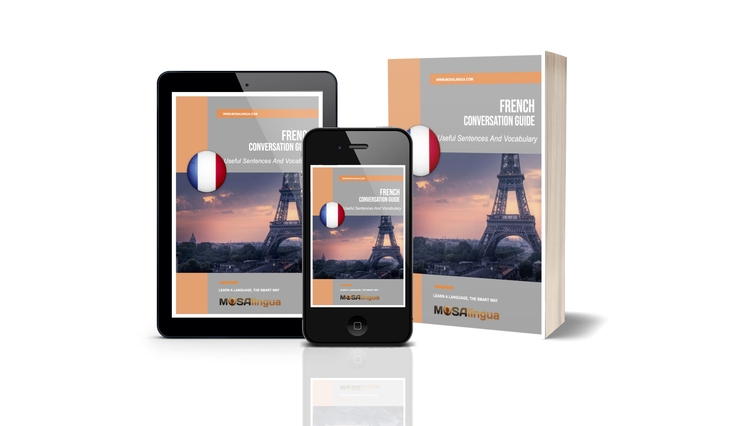
Topics in Your French Travel Guide
To give you an idea of the themes covered in our phrasebook, here are some of the topics you’ll be able to talk about with the help of this French travel guide :
- Polite phrases
- The essentials
- Starting a conversation
- Eating out, going to restaurants
- Meat and fish
- At a hostel
- Household chores
- Daily life at home
- Asking for things
- Going camping
- Public transportation
- Asking for directions
- The cardinal points
- Traveling by car
- At the airport
- Buying and negotiating
- Buying food
- Going shopping
- Arts and crafts
- Banking and dealing with money
- Outdoor activities
- Cultural and religious differences
- At the beach
- Meeting new people
- Going out, nightlife
- Feelings and opinions
- Common mistakes and difficulties
- Expressing agreement and disagreement
- Ending a conversation
- Talking about your love life
- Personality traits
- The human body
- Physical appearance
- At the barbershop or hair salon
- Occupations
- Talking about the future
- Temporal phrases
- Making phone calls
- Electronic devices
- Road accidents
- Important signs
All of the French content above and more is available to you for free! To download your phrasebook, just click the “I want my free kit” button below. Then, keep an eye on your inbox for your free French Travel Phrasebook PDF (we promise not to send you any spam, you have our word!):
If you want to learn more about the French language, its vocabulary, grammar, culture, and more, have a look around our blog . If you’re not sure where to start, here are a few popular articles and guides our readers love:
- Tips and tools to learn French, fast
- To find tools to help you with other important skills, check out our guide to the best online French resources
- And for much, much more vocabulary, and a scientifically proven method for learning it, download the MosaLingua Learn French app .
Happy learning and hope to see you again soon!
Olympic glossary: 100 French words and phrases to make you sound like a local during the Olympic Games
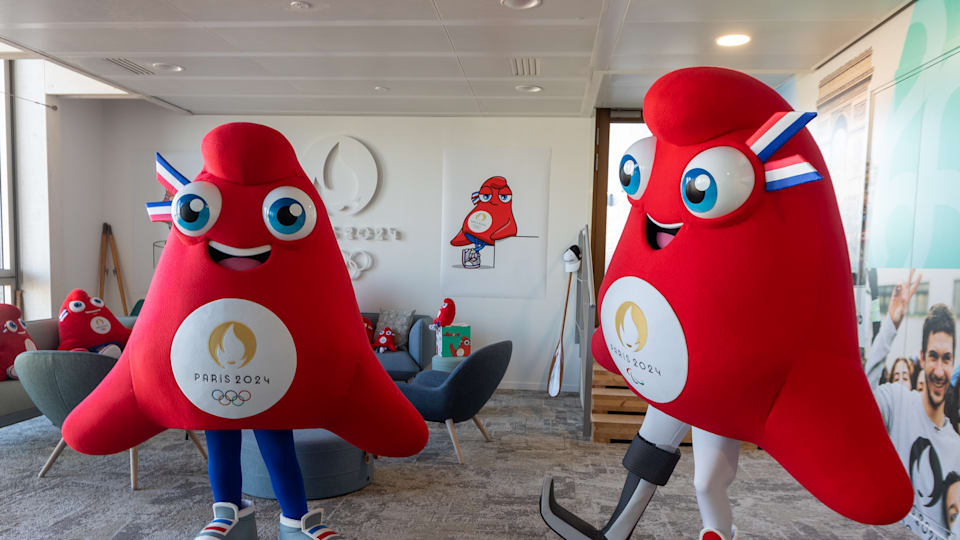
So you’re heading to Paris for the Olympic Games. Your suitcase is packed, your flag is hanging around your shoulders and you’re ready for the sporting event of a lifetime... but there’s just one problem: you don’t speak a word of French.
If this sounds like you, there’s no need to worry. Olympics.com has you covered with 100 French words and phrases that will make you sound like a local during your trip to the Olympic Games Paris 2024 .
Disclaimer: some of these phrases may have no literal translation in English. But as the saying goes, when in Paris...
Typical French expressions related to sports
- Volleyball: Quéquette , when a spiker looks as if they are about to spike the ball but instead lobs it softly over the net
- Volleyball: Envoyer une pizza (literal translation: to send a pizza), when a volleyball player hits the ball in a straight line that seems as flat as a pizza
- Tennis: Baduf, for “bas du filet” (literal translation: bottom of the net), when a player hits a bad shot that ends up right at the bottom of the net
- Tennis: Prendre deux bulles/Prendre deux roues de vélo (literal translation: to receive two bubbles/to receive two bike wheels), when a player loses 6-0, 6-0, with each zero symbolised by a bubble
- Basketball: Mettre une bâche (literal translation: to lay down a tarpaulin), a counter, when a player stops a certain basket by hitting the ball away from the net
- Swimming: Longueur d’avance (literal translation: a length ahead), when one swimmer is a body’s length in front of another in a race
- Swimming: Prendre un bambou (literal translation: to take a bamboo stick), to go out super fast in a race and leave yourself with no energy for the finish
- Football: Avoir les pieds carrés (literal translation: to have a square foot), when a player shoots the ball so badly it is as if their foot is square
- Football: Coup du chapeau , hat-trick, when a player scores three goals in a row
- Football: Claquette (literal translation: clap), when the goalkeeper slaps the ball over their own net with one hand to stop a goal.
- Football: Coup du foulard (literal translation: the scarf trick), a rabona
- Handball: Roucoulette , a trick that consists of a player twisting their wrist to change the direction of a shot when it bounces in front of the goal
- Handball: Pastis (from the name of the alcoholic beverage), when a goalkeeper catches a shot with two hands instead of parrying it away
- Handball: Kung-fu , similar to an alley-oop in basketball, when one player throws the ball into the air and a teammate catches it while also in the air and shoots it straight towards the goal. Also known in English as 'flying handball goals'
- Cycling: Avoir la fringale (literal translation: to have the 'hungry horse disease'), when a rider is suddenly spent of all energy, usually because of a lack of sugar
- Cycling: Sucer la roue (literal translation: to suck the wheel), staying on the wheel of another rider so they take the brunt of the headwind
- Cycling: Se mettre en danseuse (literal translation: to become like a dancer), when a rider stands on their bike and pedals hard, swaying like a dancer
- Cycling: Être en chasse-patate (literal translation: to hunt a potato) when a rider is between the leading pack and the peloton and eventually falls behind the peloton
- Judo: Mettre une boîte (literal translation: to put a box), when a judoka is thrown and hits the ground hard
- Rugby: Prendre un caramel (literal translation: to receive a caramel) or Mettre un tampon (literal translation: to put a stamp on something), when a player is tackled and hits the ground hard
- Rugby: une chistera (literal translation: a tool used to throw the ball in the sport of basque pelota), when a rugby player performs a behind-the-back pass
- Rugby: Faire les bordures / Prendre le périf’ (literal translation: to take the flanks/to take the ring road), when a rugby player takes a detour to avoid defenders, often running down the flanks instead of through the middle of the pitch
- Athletics: Se faire coiffer sur la ligne (literal translation: to get your hair cut on the line), when an athlete is winning a race but is caught and overtaken on the finish line
- All sports: Mouiller le maillot (literal translation: to wet your jersey), when a player or athlete has given everything they can
- All sports: Jouer avec le frein à main (literal translation: to play with the handbrakes on), when an athlete or team is not competing to the best of their ability
- All sports: Prendre une valise (literal translation: to take a suitcase), when you or your team lose heavily
Olympic sports at Paris 2024
- Archery : Tir à l'arc
- Artistic gymnastic : Gymnastique artistique
- Artistic swimming : Natation artistique
- Athletics : Athlétisme
- Badminton : Badminton
- Basketball : Basketball (also called "basket")
- Basketball 3x3 : Basketball 3x3 (also called "basket 3x3)
- Beach volleyball: Volleyball de plage (also called “beach volley”)
- Boxing : Boxe
- Breaking : Breaking
- Canoe slalom : Canoë slalom
- Canoe sprint : Canoë sprint
- Cycling BMX Freestyle : Cyclisme BMX Freestyle
- Cycling BMX Racing : Cyclisme BMX Racing
- Cycling Mountain Bike : Cyclisme VTT
- Cycling road : Cyclisme sur route
- Cycling track : Cyclisme sur piste
- Diving: Plongeon
- Equestrian : Sports équestres (also called "équitation")
- Fencing: Escrime
- Football : Football (also called "foot")
- Golf : Golf
- Handball : Handball (also called "hand")
- Hockey : Hockey
- Judo : Judo
- Marathon swimming : Natation marathon (also called "natation en eau libre")
- Modern pentathlon : Pentathlon moderne
- Rythmic gymnastics : Gymnastique rythmique
- Rowing : Aviron
- Rugby sevens : Rugby à 7
- Sailing: Voile
- Shooting: Tir sportif
- Skateboarding : Skateboard (also called "skate")
- Sport climbing: Escalade sportive
- Surfing : Surf
- Swimming : Natation
- Table tennis : Tennis de table
- Taekwondo : Taekwondo
- Tennis : Tennis
- Trampoline : Trampoline
- Triathlon : Triathlon
- Volleyball : Volleyball (also called "volley")
- Water polo : Water-polo
- Weightlifting : Haltérophilie
- Wrestling : Lutte
About the Olympics
- Olympic Torch Relay : Relais de la flamme olympique
- Olympic cauldron : La vasque olympique
- Flagbearer : Porte-drapeau
- Opening Ceremony : Cérémonie d’ouverture
- Closing Ceremony : Cérémonie de clôture
- Gold, silver, bronze medal : Médaille d’or, d’argent et de bronze
- Olympic record : Record olympique
- World record : Record du monde
All the basics (and a little bit more)
- Hello : Bonjour
- Goodbye : Au revoir
- See you later : À bientôt/À plus
- Thank you : Merci
- You're welcome : De rien
- Please : S'il vous plaît
- How do I get to the entrance/exit? : Où est l’entrée/la sortie ?
- How do I get to my seat? : Comment puis-je trouver ma place ?
- What's the quickest way to get to the Stade de France? : Quel est le meilleur moyen de rejoindre le Stade de France ?
- Wheelchair access : Accès pour les chaises roulantes
- Where can I find the food stand? : Où puis-je acheter à manger ?
- Where can I find the drinks stand? : Où est la buvette ?
- What’s the best bakery close to the stadium? / What’s the best French restaurant close to the stadium? : Quelle est la meilleure boulangerie aux environs du stade / Quel est le meilleur restaurant français aux environs du stade ?
- Can we swap pins? : On échange des pins ?
- Can you tell me where the toilets are? : Pouvez-vous m'indiquer les toilettes?
- Can you please call the emergency services? : Appelez les urgences s'il vous plaît!
- Can you call a doctor, please? : Appelez un docteur s'il vous plaît !
- Can I have a beer, please? : Une bière s'ils vous plait !
- Can I have a coffee, please? : Un café s'il vous plait !
- Can I get another round, please? : La même s'il vous plait !
- Where is XXX street? : Où est la rue XXX ?
- Can you tell me where the nearest metro station is? : Où est la station de metro la plus proche?
Related content

Paris 2024 Olympic and Paralympic athletics track: Made in Italy, designed to break records, sustainable, and... purple!

Paris 2024: discover the volunteer uniforms for the Olympic Games and Paralympic Games

Yves-du-Manoir Stadium: Hockey players share their excitement about playing in the legendary Paris 2024 venue that became world-famous 100 years ago when France last hosted the Games

100 days to Paris 2024: Top things to follow on Olympics.com in the lead-up to the Olympic Games Paris 2024

Paris 2024: The Stade de France is preparing a purple-track treatment for the athletes
You may like.

IMAGES
VIDEO
COMMENTS
Discover the key to unlocking a more immersive travel experience in France with our complete guide, featuring over 30 basic French phrases for travel. Whether it's greeting locals, navigating your way through picturesque streets, ordering culinary delights, or shopping for unique souvenirs. Perfect for first-time visitors or seasoned travelers ...
Use this phrase to explain to your new friends where you're staying, as well as how long you're staying. Je vous présente… (lit. "I present you…") This is another way of saying "This is [my]…" when you want to introduce two people to each other. Enchanté/Enchantée. (Pleased to meet you.)
Greetings and general phrases. There is quite a lot of different French greetings but the most basic is the Bonjour. If there is only one word to remember on your trip, this is the one. French phrases. English translation. Bonjour. Good day, Hello. Salut. Hi, hello, goodbye.
ap-leh lah po-lees. Fire! Au Feu! au fur. **There are a few places that use unique words for the numbers 70 ( septante) and 90 ( nonante ), such as Belgium and Switzerland. With the numbers 80 to 89, combine the number 4, the number 20, and the ones. For example, in French 80 is four 20s, 81 is four 20s plus 1, and so forth.
Common French Sayings and French Slang. Hello: Salut (informal) I love Paris: J'adore Paris. Have a nice trip: Bon voyage. Forget it or drop it: Laisse tomber. Come on or let's go: Allez. That's ...
Merci beaucoup - "Thanks a lot". And of course, don't forget to say thank you! The French word for "thank you" is merci. Or you can make it stronger by saying merci beaucoup - "thanks very much". Use merci in all the same situations you'd say "thank you" in English.
Bonjour: Good morning/ Hello. Do not forget to say bonjour as you enter a shop or start a conversation with someone! Salut: Hello (casual way of saying hello) Bonsoir: Good evening. Monsieur/ Madame/ mademoiselle: Mister/ Madam/ Miss. S'il vous plaît: Please. Merci/ Merci beaucoup: Thank you/ Thank you very much.
Bonjour - Hello. The phrase bonjour is the most common and widely used greeting in French. It sets a positive tone for your conversation. You can use this greeting all day. Bonsoir - Good evening. Bonne soirée - Have a good evening. Bonsoir is used in the evenings, from around 6 pm onward as a greeting.
1. Survival Basics: Simple French Travel Phrases. In this chapter, I gathered a list of basic French travel phrases and words that can prove useful in most encounters in France. These French phrases for travel are just what you need to get started on your journey here.
French Travel Phrases French Greetings. If you are going to France it is very important to learn the basic greetings. While you might not speak French fluently just yet, the French people will really appreciate your trying to make an effort. Bonjour Hello, good morning, good day; Au revoir Goodbye; Salut Hi/bye (informal) Merci! Thank you ...
GO read my basic French words and phrases for travel. Basic French words and phrases with pronunciation for your France trip . Even the most talkative and friendly traveler can be silenced when one's lexicon in the local language is nonexistent. Don't let that be you and learn my basic French words and phrases before you go!
In France, politeness is not just a gesture—it's a way of life. By understanding and using basic French phrases for travel, such as "S'il vous plaît" and "Merci," you can navigate social interactions with grace. Embrace the cultural nuances of courtesy that enrich every conversation. French Phrase. English Translation. Merci.
These basic words and phrases are the first level of interactions while traveling, and probably the words you will use the most in everyday conversations. So pay special attention to them! English. French. Pronunciation. Hello / good morning. Bonjour. Play.
Final Thoughts on 70+ Basic French Words and Phrases for Travel. We hope these basic French words and phrases for travel help you do more than just introduce yourself, ask the time or say hello in French (although the basics are a great place to start.) Having a little bit of French language on your side while you are traveling in France (or ...
The process of learning French is made easier when you have the right learning tools in your tool kit. The more learning resources you use, the faster you will progress. Remember to focus on all four language skills: reading, writing, listening and speaking. If you want to master the French language, all of these skills are essential.
Learn French for travel. It is an excellent idea to learn the French language before traveling because it is widely spoken, especially in France and other French-speaking nations in Europe, Africa, and Canada. A few basic French phrases will enable you to interact with locals, find your way around foreign locales, and make the most of your trip.
The French language has 'formal' and 'informal' words that English does not have to address someone. For instance, in English, you would just ask 'How are you doing?', whereas in French you can ask either 'Comment allez vous?' (formal) or 'Comment vas-tu?' (informal). If you have never met someone before, make sure you use ...
Common French Words. Let's dive right in with some of the most common French words and phrases. Bonjour: a general greeting meaning "hello" or "good morning". Au revoir: goodbye. Oui: yes. Non: no. Merci: thank you. Merci beaucoup: thank you very much. Fille: girl.
29 Basic French Travel Phrases For Directions: Beautiful French Language. Getting lost in a new city or country is a thing that most people can relate to. I remember my first trip to Paris. I was so engrossed in exploring the architectural beauty around me that I got separated from my travel group.
Days 4-6: Practice Ordering A Meal! Ratatouille, bœuf bourguignon, crêpes, quiche … the list goes on! France is a veritable wonderland of food and flavor, and you'll most likely be spending a fair amount of time in restaurants and cafés. That being said, you should plan to brush up on some useful words and phrases for ordering a meal.
This is your ultimate compilation to learn how to travel in France! And if you want to study more, click here https://goo.gl/MexUPk and get the best resour...
This eBook contains 45 pages and 1000+ words and phrases in French, with English translations of course. It is organized by travel - related themes and ordered according to frequency of use (from the most commonly used vocabulary to more specialized terms). If you're planning a trip to France or Canada, or if you simply want to improve your ...
Traveling to France or a French-speaking country? Learn these Top 10 French phrases for travellers so you can greet people, order food and travel with confid...
Typical French expressions related to sports. Volleyball: Quéquette, when a spiker looks as if they are about to spike the ball but instead lobs it softly over the net; Volleyball: Envoyer une pizza (literal translation: to send a pizza), when a volleyball player hits the ball in a straight line that seems as flat as a pizza; Tennis: Baduf, for "bas du filet" (literal translation: bottom ...